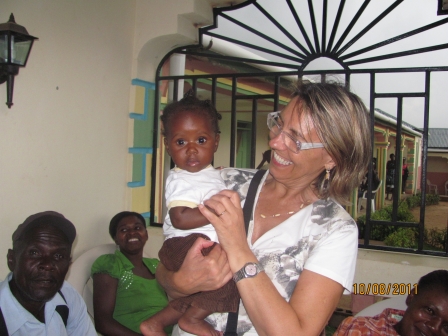
Jan 24, 2017 | Non categorizzato
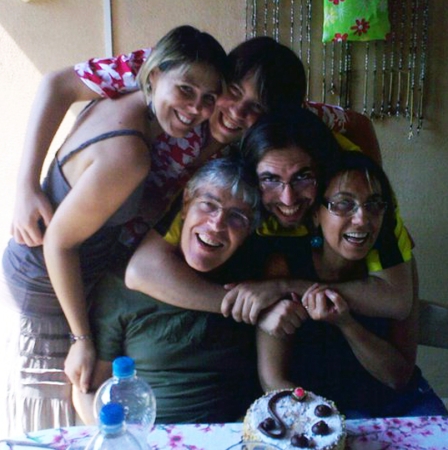 Fiorella: “Right from the start I found that Andrea was an atheist and very popular with the girls. I decided in my heart that it was better to let him go. But then in the disco I always found myself in his arms.” Andrea: “Fiorella was really one of the many. Before telling her – to my own great surprise – that I might actually love her, two years went by.” Fiorella: “I was aware that the relationship wasn’t going anywhere. There wasn’t dialogue and we didn’t make any plans. I had become Andrea’s shadow, without personanlity or dreams. Disappointed I decided to leave him. To evade him, I changed jobs and moved to another city, but I soon began to feel alone and full of sadness. One morning, nearly desperate, I found myself in the doorway of a small church, yelling out why to that God whom I had left for some time. When I job contract ended, I returned home to my relatives. A few days later, a friend whom I hadn’t seen in a while couldn’t wait to talk to me about God, and invited me to a several-day gathering with people who were trying to live the Gospel. As I stepped into the hall I was struck by a sign they had hung: “God is Love”. I wondered how God could love someone like me with my heavy make-up, heels size 12 and fiery red hair. But right from the first day I felt his presence, I knew that I had discovered what I was always looking for, and I ran to pour out all my miseries in the confessional with the intention of beginning to live the Gospel. After that first “Mariapolis” the Eucharist became the vital force of my life.” Andrea:”Fiorella was changed. Now she talked, but what’s worse – at least from my point of view back then – she talked about God. Trying to be tollerant, I decided not to dump her, but I was jealous of this God who was stealing her from me. I was struck by her serenity, her enjoyment of life, her renewed love for me that filled my heart. And what if she really loved me? Surprised at myself I even reached the point of asking her to marry me, even with the understanding of doing it in church. Afterwards, an accident at work left me immobile. The only diversion was visiting those families that Fiorella began to get together with. As soon as I could, I decided to visit one of them to find out the reason for this interest in me. We talked about everything, even the faith until three o’clock in the morning. I was fascinated. “These people are serious about it!” I said to myself, I want to live like them too. I want to be the first to love too.” One Saturday I found the sink filled with dishes. Fiorella was out at work. I closed the blinds so my neighbors couldn’t see me and began to wash the dishes to show her my love in a concrete way. I even tried to iron, although it took me two hours to press one shirt. And as I did all this I began to notice a certainty blossoming inside me: God exists, God is Love. With this new faith I suddenly felt the need to pray. I told Fiorella and suggested we do it together. With a bit of embarrassment and the lights turned off, each of us on our own side of the bed, that night we prayed together for the first time.”
Fiorella: “Right from the start I found that Andrea was an atheist and very popular with the girls. I decided in my heart that it was better to let him go. But then in the disco I always found myself in his arms.” Andrea: “Fiorella was really one of the many. Before telling her – to my own great surprise – that I might actually love her, two years went by.” Fiorella: “I was aware that the relationship wasn’t going anywhere. There wasn’t dialogue and we didn’t make any plans. I had become Andrea’s shadow, without personanlity or dreams. Disappointed I decided to leave him. To evade him, I changed jobs and moved to another city, but I soon began to feel alone and full of sadness. One morning, nearly desperate, I found myself in the doorway of a small church, yelling out why to that God whom I had left for some time. When I job contract ended, I returned home to my relatives. A few days later, a friend whom I hadn’t seen in a while couldn’t wait to talk to me about God, and invited me to a several-day gathering with people who were trying to live the Gospel. As I stepped into the hall I was struck by a sign they had hung: “God is Love”. I wondered how God could love someone like me with my heavy make-up, heels size 12 and fiery red hair. But right from the first day I felt his presence, I knew that I had discovered what I was always looking for, and I ran to pour out all my miseries in the confessional with the intention of beginning to live the Gospel. After that first “Mariapolis” the Eucharist became the vital force of my life.” Andrea:”Fiorella was changed. Now she talked, but what’s worse – at least from my point of view back then – she talked about God. Trying to be tollerant, I decided not to dump her, but I was jealous of this God who was stealing her from me. I was struck by her serenity, her enjoyment of life, her renewed love for me that filled my heart. And what if she really loved me? Surprised at myself I even reached the point of asking her to marry me, even with the understanding of doing it in church. Afterwards, an accident at work left me immobile. The only diversion was visiting those families that Fiorella began to get together with. As soon as I could, I decided to visit one of them to find out the reason for this interest in me. We talked about everything, even the faith until three o’clock in the morning. I was fascinated. “These people are serious about it!” I said to myself, I want to live like them too. I want to be the first to love too.” One Saturday I found the sink filled with dishes. Fiorella was out at work. I closed the blinds so my neighbors couldn’t see me and began to wash the dishes to show her my love in a concrete way. I even tried to iron, although it took me two hours to press one shirt. And as I did all this I began to notice a certainty blossoming inside me: God exists, God is Love. With this new faith I suddenly felt the need to pray. I told Fiorella and suggested we do it together. With a bit of embarrassment and the lights turned off, each of us on our own side of the bed, that night we prayed together for the first time.”  Fiorella: “After twelve years of milestones and setbacks new beginnings and many joys because of the new love that was growing between us, and with the birth of our two children, Maria Giovanna and Ivan, we received an invitation to move to Honduras to help support the nascent Focolare community. Jesus was asking our family to follow Him, giving up our house, our job, our relatives. A totally unknown world was awaiting us in Tegucigalpa with different customs, language and culture, along with the difficult life of the Honduran people who were knocking at our door each day. We entered so deeply into “making ourselves one” and being immersed in their lives in a deep experience of inculturation. The fruits of evangelization were many: vocations, marriages convalidated, families put together again, people coming back to God and the growth of brotherhood. After eight years we left behind a community that had been built piece by piece, based on concrete love that we tried to show and drew in our children into who, in the meantime, had become three. Andrea: “In fact, our on Juan Diego was born while we were in Honduras. We named him in honour of the Virgin of Guadalupe to whom we continue to entrust the so generous people that changed our life.”
Fiorella: “After twelve years of milestones and setbacks new beginnings and many joys because of the new love that was growing between us, and with the birth of our two children, Maria Giovanna and Ivan, we received an invitation to move to Honduras to help support the nascent Focolare community. Jesus was asking our family to follow Him, giving up our house, our job, our relatives. A totally unknown world was awaiting us in Tegucigalpa with different customs, language and culture, along with the difficult life of the Honduran people who were knocking at our door each day. We entered so deeply into “making ourselves one” and being immersed in their lives in a deep experience of inculturation. The fruits of evangelization were many: vocations, marriages convalidated, families put together again, people coming back to God and the growth of brotherhood. After eight years we left behind a community that had been built piece by piece, based on concrete love that we tried to show and drew in our children into who, in the meantime, had become three. Andrea: “In fact, our on Juan Diego was born while we were in Honduras. We named him in honour of the Virgin of Guadalupe to whom we continue to entrust the so generous people that changed our life.”
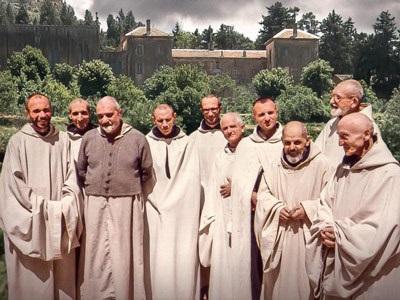
Jan 23, 2017 | Focolare Worldwide, Senza categoria
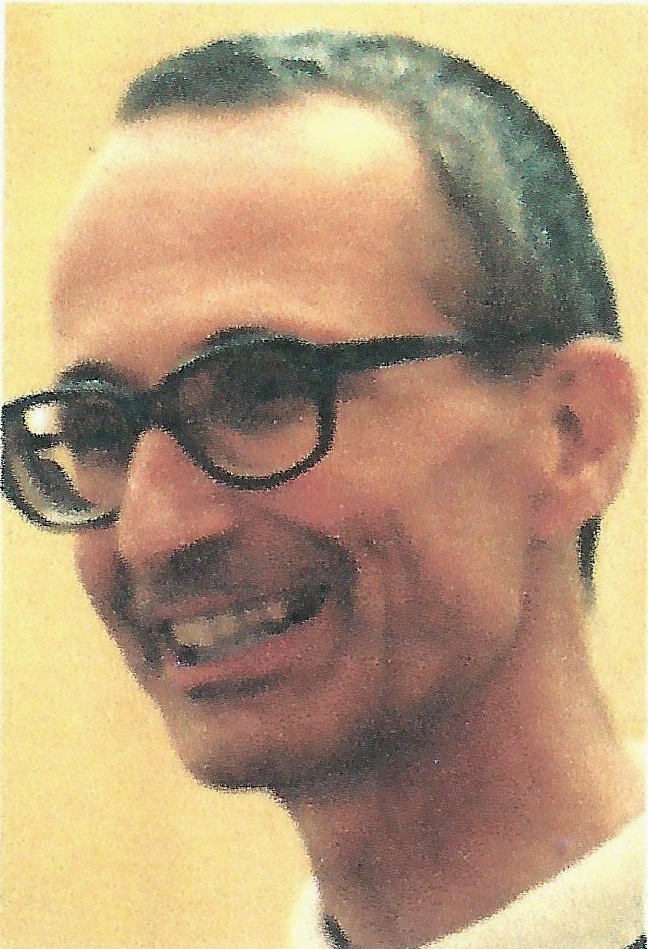 I came across a letter of Fr. Christian de Chergé a few days ago, on his 20th death anniversary. Christian was the Prior of the community of Trappist monks of the monastery of Nostra Signora dell’Atlas in Tibhirine (90 km from Algiers). In 1996, he and six other monks were kidnapped and then killed. On 1 August, Bishop Pierre Claverie, the Bishop of Orano was killed. That was really a “black decade,” as people called the civil war that exploded in the1990s. The monks were French and like the other “foreigners” were the direct targets of the “ mountain brothers,” name that referred to all those who had gone into hiding to take up their arms following the annulment of the 1992 elections. The Islamic Salvation Front, a political party that was dispersed and declared illegal, was about to win the elections. In my mind I often see their smiling faces, during those moments we lived together. We all took part in that particular vocation of the Church in that country, to which we felt we had been sent to testify to the Gospel, at the service of those people. It was a simple, poor Church, but its testimony shone in the hearts of many friends, mostly Muslims. Already then in Algiers, 99.99% of the population followed Islam. The Archbishop of Algiers, Paul Desfarges, said that, “The Church is for the people, a Church of Encounters.” But going back to the letter of 3 December 1994, it seemed to me like meeting Christian once again, or one of the monks in our focolare house in Tlemcen, where they used to spend a night, to then resume the journey towards the monastery they were about to found in Fèz, Morocco. Those were evenings of intense dialogue and joy of getting together, feeling like brothers and of sharing and understanding, in this mutual commitment toward the people that hosted us. Even if we had different callings, our hearts beat in unison.
I came across a letter of Fr. Christian de Chergé a few days ago, on his 20th death anniversary. Christian was the Prior of the community of Trappist monks of the monastery of Nostra Signora dell’Atlas in Tibhirine (90 km from Algiers). In 1996, he and six other monks were kidnapped and then killed. On 1 August, Bishop Pierre Claverie, the Bishop of Orano was killed. That was really a “black decade,” as people called the civil war that exploded in the1990s. The monks were French and like the other “foreigners” were the direct targets of the “ mountain brothers,” name that referred to all those who had gone into hiding to take up their arms following the annulment of the 1992 elections. The Islamic Salvation Front, a political party that was dispersed and declared illegal, was about to win the elections. In my mind I often see their smiling faces, during those moments we lived together. We all took part in that particular vocation of the Church in that country, to which we felt we had been sent to testify to the Gospel, at the service of those people. It was a simple, poor Church, but its testimony shone in the hearts of many friends, mostly Muslims. Already then in Algiers, 99.99% of the population followed Islam. The Archbishop of Algiers, Paul Desfarges, said that, “The Church is for the people, a Church of Encounters.” But going back to the letter of 3 December 1994, it seemed to me like meeting Christian once again, or one of the monks in our focolare house in Tlemcen, where they used to spend a night, to then resume the journey towards the monastery they were about to found in Fèz, Morocco. Those were evenings of intense dialogue and joy of getting together, feeling like brothers and of sharing and understanding, in this mutual commitment toward the people that hosted us. Even if we had different callings, our hearts beat in unison.  That atmosphere of danger surrounding us, encouraged us to go ahead. In fact, there was talk about a possible momentous departure of the members of the focolare of Tlemcen, which then did not occur. And Christian had written: «We all thought that you would stay longer to testify to a convivial offer, a boundless sharing of life, and a friendly openness that enables our hearts to vibrate in unison beyond the barriers of religious affiliations. You made the message of the Gospel your very own and you have deeply imprinted this message among us. And we rejoice with you for this greater humanity which your Charism has given to our Church. It was such a joy to meet at your “focolare” house. Many monks were able to make use of your hospitality when they passed through on their way to Fez. All of us still savour the thought of experiencing it all again! In these times we all need to be able to count on this “fire” kept alive in the common room. It will be a bit colder at Christmas if you will no longer be here… Our lives are in God’s hands… and our motives to remain, conform to those that have allowed us to live here. For you, as for us, the situation has not changed. THANKS once again to each of you and our fraternal communion today and for always. Christian». We had talked about the courage to remain… but for those who, like us had lived that harsh situation in person, I would rather speak of the courage to remain faithful to a calling and share it with a section of humanity, which we already felt an integral part of. It was a Fidelity of love. In the hearts of those who knew the monks, Bishop Claverie, or the other nuns and religious killed in those years in Algiers, they continue to speak to us of the Gospel lived and deep friendships with a people they had made their own. Giorgio Antoniazzi
That atmosphere of danger surrounding us, encouraged us to go ahead. In fact, there was talk about a possible momentous departure of the members of the focolare of Tlemcen, which then did not occur. And Christian had written: «We all thought that you would stay longer to testify to a convivial offer, a boundless sharing of life, and a friendly openness that enables our hearts to vibrate in unison beyond the barriers of religious affiliations. You made the message of the Gospel your very own and you have deeply imprinted this message among us. And we rejoice with you for this greater humanity which your Charism has given to our Church. It was such a joy to meet at your “focolare” house. Many monks were able to make use of your hospitality when they passed through on their way to Fez. All of us still savour the thought of experiencing it all again! In these times we all need to be able to count on this “fire” kept alive in the common room. It will be a bit colder at Christmas if you will no longer be here… Our lives are in God’s hands… and our motives to remain, conform to those that have allowed us to live here. For you, as for us, the situation has not changed. THANKS once again to each of you and our fraternal communion today and for always. Christian». We had talked about the courage to remain… but for those who, like us had lived that harsh situation in person, I would rather speak of the courage to remain faithful to a calling and share it with a section of humanity, which we already felt an integral part of. It was a Fidelity of love. In the hearts of those who knew the monks, Bishop Claverie, or the other nuns and religious killed in those years in Algiers, they continue to speak to us of the Gospel lived and deep friendships with a people they had made their own. Giorgio Antoniazzi

Jan 22, 2017 | Non categorizzato
 Chiara Lubich visited Germany in 1998, from 1st November to 13 December, spending time at Aachen, Münster, Augsburg and then in Berlin at the invitation of the Evangelical Church community. In her address, part of which is published below. We present several excerpts from her speech given on November 19th at the the Berlin Memorial Church, in which she indicates the law of love as the royal road to Christian unity and dialogue with all believers. “The plain fact is that if we Christians now, at the dawn of the third millennium, take a good look back at our 2000 years of history and particularly at the last millennium, we cannot fail to be saddened by what we see: a painful succession of misunderstandings, arguments and conflicts. These have caused many rips and tears in the “seamless robe of Christ”, which is His Church. And whose fault is this? Without doubt, countless historical, cultural, geo-political, social factors have played their part …. But could it also be due to a weakening among Christians of their characteristic unifying bond of love? I think so. In fact, when we try to address the painful situation we find ourselves in, we must keep in mind the guiding principle of our common faith: God Love who calls us too to love. In these our times it is God Love who, in some way, must return once more to reveal Himself also to the Churches we are part of. It’s true that we can’t really know how to love others unless we have experienced being deeply loved ourselves, unless all Christians are convinced of how much God loves us. He loves us as individual Christians and also as Church. He loves the Church in so far as it has been faithful to God’s plan for it, but also – and herein lies the wonder of God’s mercy – He loves the Church even when it has not corresponded to that plan and has allowed divisions to occur, as long as now it is seeking for full communion with the other Churches. This is the consoling conviction that led John Paul II, trusting in the One who can draw good from what is bad, to reflect: “Could it not be that the divisions have also been a way which has led and is leading the Church to discover the many treasures contained in the Gospel of Christ and in the redemption he brought about? Perhaps such a wealth would not have come to light otherwise.” So, belief in God who is Love, also for the Church. But if God loves us, we cannot remain inert in the face of such divine benevolence. As true sons and daughters, we must respond to His love with love, individually and as Church. Perhaps we can say that the Churches over the centuries may have hardened somewhat within themselves against the relentless tide of indifference, of misunderstanding, if not of actual hatred between them. So now we need a supplement of love in each one; we would need, in fact, a whole tidal wave of love to invade all Christianity. Love towards the other Churches is what we’re talking about here, together with mutual love among the Churches: a love that enables each one to be a gift for the others, so that it is possible to hope in a Church of the future which is one, in which one alone is the truth, expressed in many ways, observed from different perspectives, made even more beautiful by the variety of interpretations. It’s not that any of the Churches would have to “die” (as some may think), rather each one will have to be “reborn” in unity. And to live in this Church of the future, in full communion, will be such a wonderful, miraculous reality, that it cannot fail to be noticed by the whole world.” More Chiara Lubic Center
Chiara Lubich visited Germany in 1998, from 1st November to 13 December, spending time at Aachen, Münster, Augsburg and then in Berlin at the invitation of the Evangelical Church community. In her address, part of which is published below. We present several excerpts from her speech given on November 19th at the the Berlin Memorial Church, in which she indicates the law of love as the royal road to Christian unity and dialogue with all believers. “The plain fact is that if we Christians now, at the dawn of the third millennium, take a good look back at our 2000 years of history and particularly at the last millennium, we cannot fail to be saddened by what we see: a painful succession of misunderstandings, arguments and conflicts. These have caused many rips and tears in the “seamless robe of Christ”, which is His Church. And whose fault is this? Without doubt, countless historical, cultural, geo-political, social factors have played their part …. But could it also be due to a weakening among Christians of their characteristic unifying bond of love? I think so. In fact, when we try to address the painful situation we find ourselves in, we must keep in mind the guiding principle of our common faith: God Love who calls us too to love. In these our times it is God Love who, in some way, must return once more to reveal Himself also to the Churches we are part of. It’s true that we can’t really know how to love others unless we have experienced being deeply loved ourselves, unless all Christians are convinced of how much God loves us. He loves us as individual Christians and also as Church. He loves the Church in so far as it has been faithful to God’s plan for it, but also – and herein lies the wonder of God’s mercy – He loves the Church even when it has not corresponded to that plan and has allowed divisions to occur, as long as now it is seeking for full communion with the other Churches. This is the consoling conviction that led John Paul II, trusting in the One who can draw good from what is bad, to reflect: “Could it not be that the divisions have also been a way which has led and is leading the Church to discover the many treasures contained in the Gospel of Christ and in the redemption he brought about? Perhaps such a wealth would not have come to light otherwise.” So, belief in God who is Love, also for the Church. But if God loves us, we cannot remain inert in the face of such divine benevolence. As true sons and daughters, we must respond to His love with love, individually and as Church. Perhaps we can say that the Churches over the centuries may have hardened somewhat within themselves against the relentless tide of indifference, of misunderstanding, if not of actual hatred between them. So now we need a supplement of love in each one; we would need, in fact, a whole tidal wave of love to invade all Christianity. Love towards the other Churches is what we’re talking about here, together with mutual love among the Churches: a love that enables each one to be a gift for the others, so that it is possible to hope in a Church of the future which is one, in which one alone is the truth, expressed in many ways, observed from different perspectives, made even more beautiful by the variety of interpretations. It’s not that any of the Churches would have to “die” (as some may think), rather each one will have to be “reborn” in unity. And to live in this Church of the future, in full communion, will be such a wonderful, miraculous reality, that it cannot fail to be noticed by the whole world.” More Chiara Lubic Center
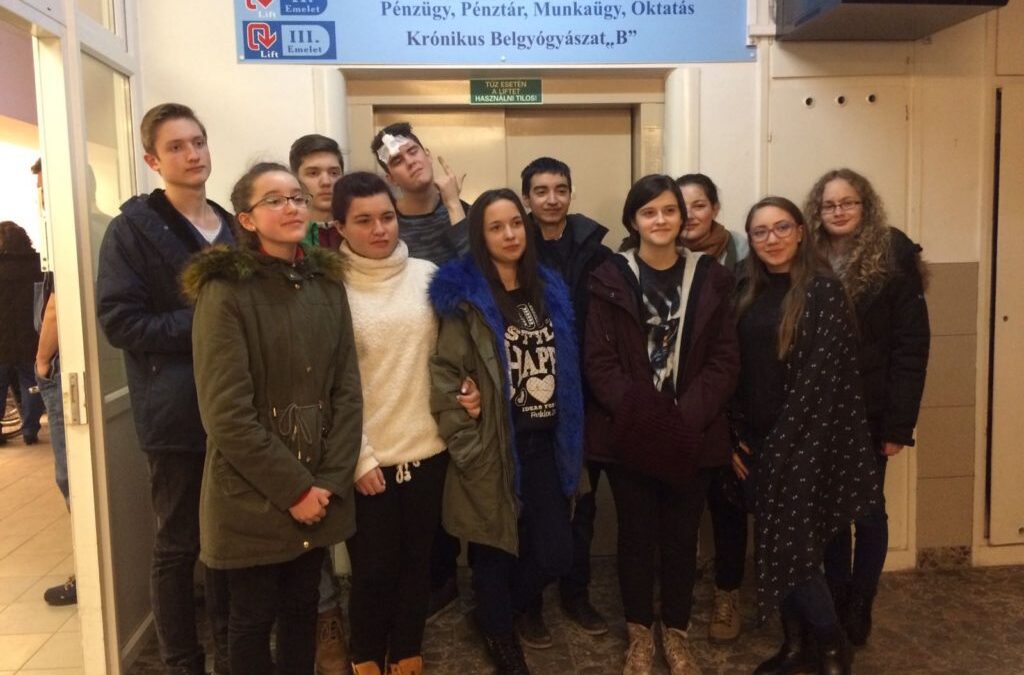
Jan 21, 2017 | Non categorizzato
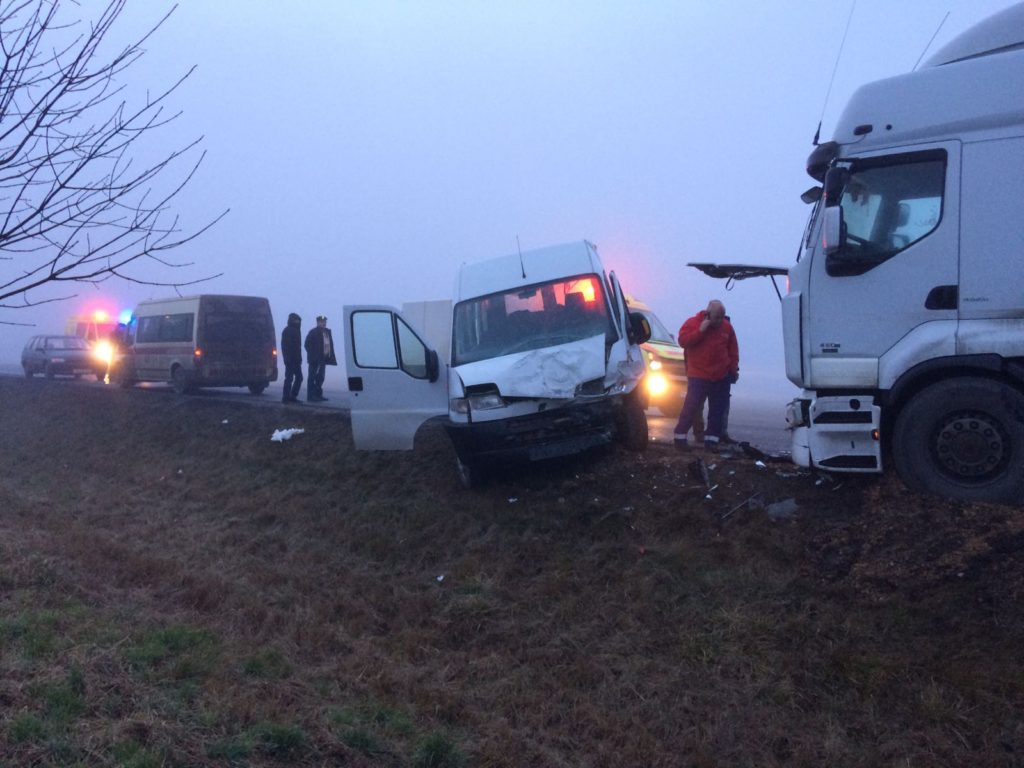 Accompanied by some of their assistants, thirteen Gen 3 were on their way to Focolare town in Krizevci, north Croatia. There was an atmosphere of serenity and great expectation during the trip. The theme of their congress would be challenging and demanding: Jesus Forsaken. The topic of suffering and pain is key to knowing how to live in a world of young people where so many seek well-being and false happiness. It was a long drive through Hungary. Towards evening some of the boys dozed off. Suddenly, the sound of horns and, in the midst of thick fog, a large truck just before the frightening crash. Teia, Adelin, Delia, Eve, Bea, Iulian and the other boys were still alive, but their shock was great. “The first car stopped just after the accident,” recounts one of the assistants. “It was an emergency vehicle. They had just finished their shift and were on their way back to the base. How could we not see God’s love in that? The police were excellent: they welcomed us in the largest room they had at police headquarters until another bus came to get us. They told us we were lucky to get out alive . . . then they brought us pizza and sweets.” Once we got to hospital, the boys were divided between wards. Bea: “At that moment we felt lost, we didn’t understand Hungarian, we were frightened and alone. We didn’t know what was happening and didn’t know how to answer the doctors’ questions. Some of us were comepletely isolated from the others, and alone like Jesus Forsaken. It was like meeting him and living him.” Eve: “Later on, people came and tranlsated for us. One focolarina from Romania was supposed to arrive in Hungary the previous day, but she had missed the bus. She was in a nearby city when she learned of the accident. The driver had proposed to the passengers not to make other stops and to take her directly to hospital to drop her off before helping us. She told us that understood why she had missed the bus the day before.”
Accompanied by some of their assistants, thirteen Gen 3 were on their way to Focolare town in Krizevci, north Croatia. There was an atmosphere of serenity and great expectation during the trip. The theme of their congress would be challenging and demanding: Jesus Forsaken. The topic of suffering and pain is key to knowing how to live in a world of young people where so many seek well-being and false happiness. It was a long drive through Hungary. Towards evening some of the boys dozed off. Suddenly, the sound of horns and, in the midst of thick fog, a large truck just before the frightening crash. Teia, Adelin, Delia, Eve, Bea, Iulian and the other boys were still alive, but their shock was great. “The first car stopped just after the accident,” recounts one of the assistants. “It was an emergency vehicle. They had just finished their shift and were on their way back to the base. How could we not see God’s love in that? The police were excellent: they welcomed us in the largest room they had at police headquarters until another bus came to get us. They told us we were lucky to get out alive . . . then they brought us pizza and sweets.” Once we got to hospital, the boys were divided between wards. Bea: “At that moment we felt lost, we didn’t understand Hungarian, we were frightened and alone. We didn’t know what was happening and didn’t know how to answer the doctors’ questions. Some of us were comepletely isolated from the others, and alone like Jesus Forsaken. It was like meeting him and living him.” Eve: “Later on, people came and tranlsated for us. One focolarina from Romania was supposed to arrive in Hungary the previous day, but she had missed the bus. She was in a nearby city when she learned of the accident. The driver had proposed to the passengers not to make other stops and to take her directly to hospital to drop her off before helping us. She told us that understood why she had missed the bus the day before.” 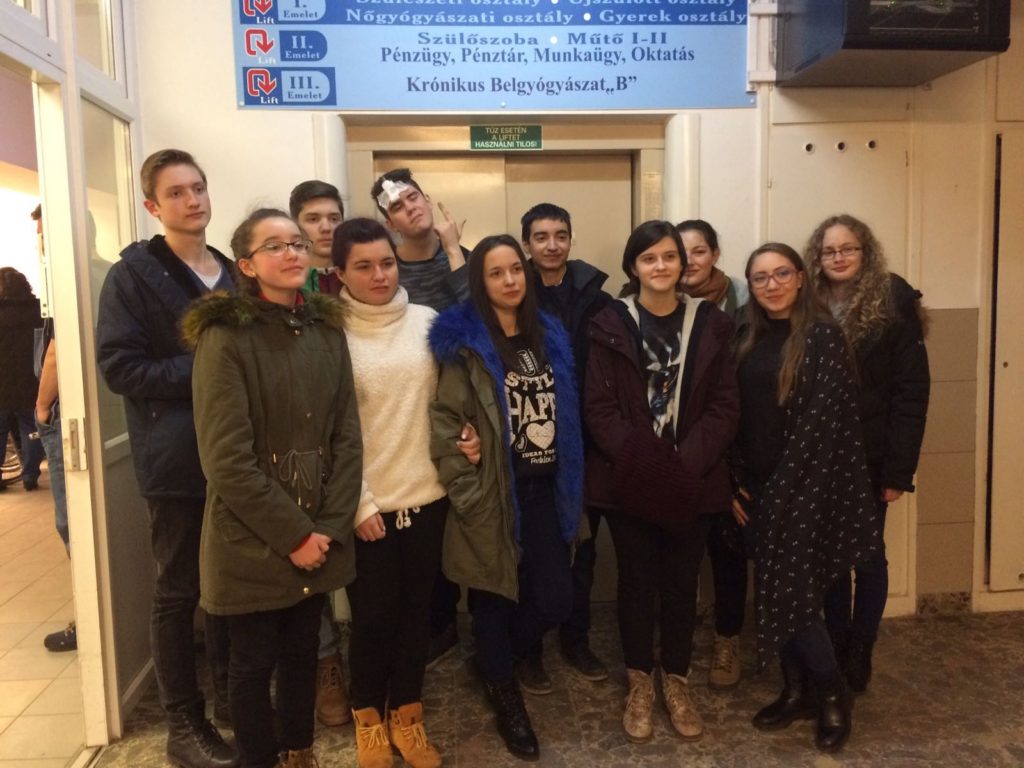 Rozi: “The doctors told us we had to stay in hospital for a few more examinations. I began to telelphone the boys’ parents. Many of them were 15 hours away from where we were. Moreover, the Gen3 were saying that they wanted to continue on to the congress. In the end we obtained permission to leave the hospital with the signature of their parents and without spending a cent.” Delia: “At that point we weren’t sure about continuing our journey, but we realized that such precious things always come with a cost.” Some days later seven boys arrived at Mariapolis Faro. The experience of fear and pain, but also of intense unity among them, showed that the theme of the congress had already become something real for them. Iulian recounts: “We all just knew that whatever happens to us in life, it’s worth it to abandon ourselves totallyto God. Jesus Forsaken unites us in an incredible way! We were allowed to live because God has a plan for us: a divine adventure awaits us.” Compiled by Chiara Favotti
Rozi: “The doctors told us we had to stay in hospital for a few more examinations. I began to telelphone the boys’ parents. Many of them were 15 hours away from where we were. Moreover, the Gen3 were saying that they wanted to continue on to the congress. In the end we obtained permission to leave the hospital with the signature of their parents and without spending a cent.” Delia: “At that point we weren’t sure about continuing our journey, but we realized that such precious things always come with a cost.” Some days later seven boys arrived at Mariapolis Faro. The experience of fear and pain, but also of intense unity among them, showed that the theme of the congress had already become something real for them. Iulian recounts: “We all just knew that whatever happens to us in life, it’s worth it to abandon ourselves totallyto God. Jesus Forsaken unites us in an incredible way! We were allowed to live because God has a plan for us: a divine adventure awaits us.” Compiled by Chiara Favotti
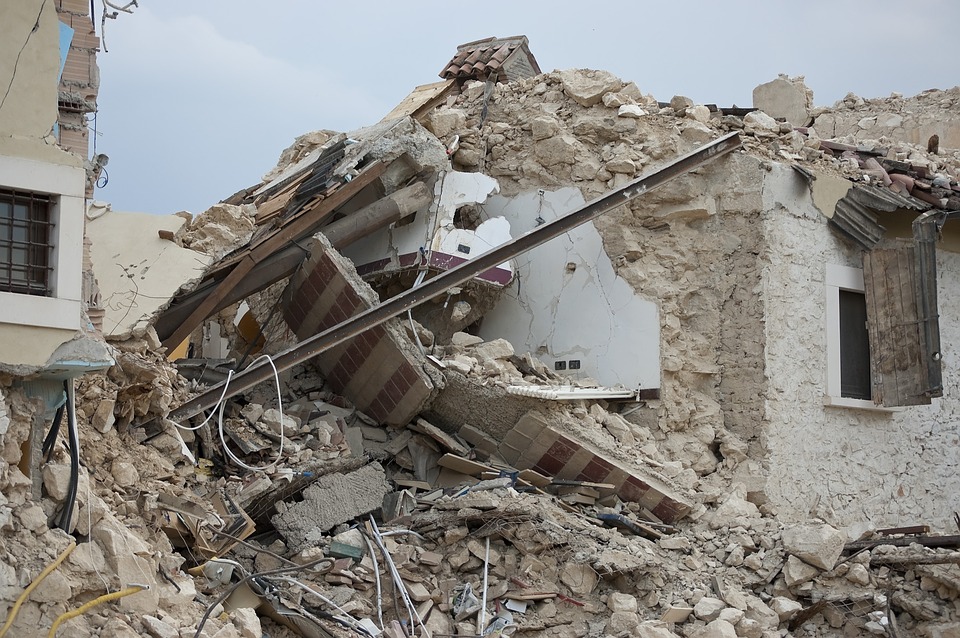
Jan 20, 2017 | Non categorizzato
 «In 142 seconds, the entire town of your childhood disappears. All that was built through the centuries is razed to the ground like a paper castle in 142 unending, damned seconds, and 299 lives are taken away from their loved ones. “Everything crumbles, and all is vanity of vanities,” is the phrase that echoes in my head while I write». This is how Lorenzo, 18, from the Marche Region started to recount his experience of remaining under the ruins of his house for some hours on 24 August. «It was 3.36 in the morning, they said, when a roar, a quake and an infernal phenomenon of dust and piles of rubble woke me up. Then came what some defined using the words of a poet, as the “quiet after the tempest.” All stood still in profound silence and it was pitch black. I was suddenly trapped in a space the size of my body. And with every small quake, a cloud of dust rose around me. My life was dangling on a string. Then at dawn, the village rescuers took me out of what I once called home and which is now just a pile of bricks starting again to call out to me. I want to share with you the joy of that moment, but words are not enough. Rescued after three hours in that inferno, there was destruction everywhere but in all this I could see only one thing: love. All went out to help the other, even placing their own lives in danger. Heedless of the hazards, they were really ready to give their lives. Sadly, or luckily, humanity gives the best of itself in suffering. Suffering is precisely the theme of my experience. I felt that despite all the people around my house, nobody could help or understand me. While praying I asked, “Why me?” and I thought: “My God, why have you abandoned me?” In reality he had not abandoned me, and when I came out I discovered why this experience has become a sort of lens through which I could see a different world, giving me the strength to live my life at best.». From the night of 24 August, and after the quakes of the succeeding months, there are still so many displaced victims of the Central Italy earthquake. These are people who had to leave their own homes, their properties and some even their own village. We really ask ourselves what they were able to bring with them after that tragic and eternal night, and what is giving them the strength to go ahead and start again. We chose Lorenzo’s story because it relays not only the fear lived that day, but also the discovery of something greater. Italy is strong, and is demonstrating great unity. There are many associations that are helping the earthquake victims, immediately involved through AMU, AFN and others to respond to the various needs. They tell us how they are working in the areas of Central Italy. «We are bringing animation activities ahead, and building a small meeting centre to allow the residents to keep up their community spirit. Then our efforts focused greatly on the support of the small agri-food enterprises of the territory, to allow them to continue operating in this emergency phase, and not to lose their jobs.» To support the small enterprises, they thought of creating a real project: «The progetto RimPRESA project. It consists of two lines: furnishing raw materials, machinery, and small infrastructure, and supporting the sales of products. Of course, at the base of all this, there must be human relationships with the people struck by the earthquake.» Source: Teens, work in progress 4 unity, New City editorial group, Rome 2016, n.6, pages 4-5 Info Progetto:www.focolaritalia.it rimpresa@focolare.org To collaborate:
«In 142 seconds, the entire town of your childhood disappears. All that was built through the centuries is razed to the ground like a paper castle in 142 unending, damned seconds, and 299 lives are taken away from their loved ones. “Everything crumbles, and all is vanity of vanities,” is the phrase that echoes in my head while I write». This is how Lorenzo, 18, from the Marche Region started to recount his experience of remaining under the ruins of his house for some hours on 24 August. «It was 3.36 in the morning, they said, when a roar, a quake and an infernal phenomenon of dust and piles of rubble woke me up. Then came what some defined using the words of a poet, as the “quiet after the tempest.” All stood still in profound silence and it was pitch black. I was suddenly trapped in a space the size of my body. And with every small quake, a cloud of dust rose around me. My life was dangling on a string. Then at dawn, the village rescuers took me out of what I once called home and which is now just a pile of bricks starting again to call out to me. I want to share with you the joy of that moment, but words are not enough. Rescued after three hours in that inferno, there was destruction everywhere but in all this I could see only one thing: love. All went out to help the other, even placing their own lives in danger. Heedless of the hazards, they were really ready to give their lives. Sadly, or luckily, humanity gives the best of itself in suffering. Suffering is precisely the theme of my experience. I felt that despite all the people around my house, nobody could help or understand me. While praying I asked, “Why me?” and I thought: “My God, why have you abandoned me?” In reality he had not abandoned me, and when I came out I discovered why this experience has become a sort of lens through which I could see a different world, giving me the strength to live my life at best.». From the night of 24 August, and after the quakes of the succeeding months, there are still so many displaced victims of the Central Italy earthquake. These are people who had to leave their own homes, their properties and some even their own village. We really ask ourselves what they were able to bring with them after that tragic and eternal night, and what is giving them the strength to go ahead and start again. We chose Lorenzo’s story because it relays not only the fear lived that day, but also the discovery of something greater. Italy is strong, and is demonstrating great unity. There are many associations that are helping the earthquake victims, immediately involved through AMU, AFN and others to respond to the various needs. They tell us how they are working in the areas of Central Italy. «We are bringing animation activities ahead, and building a small meeting centre to allow the residents to keep up their community spirit. Then our efforts focused greatly on the support of the small agri-food enterprises of the territory, to allow them to continue operating in this emergency phase, and not to lose their jobs.» To support the small enterprises, they thought of creating a real project: «The progetto RimPRESA project. It consists of two lines: furnishing raw materials, machinery, and small infrastructure, and supporting the sales of products. Of course, at the base of all this, there must be human relationships with the people struck by the earthquake.» Source: Teens, work in progress 4 unity, New City editorial group, Rome 2016, n.6, pages 4-5 Info Progetto:www.focolaritalia.it rimpresa@focolare.org To collaborate:
| Azione per un Mondo Unito ONLUS (AMU) |
Azione per Famiglie Nuove ONLUS (AFN) |
| IBAN: IT16 G050 1803 2000 0000 0120 434 at Banca Popolare Etica |
IBAN: IT55 K033 5901 6001 0000 0001 060 at Banca Prossima |
| Codice SWIFT/BIC: CCRTIT2184D |
Codice SWIFT/BIC: BCITITMX |
| CAUSE : Emergenza terremoto (Italia) |
| All contributions that are deposited in these two accounts for this cause will be jointly administered by AMU and AFN. Except for cash donations, Italian taxpayers can get deductions and allowances from income, in accordance with the regulations for non-profit organizations, to up to 10% of income and the € 70,000.00 annual limit. Tax benefits are provided in many European Union countries and other countries of the world in accordance with local regulations. |

Jan 19, 2017 | Non categorizzato
Download brochure with program Live streaming event 11 Mach 2017 16:00-18:30 (CET, UTC+1): http://live.focolare.org/FamilyHighlights/
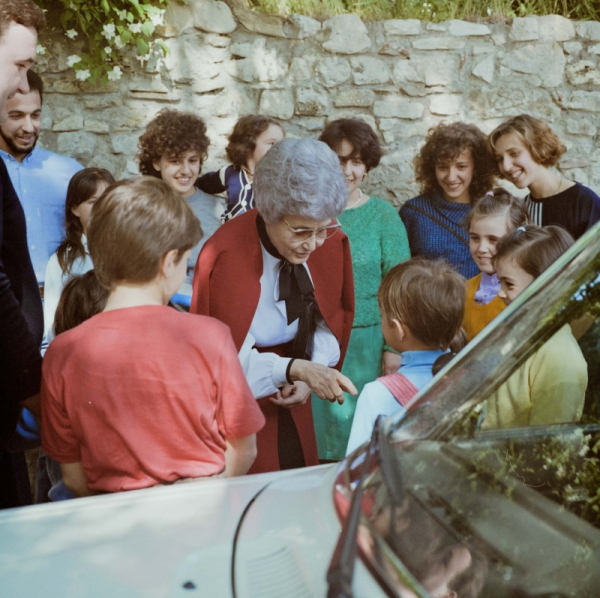 A series of events are to be held around the world in 2017 that will highlight the value of the family from the perspective of “universal brotherhood” and will bear witness to the richness of cultural diversity, through the ideal of unity incarnated in family life. The main event will be held in Loppiano from 10-12 March 2017, where about 800 participants from all over the world are expected. The families will be able to delve into the life of the international town of the Focolare and testify to the dream of Chiara Lubich which has reached all the continents. In the morning, there will be workshops for adults, young teenagers and children, in collaboration with the Parish Movement, the Gen3 and Gen4 centres, the New Families Association (AFNonlus) and the New Humanity Movement (AMU). In the afternoon there will be larger gatherings in the hall, with direct streaming. Presentations will be given by experts in family life, who are involved in the Cultural Seminar to be held at Sophia University Institute on March 10-11. The seminar will mark the opening of the Centre of Family Studies whose objective is to examine the contribution of the spirituality of unity to the family in today’s world. Three topics will be examined: Family, a story of relationships that evolve from ‘me’ to ‘us’ (relationships between the couple, with the children, among generations) Love as the appropriate measure for responding to critical problems in the family (wounds, challenges, sufferings: the reality of life and the sharing process). The family as a creative resource within the social fabric of any nation (life, family networks, solidarity and hospitality, social involvement and work)
A series of events are to be held around the world in 2017 that will highlight the value of the family from the perspective of “universal brotherhood” and will bear witness to the richness of cultural diversity, through the ideal of unity incarnated in family life. The main event will be held in Loppiano from 10-12 March 2017, where about 800 participants from all over the world are expected. The families will be able to delve into the life of the international town of the Focolare and testify to the dream of Chiara Lubich which has reached all the continents. In the morning, there will be workshops for adults, young teenagers and children, in collaboration with the Parish Movement, the Gen3 and Gen4 centres, the New Families Association (AFNonlus) and the New Humanity Movement (AMU). In the afternoon there will be larger gatherings in the hall, with direct streaming. Presentations will be given by experts in family life, who are involved in the Cultural Seminar to be held at Sophia University Institute on March 10-11. The seminar will mark the opening of the Centre of Family Studies whose objective is to examine the contribution of the spirituality of unity to the family in today’s world. Three topics will be examined: Family, a story of relationships that evolve from ‘me’ to ‘us’ (relationships between the couple, with the children, among generations) Love as the appropriate measure for responding to critical problems in the family (wounds, challenges, sufferings: the reality of life and the sharing process). The family as a creative resource within the social fabric of any nation (life, family networks, solidarity and hospitality, social involvement and work)  New logo. Fifty years after its founding, the New Families Movement changes its image with a new logo. It represents a tree, a sign of the growth of the tiny plant that over the years has produced many fruits of life that have been offered to families, to the Church and to the world. The plant is strong, which grew from the first seed that was welcomed by the good soil. Opening itself to others, the family has contributed to the birth and development of many seeds of brotherhood and peace that are sprouting a new society. Chiara Lubich (1920-2008) always paid particular attention to the family and, with the precious contribution of Igino Giordani, writer, Italian politician and first married focolarino, she lifted up his “bold, beautiful and demanding example” as a shining model for the construction of a peace in our world. In 1967 Chiara founded the New Families Movement that it might always keep love enkindled in the home, along with those family values that are so needed by today’s world. She saw the family has the best channel for reaching young people who will one day enter into married life; for broken families, widows and widowers, abandoned children – and every other form of marginalization. For more information: www.famiglienuove.org famiglienuove@focolare.org tel. 069411565
New logo. Fifty years after its founding, the New Families Movement changes its image with a new logo. It represents a tree, a sign of the growth of the tiny plant that over the years has produced many fruits of life that have been offered to families, to the Church and to the world. The plant is strong, which grew from the first seed that was welcomed by the good soil. Opening itself to others, the family has contributed to the birth and development of many seeds of brotherhood and peace that are sprouting a new society. Chiara Lubich (1920-2008) always paid particular attention to the family and, with the precious contribution of Igino Giordani, writer, Italian politician and first married focolarino, she lifted up his “bold, beautiful and demanding example” as a shining model for the construction of a peace in our world. In 1967 Chiara founded the New Families Movement that it might always keep love enkindled in the home, along with those family values that are so needed by today’s world. She saw the family has the best channel for reaching young people who will one day enter into married life; for broken families, widows and widowers, abandoned children – and every other form of marginalization. For more information: www.famiglienuove.org famiglienuove@focolare.org tel. 069411565
Jan 19, 2017 | Non categorizzato
https://vimeo.com/171535556 Copyright 2016 © CSC Audiovisivi – All rights reserved
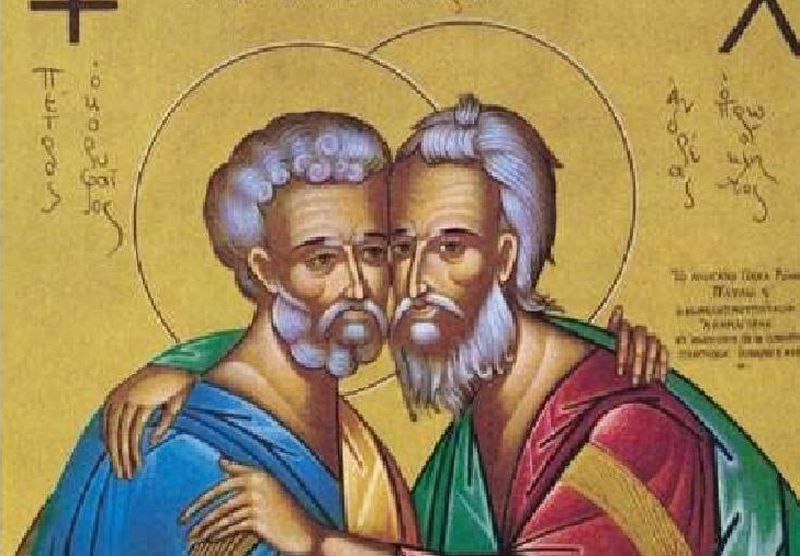
Jan 18, 2017 | Non categorizzato
 “The theme chosen for the 2017 Week of Prayer for Christian Unity is: “Reconciliation: The love of Christ compels us” (2 Cor 5:14). The Week was called for and organized by up to the most important organizations involved in ecumenism, including the Ecumenical Council of Churches and the Pontifical Council for the Promotion of Christian Unity: It was a propitious choice, especially after the celebration of the 500th anniversary of the Reform when many leading representatives of the Lutheran World Federation and Pope Francis gathered around the same altar in prayer at the Cathedral of Lund in Sweden. Alongside such highly significant ecumenical gestures another ecumenism has been spreading that could be called the ecumenism of the people. It is comprised of initiatives by the faithful of different confessions who want to recognize one another more and more as brothers and sisters. It is made up of small gestures that, thanks to the Holy Spirit, are already spreading in many places of the world. They show how far the irresistible journey of unity has come. We present a few examples from Latin America. “Many of us from the Focolare Movement in Peru had established friendships with the faithful of other Churches. Now, ever since an ecumenical group was begun in the Diocese of Arequipa, we have been collaborating with them in organizing the Week of Prayer. There will be daily events in several of the different Churches that visit the focolare regularly. Our centre was chosen for the final event of the Week of Prayer, which will include Catholic bishops, Lutheran pastors, Anglicans, Evangelicals and Pentecostals. Every month we attend an ecumenical breakfast at the YMCA, and a young Evangelical from a city in the north, with the permission of his Pastor, is attending a course of formation in the Focolare town of Loppiano, Italy.” The focolare community in Brazil reports: “We have relationships with Anglicans, Methodists, Presbyterians and Seventh Day Adventists that are truly significant. Sometimes we meet to dialogue about specific topics as we did at a conference held last August at Mariapolis Ginetta in san Paolo where we discussed the topic of peace.” “Because of our friendship with Methodists and Waldensians in Buenos Aires, Argentina, we set up on the square an ecumenical Nativity Scene that had been created by the children. It was visited by over a hundred and fifty people. It concluded with a moment of prayer with lit candles as a sign that each one of us can bring the light of Christmas into our own world.” From Venezuela: “Our sharing in the various celebrations of the Week of Prayer is an opportunity to deepen friendships that have existed for many years and to make new contacts. These friendships do not end when the celebration ends – on the contrary! The acquaintances most often lead to concrete assistance projects that we do together.” In conclusion, from Lima, Peru: “Following the ruinous floods on the outskirts, several young people from the Focolare and Methodist Church went to shovel away the mud that had covered the homes of so many humble folk. It was hard work, but we were all so happy to bring our love concretely to those families, to recognize that they are our brothers and sisters, and that we are also brothers and sisters.” Compiled by Anna Friso
“The theme chosen for the 2017 Week of Prayer for Christian Unity is: “Reconciliation: The love of Christ compels us” (2 Cor 5:14). The Week was called for and organized by up to the most important organizations involved in ecumenism, including the Ecumenical Council of Churches and the Pontifical Council for the Promotion of Christian Unity: It was a propitious choice, especially after the celebration of the 500th anniversary of the Reform when many leading representatives of the Lutheran World Federation and Pope Francis gathered around the same altar in prayer at the Cathedral of Lund in Sweden. Alongside such highly significant ecumenical gestures another ecumenism has been spreading that could be called the ecumenism of the people. It is comprised of initiatives by the faithful of different confessions who want to recognize one another more and more as brothers and sisters. It is made up of small gestures that, thanks to the Holy Spirit, are already spreading in many places of the world. They show how far the irresistible journey of unity has come. We present a few examples from Latin America. “Many of us from the Focolare Movement in Peru had established friendships with the faithful of other Churches. Now, ever since an ecumenical group was begun in the Diocese of Arequipa, we have been collaborating with them in organizing the Week of Prayer. There will be daily events in several of the different Churches that visit the focolare regularly. Our centre was chosen for the final event of the Week of Prayer, which will include Catholic bishops, Lutheran pastors, Anglicans, Evangelicals and Pentecostals. Every month we attend an ecumenical breakfast at the YMCA, and a young Evangelical from a city in the north, with the permission of his Pastor, is attending a course of formation in the Focolare town of Loppiano, Italy.” The focolare community in Brazil reports: “We have relationships with Anglicans, Methodists, Presbyterians and Seventh Day Adventists that are truly significant. Sometimes we meet to dialogue about specific topics as we did at a conference held last August at Mariapolis Ginetta in san Paolo where we discussed the topic of peace.” “Because of our friendship with Methodists and Waldensians in Buenos Aires, Argentina, we set up on the square an ecumenical Nativity Scene that had been created by the children. It was visited by over a hundred and fifty people. It concluded with a moment of prayer with lit candles as a sign that each one of us can bring the light of Christmas into our own world.” From Venezuela: “Our sharing in the various celebrations of the Week of Prayer is an opportunity to deepen friendships that have existed for many years and to make new contacts. These friendships do not end when the celebration ends – on the contrary! The acquaintances most often lead to concrete assistance projects that we do together.” In conclusion, from Lima, Peru: “Following the ruinous floods on the outskirts, several young people from the Focolare and Methodist Church went to shovel away the mud that had covered the homes of so many humble folk. It was hard work, but we were all so happy to bring our love concretely to those families, to recognize that they are our brothers and sisters, and that we are also brothers and sisters.” Compiled by Anna Friso

Jan 17, 2017 | Focolare Worldwide
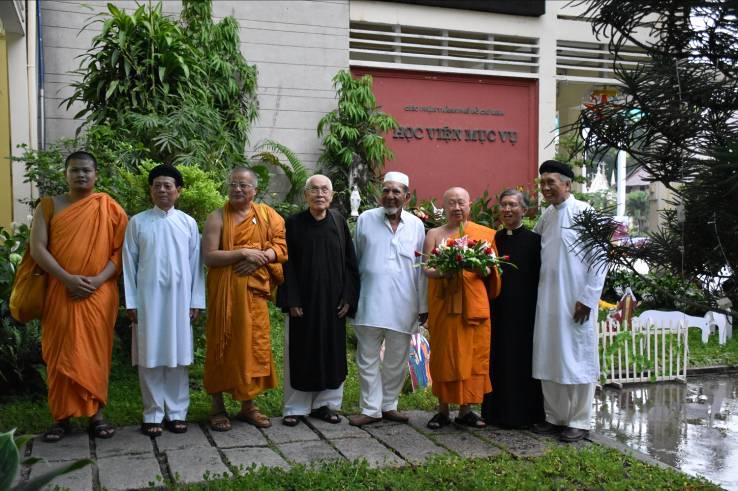 «These were days of ‘fire’, with the three monk-friends coming from Thailand: Phramaha Thongrattana Thavorn, Ajarn Suchart Vitipanyaporn, Bhikkhu Jayabhinunto and Mr. Khamphorn who accompanied them», Marcella and Luigi, Christian friends recounted, about the second week of December spent with the Buddhist monks in Ho Chi Minh City, Vietnam. Our friends stressed how «the atmosphere we breathed in these days was one of great openness and new horizons.» And continued by saying: «it was like living in a fable, so to say.» Some historical notes. The meeting of the monk, Phramaha Thongrattana Thavorn with the spirituality of unity goes back to 1995. He had come to Rome to accompany his disciple, Somjit, who was living for a short period in the community of monks before his marriage, as is the tradition of young Buddhists. Phramaha Thongrattana, which means ‘fine gold,’ and on that occasion had met Chiara Lubich and was strongly impressed. She too was impressed by him and on his request gave him a new name: Ardent Light. From then on this monk did his best to live and announce forcefully and with enthusiasm the ideal of universal brotherhood, the ideal of “mummy Chiara” (as he still calls her today). At the funeral of Chiara Lubich, in 2008, Ardent Light declared his wish to tell the Buddhists «how much good Chiara did to my life as a monk. I feel that she continues to give me an interior drive and the strength to bring the ideal of fraternity to all. She no longer belongs to you Christians, but now, she and her ideal are the legacy of the entire humanity.»
«These were days of ‘fire’, with the three monk-friends coming from Thailand: Phramaha Thongrattana Thavorn, Ajarn Suchart Vitipanyaporn, Bhikkhu Jayabhinunto and Mr. Khamphorn who accompanied them», Marcella and Luigi, Christian friends recounted, about the second week of December spent with the Buddhist monks in Ho Chi Minh City, Vietnam. Our friends stressed how «the atmosphere we breathed in these days was one of great openness and new horizons.» And continued by saying: «it was like living in a fable, so to say.» Some historical notes. The meeting of the monk, Phramaha Thongrattana Thavorn with the spirituality of unity goes back to 1995. He had come to Rome to accompany his disciple, Somjit, who was living for a short period in the community of monks before his marriage, as is the tradition of young Buddhists. Phramaha Thongrattana, which means ‘fine gold,’ and on that occasion had met Chiara Lubich and was strongly impressed. She too was impressed by him and on his request gave him a new name: Ardent Light. From then on this monk did his best to live and announce forcefully and with enthusiasm the ideal of universal brotherhood, the ideal of “mummy Chiara” (as he still calls her today). At the funeral of Chiara Lubich, in 2008, Ardent Light declared his wish to tell the Buddhists «how much good Chiara did to my life as a monk. I feel that she continues to give me an interior drive and the strength to bring the ideal of fraternity to all. She no longer belongs to you Christians, but now, she and her ideal are the legacy of the entire humanity.»  To go back to December 2016 in Ho Chi Min: «The first surprising fact – they said – was the bond of friendship that came about between Ardent Light and the Most Rev. Thich Thien Tam, monk in charge of the Pho Minh Pagoda, representative of both Theravada Buddhismo and of Mahayana in Vietnam. The latter is a personage who represents all aspects of Buddhism in Vietnam at international level. As a consequence of the trust and friendship generated between them, Rev. Thich Thien Tam had asked the competent authorities permission for the three monks to stay in the temple instead of a hotel as according to protocol. ». Various interreligious (and not only) events were held, such as their visit to two Christian communities, including lunch. The monks also took part in the Christmas feast, usually held for the local Christians, but they were welcomed with great joy by everyone. Then followed the two visits to social projects brought ahead by Christians inspired by the spirituality of unity. And then, the interreligious meeting at the Diocesan Pastoral Centre of Ho Chi Minh City, attended by representatives of five religions. On that occasion, Ardent Light spoke of his friendship with the Pope at that time, John Paul II and with Chiara Lubich. He explained about what she used to call “the art of loving”: a love that addresses everyone, and one that takes the initiative, that is able to be the other’s “neighbor,” that even goes to the point of loving and praying for one’s enemies… Marcella and Luigi recounted that «The eyes of some of the leaders present filled with tears – and to tell the truth, also those of our community.» The two hours of true dialogue concluded with the visit to the Archbishop emeritus, Cardinal J. Baptiste Phan Minh Man, who had so strongly worked for the creation of the interreligious dialogue at the Diocesan Pastoral Centre. The last day was dedicated to the visit to some temples, and acting as guide was Fr. Bao Loc, priest in charge of interreligious dialogue for the Diocese of Ho Chi Minh City. «Now new, unexpected horizons have opened before us, It is now up to us to continue the experience we have lived these days. Chiara’s legacy, of being always a family, is a reality that touches the hearts of everyone, when it is really lived.» By Gustavo Clariá
To go back to December 2016 in Ho Chi Min: «The first surprising fact – they said – was the bond of friendship that came about between Ardent Light and the Most Rev. Thich Thien Tam, monk in charge of the Pho Minh Pagoda, representative of both Theravada Buddhismo and of Mahayana in Vietnam. The latter is a personage who represents all aspects of Buddhism in Vietnam at international level. As a consequence of the trust and friendship generated between them, Rev. Thich Thien Tam had asked the competent authorities permission for the three monks to stay in the temple instead of a hotel as according to protocol. ». Various interreligious (and not only) events were held, such as their visit to two Christian communities, including lunch. The monks also took part in the Christmas feast, usually held for the local Christians, but they were welcomed with great joy by everyone. Then followed the two visits to social projects brought ahead by Christians inspired by the spirituality of unity. And then, the interreligious meeting at the Diocesan Pastoral Centre of Ho Chi Minh City, attended by representatives of five religions. On that occasion, Ardent Light spoke of his friendship with the Pope at that time, John Paul II and with Chiara Lubich. He explained about what she used to call “the art of loving”: a love that addresses everyone, and one that takes the initiative, that is able to be the other’s “neighbor,” that even goes to the point of loving and praying for one’s enemies… Marcella and Luigi recounted that «The eyes of some of the leaders present filled with tears – and to tell the truth, also those of our community.» The two hours of true dialogue concluded with the visit to the Archbishop emeritus, Cardinal J. Baptiste Phan Minh Man, who had so strongly worked for the creation of the interreligious dialogue at the Diocesan Pastoral Centre. The last day was dedicated to the visit to some temples, and acting as guide was Fr. Bao Loc, priest in charge of interreligious dialogue for the Diocese of Ho Chi Minh City. «Now new, unexpected horizons have opened before us, It is now up to us to continue the experience we have lived these days. Chiara’s legacy, of being always a family, is a reality that touches the hearts of everyone, when it is really lived.» By Gustavo Clariá

Jan 16, 2017 | Non categorizzato
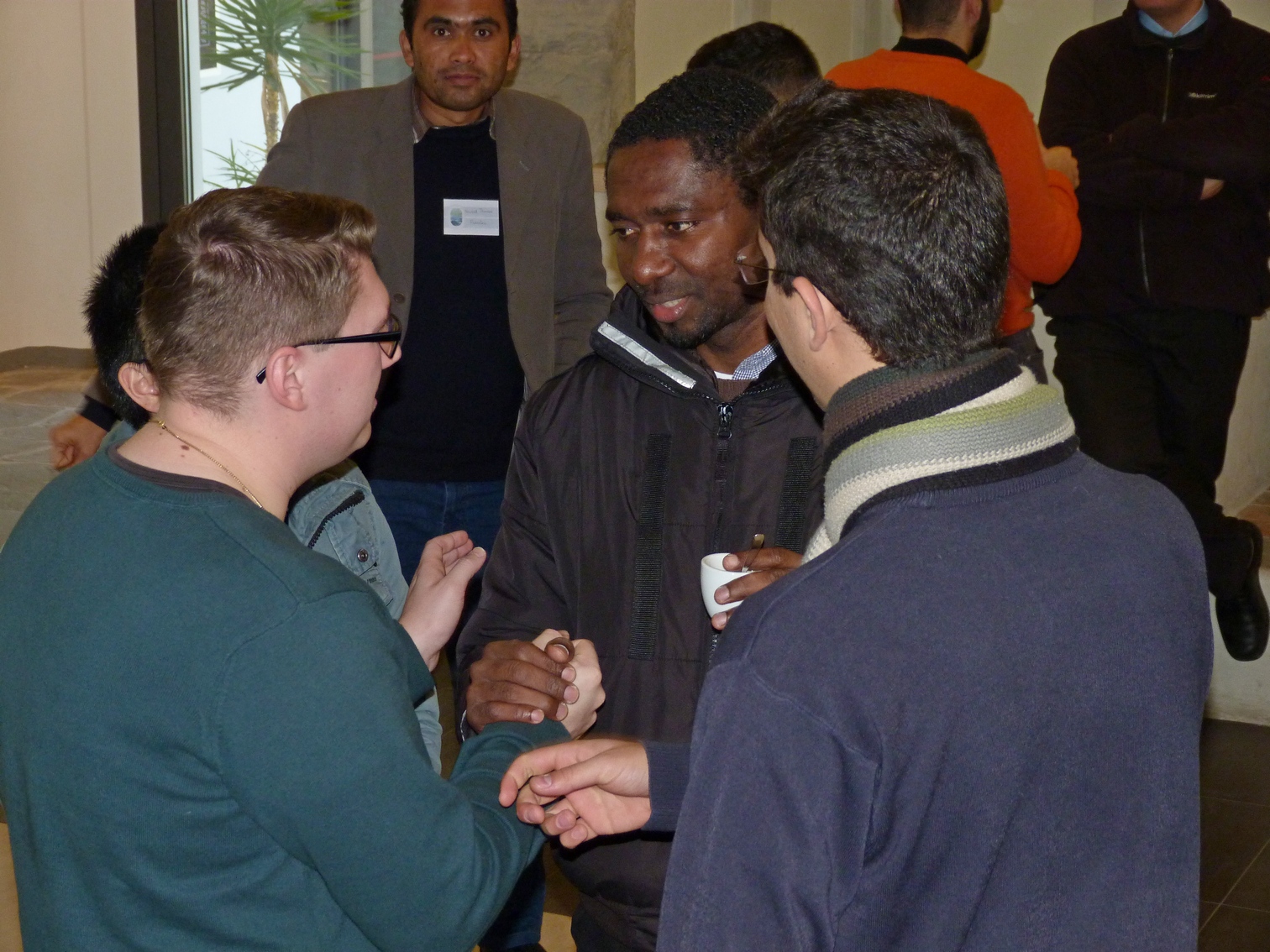 Over 40 seminarians and several priests from 17 countries on the 5 continents took an end-of-the-year holiday trip to Loppiano. “We chose the Focolare’s international town to have an experience of God in the communion among us,” they write, “and to go deeper into that radical choice of the Gospel that our heart burns for.” It was precisely the Gospel that they wanted to have as the basis of their stay in Loppiano, starting from the Golden Rule, that mandate which can also be found in the sacred writings of all the Great Religions: “So in everything, do to others as you would have them do to you” (Mt 7:12). The group stayed at Vinea Mea, the permanent residence of the School for Priests from different parts of the world who wish to be formed in the Focolare’s Spirituality of Unity and to experience a Church that St. John Paul II described as “Home and school of communion” (Novo Millennio Ineunte, 43). The seminarians were accompanied in their experience by the priests at Vinea Mea and by experts from Loppiano. The method used in presenting the topics – including some that were theologically quite dense – was dynamic and experiential and even included personal examples from their own lives, which helped the young men to come to terms with where they stood personally with Jesus’s message
Over 40 seminarians and several priests from 17 countries on the 5 continents took an end-of-the-year holiday trip to Loppiano. “We chose the Focolare’s international town to have an experience of God in the communion among us,” they write, “and to go deeper into that radical choice of the Gospel that our heart burns for.” It was precisely the Gospel that they wanted to have as the basis of their stay in Loppiano, starting from the Golden Rule, that mandate which can also be found in the sacred writings of all the Great Religions: “So in everything, do to others as you would have them do to you” (Mt 7:12). The group stayed at Vinea Mea, the permanent residence of the School for Priests from different parts of the world who wish to be formed in the Focolare’s Spirituality of Unity and to experience a Church that St. John Paul II described as “Home and school of communion” (Novo Millennio Ineunte, 43). The seminarians were accompanied in their experience by the priests at Vinea Mea and by experts from Loppiano. The method used in presenting the topics – including some that were theologically quite dense – was dynamic and experiential and even included personal examples from their own lives, which helped the young men to come to terms with where they stood personally with Jesus’s message 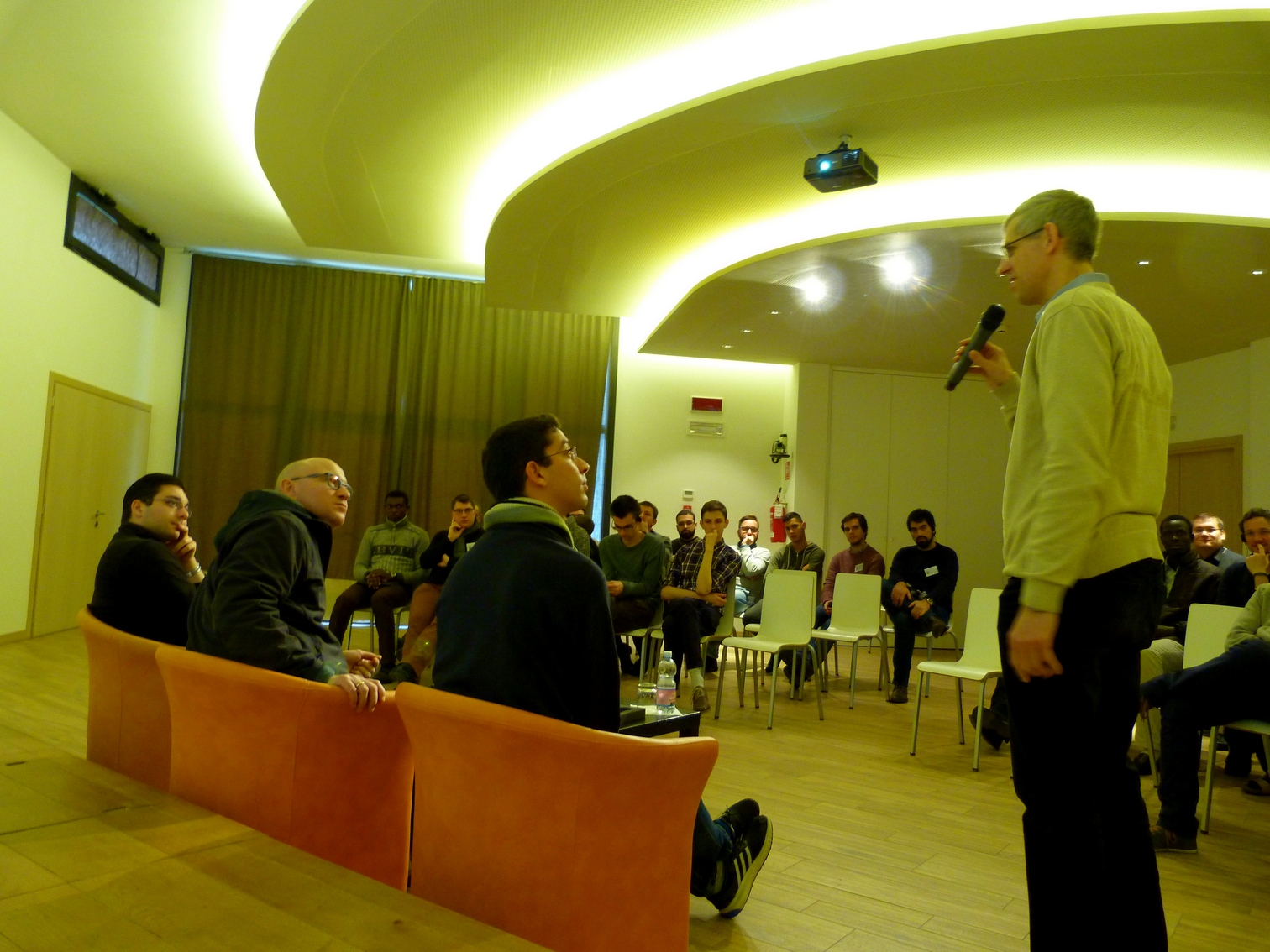 One of the seminarians writes: “I was very struck by one of the main points of the spirituality of Chiara Lubich, which was presented in the talk on ‘Jesus Forsaken, God’s window on the world and the world’s window on God’. I realized that his gaze of love opens the way for humankind toward God, but also opens God’s path toward humankind in a way that is ever new.” Another writes: “I understood that the Jesus who became a man out of love and expressed the culmination of that love in the abandonment on the cross, is not only a beautiful theological concept, but should become life in me, in love and service for whoever is near to me.” Their interaction with the citizens of Loppiano enhanced their understanding of how to build unity among themselves in spite of the many differences. Some impressions from at the concluding session: “In these days I discovered that even in our interpersonal relationships the key is being able to make myself nothing in front of the other person, as Jesus Forsaken did, burning the difficulties involved in the life of unity in Him.” “What struck me the most was the joy with which the inhabitants of the Mariapolis [Loppiano] face weariness and service, and transmit God to everyone else.” Compiled by the Gens Centre
One of the seminarians writes: “I was very struck by one of the main points of the spirituality of Chiara Lubich, which was presented in the talk on ‘Jesus Forsaken, God’s window on the world and the world’s window on God’. I realized that his gaze of love opens the way for humankind toward God, but also opens God’s path toward humankind in a way that is ever new.” Another writes: “I understood that the Jesus who became a man out of love and expressed the culmination of that love in the abandonment on the cross, is not only a beautiful theological concept, but should become life in me, in love and service for whoever is near to me.” Their interaction with the citizens of Loppiano enhanced their understanding of how to build unity among themselves in spite of the many differences. Some impressions from at the concluding session: “In these days I discovered that even in our interpersonal relationships the key is being able to make myself nothing in front of the other person, as Jesus Forsaken did, burning the difficulties involved in the life of unity in Him.” “What struck me the most was the joy with which the inhabitants of the Mariapolis [Loppiano] face weariness and service, and transmit God to everyone else.” Compiled by the Gens Centre
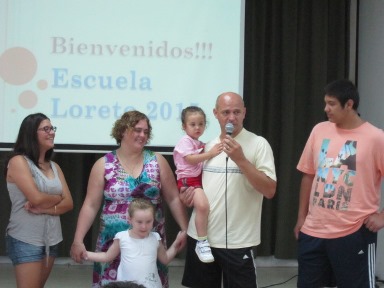
Jan 14, 2017 | Non categorizzato
 […] When God created humankind, he formed a family. When the Word of God came on earth, he chose to be born in a family. Jesus began his public life during the celebration of a new family. God had the family so much at heart; he considered it to be of such importance that he impressed on it his own image. In fact, the family reflects God’s very own life, the life of the Holy Trinity. […] So what was God’s plan for the family? God who is love, thought of the family as an intertwining of relationships of love: nuptial love between the couple, maternal and paternal love towards the children, filial love toward the parents, the love of grandparents for their grandchildren, of the grandchildren for their grandparents, for their uncles and aunts and vice versa. The family is therefore a treasure chest, a jewel, a mystery of love. This is how God thought of and created the family. Moreover, his Son, in redeeming the world, turned this natural love, which permeates the members of a family, into something sublime through the divine love he brought on earth, through the fire he wants to set alight everywhere. Through him, the family has become not only the primary cell of humanity created by God, but also the basic cell of the Church founded by his Son. Because of the supernatural love that the members of the family have for one another ‑ through baptism and the other sacraments, particularly the sacrament of matrimony ‑ they are called individually and collectively to the sublime heights of making the family a small church, an “ecclesiola”. […] Jesus wants the husband to see and love in his wife, not only the person with whom he shares his life, but to see and love Christ himself in her. In fact, Jesus considers done to him the way the husband treats his wife and vice versa. Furthermore, Jesus in the husband or wife must be loved in the measure that Jesus requires, as he expressed with the words, “Love one another as I have loved you” (John 13:34). They must love one another to the point of being ready to give their lives for one another. If parents keep this in mind throughout the day, whether they are praying, working or sharing a meal, whether they are resting or studying, laughing or playing with their children… every moment will be an opportunity for bearing witness to God. Morer: The Family and Prayer From Chiara Lubich’s talk to the international congress “Family and Society: The Family Centred on God is Open to all Humanity”, Castel Gandolfo, 8 April 1989.
[…] When God created humankind, he formed a family. When the Word of God came on earth, he chose to be born in a family. Jesus began his public life during the celebration of a new family. God had the family so much at heart; he considered it to be of such importance that he impressed on it his own image. In fact, the family reflects God’s very own life, the life of the Holy Trinity. […] So what was God’s plan for the family? God who is love, thought of the family as an intertwining of relationships of love: nuptial love between the couple, maternal and paternal love towards the children, filial love toward the parents, the love of grandparents for their grandchildren, of the grandchildren for their grandparents, for their uncles and aunts and vice versa. The family is therefore a treasure chest, a jewel, a mystery of love. This is how God thought of and created the family. Moreover, his Son, in redeeming the world, turned this natural love, which permeates the members of a family, into something sublime through the divine love he brought on earth, through the fire he wants to set alight everywhere. Through him, the family has become not only the primary cell of humanity created by God, but also the basic cell of the Church founded by his Son. Because of the supernatural love that the members of the family have for one another ‑ through baptism and the other sacraments, particularly the sacrament of matrimony ‑ they are called individually and collectively to the sublime heights of making the family a small church, an “ecclesiola”. […] Jesus wants the husband to see and love in his wife, not only the person with whom he shares his life, but to see and love Christ himself in her. In fact, Jesus considers done to him the way the husband treats his wife and vice versa. Furthermore, Jesus in the husband or wife must be loved in the measure that Jesus requires, as he expressed with the words, “Love one another as I have loved you” (John 13:34). They must love one another to the point of being ready to give their lives for one another. If parents keep this in mind throughout the day, whether they are praying, working or sharing a meal, whether they are resting or studying, laughing or playing with their children… every moment will be an opportunity for bearing witness to God. Morer: The Family and Prayer From Chiara Lubich’s talk to the international congress “Family and Society: The Family Centred on God is Open to all Humanity”, Castel Gandolfo, 8 April 1989.
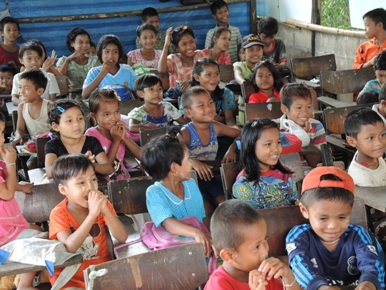
Jan 13, 2017 | Focolare Worldwide
 One of my acquaintances, years ago said: “wherever there are the poor, money also abounds.” I was young then and didn’t believe in those words: after 26 years in Asia, I realised to my dismay, that this is true also in Mae Sot. Notwithstanding any type of sustainable development or minimum respect for man and nature, paths are paved, and projects are springing up to bring the big industries, relocating them from where they find difficulty in being productive or are kicked out because it is illicit and dangerous for people’s health. All this is because there is a “work force” at low cost, very low, if not at zero cost; and on the other hand, there are the very wealthy people, ready to exploit the situation. The poor cross the border from Myanmar to Thailand, to escape from hunger and the discomforts of a country that is still struggling to reach social equality and protect the less fortunate classes or those of other religions. People are continuously expelled at the checkpoint and there are shooting incidents, with the children bearing the brunt of it all. There is a growing number of orphans, disabled and abandoned children, or those left alone at home while their parents are at work in the plantations. It is really sad to see children suffering! And Mae Sot is full of them. This is why we are trying to do something for them through our project. Every time we go to that area, we find our “special spots”: the orphanages, isolated homes in the countryside, and our little school Goccia dopo Goccia (Drop by Drop) with about 60 students: the places where you see so many of those kids with big black eyes that mark your soul indelibly. Our project is now in its 6th year (even if we have been helping the Karen people for decades) and reaches about 250 people in three countries (Thailand, Laos and Vietnam). All are direct and concrete micro projects for families often living below the minimum subsistence threshold. Their needs? Certainly food, clothes, but above all, love which means care, a smile, a bit of attention, in short: someone who says “how are you?” That means meeting people who know how to share the sufferings of a migrant population that is worth very little in the eyes of the rich, and is thus exploited. This is what we are trying to do: helping them, staying by their side, and giving relief, hope and warmth. Through our local contact person our aid reaches them monthly. Every three months we do the rounds of our projects, visiting them to make them feel that they have not been abandoned. They often say, “The fact that you travel so far to come and visit, gives us the strength and determination to go on living.” Those black eyes and unsmiling faces say more than a thousand words. They remind us of the works of Chiara Lubich who inspired our project: “Bring to me all the lonely people.” And we feel that these lonely people are all “ours” because they are images of the face of Jesus who continues to cry out on the Cross asking for all the love we can give. This is the sense of our project, but even more, it is our intimate joy. By: Luigi Butori For those who wish to join in the project: Banca Cantonale dei Grigioni, 7002 Coira IBAN-Nr: CH19 0077 4010 2957 6490 0 Goccia dopo Goccia Residenza Ragazzi 196a CH 7742 Poschiavo, Svizzera e mail: gica.ceccarelli@bluewin.ch oppure gocciadopogoccia.ms@gmail.com Association recognised by the tax administration of the Grigione district. Donations can be detracted from taxes..
One of my acquaintances, years ago said: “wherever there are the poor, money also abounds.” I was young then and didn’t believe in those words: after 26 years in Asia, I realised to my dismay, that this is true also in Mae Sot. Notwithstanding any type of sustainable development or minimum respect for man and nature, paths are paved, and projects are springing up to bring the big industries, relocating them from where they find difficulty in being productive or are kicked out because it is illicit and dangerous for people’s health. All this is because there is a “work force” at low cost, very low, if not at zero cost; and on the other hand, there are the very wealthy people, ready to exploit the situation. The poor cross the border from Myanmar to Thailand, to escape from hunger and the discomforts of a country that is still struggling to reach social equality and protect the less fortunate classes or those of other religions. People are continuously expelled at the checkpoint and there are shooting incidents, with the children bearing the brunt of it all. There is a growing number of orphans, disabled and abandoned children, or those left alone at home while their parents are at work in the plantations. It is really sad to see children suffering! And Mae Sot is full of them. This is why we are trying to do something for them through our project. Every time we go to that area, we find our “special spots”: the orphanages, isolated homes in the countryside, and our little school Goccia dopo Goccia (Drop by Drop) with about 60 students: the places where you see so many of those kids with big black eyes that mark your soul indelibly. Our project is now in its 6th year (even if we have been helping the Karen people for decades) and reaches about 250 people in three countries (Thailand, Laos and Vietnam). All are direct and concrete micro projects for families often living below the minimum subsistence threshold. Their needs? Certainly food, clothes, but above all, love which means care, a smile, a bit of attention, in short: someone who says “how are you?” That means meeting people who know how to share the sufferings of a migrant population that is worth very little in the eyes of the rich, and is thus exploited. This is what we are trying to do: helping them, staying by their side, and giving relief, hope and warmth. Through our local contact person our aid reaches them monthly. Every three months we do the rounds of our projects, visiting them to make them feel that they have not been abandoned. They often say, “The fact that you travel so far to come and visit, gives us the strength and determination to go on living.” Those black eyes and unsmiling faces say more than a thousand words. They remind us of the works of Chiara Lubich who inspired our project: “Bring to me all the lonely people.” And we feel that these lonely people are all “ours” because they are images of the face of Jesus who continues to cry out on the Cross asking for all the love we can give. This is the sense of our project, but even more, it is our intimate joy. By: Luigi Butori For those who wish to join in the project: Banca Cantonale dei Grigioni, 7002 Coira IBAN-Nr: CH19 0077 4010 2957 6490 0 Goccia dopo Goccia Residenza Ragazzi 196a CH 7742 Poschiavo, Svizzera e mail: gica.ceccarelli@bluewin.ch oppure gocciadopogoccia.ms@gmail.com Association recognised by the tax administration of the Grigione district. Donations can be detracted from taxes..
Jan 12, 2017 | Non categorizzato
https://vimeo.com/192602876 Copyright 2016 © CSC Audiovisivi – All rights reserved

Jan 11, 2017 | Focolare Worldwide
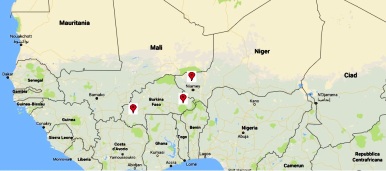 “We’ve just completed our journey that took us from Bobo-Dioulasso to Dorì, the most northern city of Burkina Faso; and then it was on to Niamey in Niger. The objective was to respond to the community that has gathered in the Focolare spirit to share experiences and the first fruits of life that have begun to spread in these lands of the Sahel.” This is how focolarini Aurora and Pascal from the focolare in Bobo Dioulasso begin their recount. Bobo Dioulasso is the second largest city in Burkina Faso and the headquarters of the local Focolare Movement . Burkina with its 17 million inhabitants (50% Muslim, 30% Christian and 20% traditional religions) is one of the poorest countries in the world, along with nearby Niger. “We reached Niamey, the capital of Niger, where we were welcomed with much joy by the community, including Archbishop Laurent Lompo who became a priest, he says, because of the first Mariapolis he attended. Archbishop Lompo is a real shepherd, close to his people and very concrete in his love. He shared with us his many experiences of friendship and dialogue with Muslims who make up 93% of the population of 10 million people. The relationship of the Christians with the Muslim world is a challenge, especially after January 17, 2015 when Islamist extremists burned more than 70 Christian churches following the Charlie Hebdo attacks in Paris.”
“We’ve just completed our journey that took us from Bobo-Dioulasso to Dorì, the most northern city of Burkina Faso; and then it was on to Niamey in Niger. The objective was to respond to the community that has gathered in the Focolare spirit to share experiences and the first fruits of life that have begun to spread in these lands of the Sahel.” This is how focolarini Aurora and Pascal from the focolare in Bobo Dioulasso begin their recount. Bobo Dioulasso is the second largest city in Burkina Faso and the headquarters of the local Focolare Movement . Burkina with its 17 million inhabitants (50% Muslim, 30% Christian and 20% traditional religions) is one of the poorest countries in the world, along with nearby Niger. “We reached Niamey, the capital of Niger, where we were welcomed with much joy by the community, including Archbishop Laurent Lompo who became a priest, he says, because of the first Mariapolis he attended. Archbishop Lompo is a real shepherd, close to his people and very concrete in his love. He shared with us his many experiences of friendship and dialogue with Muslims who make up 93% of the population of 10 million people. The relationship of the Christians with the Muslim world is a challenge, especially after January 17, 2015 when Islamist extremists burned more than 70 Christian churches following the Charlie Hebdo attacks in Paris.”  “Archbishop Lompo suggested that we also visit a woman in Hawa who had once attended Focolare events but now, for family reasons, had become a Muslim. Surprised and moved by our visit, she told us about her family and the beautiful hours together in the Mariapolis. When she heard that there would be another Mariapolis in the area, she promised that she would start preparig to be there. It was so beautiful to see in her and so many other Muslims that we met, their joy at being able to live in the City of Mary (Mariapolis) the experience of mutual love.” “Lastly, we visited a small community in Niamey; such deep people, desirous to live the Gospel and go forward in the experience of unity. Maybe our visit encouraged them on that path. One of them said to us in the name of everyone else: “It’s true that here in Africa we have to live so many difficult situations, but with the spirituality of Chiara Lubich we learn to love others, taking on their suffering and pain. How much I want this ideal of brotherhood to invade the Church and our country’s society!” Aurora De Oliveira and Pascal Pontien Ntawuyankira
“Archbishop Lompo suggested that we also visit a woman in Hawa who had once attended Focolare events but now, for family reasons, had become a Muslim. Surprised and moved by our visit, she told us about her family and the beautiful hours together in the Mariapolis. When she heard that there would be another Mariapolis in the area, she promised that she would start preparig to be there. It was so beautiful to see in her and so many other Muslims that we met, their joy at being able to live in the City of Mary (Mariapolis) the experience of mutual love.” “Lastly, we visited a small community in Niamey; such deep people, desirous to live the Gospel and go forward in the experience of unity. Maybe our visit encouraged them on that path. One of them said to us in the name of everyone else: “It’s true that here in Africa we have to live so many difficult situations, but with the spirituality of Chiara Lubich we learn to love others, taking on their suffering and pain. How much I want this ideal of brotherhood to invade the Church and our country’s society!” Aurora De Oliveira and Pascal Pontien Ntawuyankira
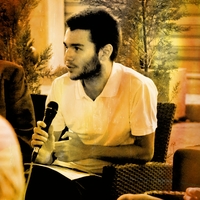
Jan 10, 2017 | Non categorizzato
 Piotr, what made you choose to enroll in Sophia? Many factors are involved. During high school I had the fortune to meet a philosopher from Turin by the name of Costanzo Preve, who introduced me to philosophical studies, an interest that arose from the attraction I felt for politics. His Hegelian-Marxist philosophical approach opened my eyes to social totality which likewise made the choice of my university studies very challenging; I could not make up my mind between economics, politics and philosophy. Towards the end of high school, a professor spoke to me about Sophia, even though it offered only Master’s courses. Finally, in order to have a diploma that would give me more job possibilities, I chose the three-year degree in economics in Genoa. But this choice was not really satisfactory… My dissatisfaction with the “mainstream” syllabus plans of many courses made me join the international network called “Rethinking Economics” to promote economic, methodological and interdisciplinary pluralism in the university methods of teaching economics, and the founding of a local seat for the network. Concurrently, and in an independent way, I continued my musical and philosophical studies. Besides, I had become a journalist and am part of the editorial staff of the paper “Termometro Politico” (Political Thermometre) and for some months now, direct the ecclesial debate magazine Grandsons of Maritain. In short, along the years I had read some essays of the Rector Piero Coda and had asked him if I could visit Sophia. I came twice, before enrolling. And every time my “Sophian” vocation became increasingly evident. What course have you decided to undertake and how have the first months in Sophia been? I chosen Trinitarian ontology, also because it gives me the chance to benefit from the agreement with Perugia University for the dual diploma, so as to achieve, besides that of the Vatican, also an Italian Master’s in philosophy specializing in didactics, which will, in the future give me the chance to teach in high schools. In these first months almost all of us have attended the same courses in philosophy, theology, politics and economics, which will enable us to start our studies on a common basis. This interdisciplinarity in my case, was not at all a surprise, but a conscious choice. From the academic viewpoint, Sophia’s level is very high and has given me the chance to deepen the course themes I am personally interested in. At the end of August I started to live in the residence, exactly two floors above the university facilities, together with 9 boys of all continents – from Argentina to China, from Germany to Tanzania, and across countries like the Lebanon. It is an excellent coexistence, well organized even in the housework: I immediately felt that we are brothers, in our little daily concerns. How about your projects? I can’t say much about this, since at this moment, new paths are opening out before me; the medium-term objective is to obtain my degree, but for my thesis I am considering various themes, and as oftentimes occurs, probably none of these will be the definitive one. Later, I may consider a Doctorate, but time will tell. I would like however to carry on with my journalistic activities, and, from the employment point of view, I would not really mind teaching, or find a job in the publishing sector. I don’t really want to set any limits to the Spirit who could inspire me to take other paths. Source: IUS online
Piotr, what made you choose to enroll in Sophia? Many factors are involved. During high school I had the fortune to meet a philosopher from Turin by the name of Costanzo Preve, who introduced me to philosophical studies, an interest that arose from the attraction I felt for politics. His Hegelian-Marxist philosophical approach opened my eyes to social totality which likewise made the choice of my university studies very challenging; I could not make up my mind between economics, politics and philosophy. Towards the end of high school, a professor spoke to me about Sophia, even though it offered only Master’s courses. Finally, in order to have a diploma that would give me more job possibilities, I chose the three-year degree in economics in Genoa. But this choice was not really satisfactory… My dissatisfaction with the “mainstream” syllabus plans of many courses made me join the international network called “Rethinking Economics” to promote economic, methodological and interdisciplinary pluralism in the university methods of teaching economics, and the founding of a local seat for the network. Concurrently, and in an independent way, I continued my musical and philosophical studies. Besides, I had become a journalist and am part of the editorial staff of the paper “Termometro Politico” (Political Thermometre) and for some months now, direct the ecclesial debate magazine Grandsons of Maritain. In short, along the years I had read some essays of the Rector Piero Coda and had asked him if I could visit Sophia. I came twice, before enrolling. And every time my “Sophian” vocation became increasingly evident. What course have you decided to undertake and how have the first months in Sophia been? I chosen Trinitarian ontology, also because it gives me the chance to benefit from the agreement with Perugia University for the dual diploma, so as to achieve, besides that of the Vatican, also an Italian Master’s in philosophy specializing in didactics, which will, in the future give me the chance to teach in high schools. In these first months almost all of us have attended the same courses in philosophy, theology, politics and economics, which will enable us to start our studies on a common basis. This interdisciplinarity in my case, was not at all a surprise, but a conscious choice. From the academic viewpoint, Sophia’s level is very high and has given me the chance to deepen the course themes I am personally interested in. At the end of August I started to live in the residence, exactly two floors above the university facilities, together with 9 boys of all continents – from Argentina to China, from Germany to Tanzania, and across countries like the Lebanon. It is an excellent coexistence, well organized even in the housework: I immediately felt that we are brothers, in our little daily concerns. How about your projects? I can’t say much about this, since at this moment, new paths are opening out before me; the medium-term objective is to obtain my degree, but for my thesis I am considering various themes, and as oftentimes occurs, probably none of these will be the definitive one. Later, I may consider a Doctorate, but time will tell. I would like however to carry on with my journalistic activities, and, from the employment point of view, I would not really mind teaching, or find a job in the publishing sector. I don’t really want to set any limits to the Spirit who could inspire me to take other paths. Source: IUS online
Jan 9, 2017 | Non categorizzato
https://vimeo.com/192601012 Copyright 2016 © CSC Audiovisivi – All rights reserved
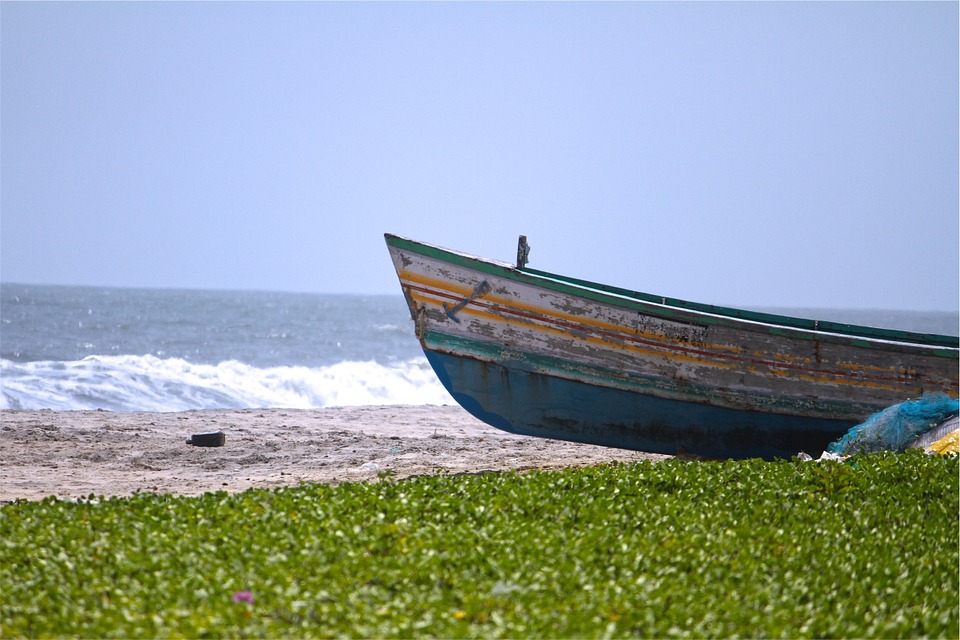
Jan 8, 2017 | Senza categoria
 Migrants We watched the first disembarkations in our cities. Today the initial receptions were moved to the courtyard in front of the municipal gym next to our home, and so from my balcony I could watch the long lines of migrants with bare feet or in singlets and shorts, waiting to pass through the first checkpoint. Suddenly it became very windy and the temperature dropped. I could no longer stand still. I had to do something for these brothers already harshly put to the test. I went out and noted an acquaintance among the members of the surveillance team, and learned from him that they were short of clothing. I returned home, and with my husband, put together what we thought could be useful, and after a few trips, delivered all to his friend, to be distributed. Also other acquaintances who we had notified, added other clothing. It had started to rain, but almost all had now received some clothing. Many smiled at us saying “grazie” (thank you in Italian), perhaps one of the few words they knew. Raffaella (Italy) Fund gathering When I found out that the father of a big and poor family needed an urgent operation but did not have the means to pay for it, I felt Jesus was prodding me to do something. With some friends, I made the effort to start raising funds, involving also our colleagues at work. Once I gathered the necessary amount, I accompanied the sick man to the hospital, and paid for the relevant treatment. The operation was a success. I can’t say if the joy of that family was greater than ours. I think that also small gestures contribute to building peace. N. Y. (Jordan) Neighbours The neighbour in front of our house was sick and needed many treatments. Her husband had gone on pension ahead of time to take care of her. My husband and I felt we had to do something and became their friends. While conversing with them one day, we ended up talking about our faith. We found out that she had stopped going to Church due to the incorrect behaviour of some priests; the husband instead, did not have much time for anything else due to work. When I recounted how God had come into my life, my neighbor started to ask many questions, and deduced that perhaps, illness itself could be a bridge that God was offering to her, as a means to move away from the heavy and sad atmosphere reigning in that house. She also started to give more care more to her looks. One evening her husband confided: «There is no medicine that can give serenity, and for some time now we are exploiting this asset». L. M. (France) BY: Oreste Paliotti
Migrants We watched the first disembarkations in our cities. Today the initial receptions were moved to the courtyard in front of the municipal gym next to our home, and so from my balcony I could watch the long lines of migrants with bare feet or in singlets and shorts, waiting to pass through the first checkpoint. Suddenly it became very windy and the temperature dropped. I could no longer stand still. I had to do something for these brothers already harshly put to the test. I went out and noted an acquaintance among the members of the surveillance team, and learned from him that they were short of clothing. I returned home, and with my husband, put together what we thought could be useful, and after a few trips, delivered all to his friend, to be distributed. Also other acquaintances who we had notified, added other clothing. It had started to rain, but almost all had now received some clothing. Many smiled at us saying “grazie” (thank you in Italian), perhaps one of the few words they knew. Raffaella (Italy) Fund gathering When I found out that the father of a big and poor family needed an urgent operation but did not have the means to pay for it, I felt Jesus was prodding me to do something. With some friends, I made the effort to start raising funds, involving also our colleagues at work. Once I gathered the necessary amount, I accompanied the sick man to the hospital, and paid for the relevant treatment. The operation was a success. I can’t say if the joy of that family was greater than ours. I think that also small gestures contribute to building peace. N. Y. (Jordan) Neighbours The neighbour in front of our house was sick and needed many treatments. Her husband had gone on pension ahead of time to take care of her. My husband and I felt we had to do something and became their friends. While conversing with them one day, we ended up talking about our faith. We found out that she had stopped going to Church due to the incorrect behaviour of some priests; the husband instead, did not have much time for anything else due to work. When I recounted how God had come into my life, my neighbor started to ask many questions, and deduced that perhaps, illness itself could be a bridge that God was offering to her, as a means to move away from the heavy and sad atmosphere reigning in that house. She also started to give more care more to her looks. One evening her husband confided: «There is no medicine that can give serenity, and for some time now we are exploiting this asset». L. M. (France) BY: Oreste Paliotti
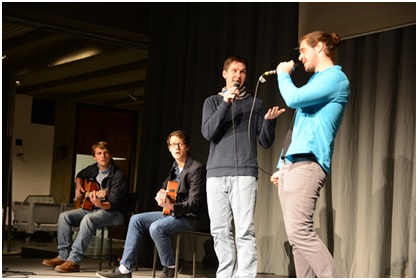
Jan 7, 2017 | Focolare Worldwide, Senza categoria
 An enriching evening of classical, dance, pop, contemplative, jazz, a musical and a buffet. The fourth edition of the benefit concert was promoted by the Focolare’s Youth for a United World in Vienna and by young people from Mor Efrem of the Syro-Orthodox community. Two hundred people showed up in spite of the freezing night temperatures of December, to support Syrian refugees. The “Singing Voices Choir” comprised of young people that included some Spanish speakers wished everyone a “Feliz Navidad” with song and dance. David Watzl presented Aktion Weitblick, a project that offers aid to refugees inside Europe and on its borders. He had spent two weeks at a refugee camp in Turkey where, with a group of volunteers from Aktion Weitblick, he organized afternoon games for children, classes in hygiene and many other activities. The Ishtar Syrian Dance Group brought the concert to a close with lively eastern dance that got the whole audience moving. Afterwards, a tasty buffet provided an opportunity for actors, visitors and refugees to mingle and know one another, and to plan future projects. The evening ended in a warm and fraternal atmosphere. Compiled by Young for Unity, Vienna, Austria
An enriching evening of classical, dance, pop, contemplative, jazz, a musical and a buffet. The fourth edition of the benefit concert was promoted by the Focolare’s Youth for a United World in Vienna and by young people from Mor Efrem of the Syro-Orthodox community. Two hundred people showed up in spite of the freezing night temperatures of December, to support Syrian refugees. The “Singing Voices Choir” comprised of young people that included some Spanish speakers wished everyone a “Feliz Navidad” with song and dance. David Watzl presented Aktion Weitblick, a project that offers aid to refugees inside Europe and on its borders. He had spent two weeks at a refugee camp in Turkey where, with a group of volunteers from Aktion Weitblick, he organized afternoon games for children, classes in hygiene and many other activities. The Ishtar Syrian Dance Group brought the concert to a close with lively eastern dance that got the whole audience moving. Afterwards, a tasty buffet provided an opportunity for actors, visitors and refugees to mingle and know one another, and to plan future projects. The evening ended in a warm and fraternal atmosphere. Compiled by Young for Unity, Vienna, Austria
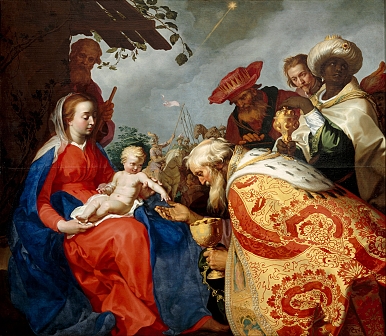
Jan 6, 2017 | Non categorizzato
 “Lord, this Christmas we entrust to You all the ones who seem far from You, the many who were once close to you but no longer are because of all the evils in the world that have taken them away from You. They don’t know You, but search for You with pure and sincere hearts. They don’t know that one day, one sweet day, You appeared on this earth as a baby. This Christmas, Lord, we entrust to You especially the ones without faith. We entrust them to You so that a ray of your Light might make its way to them, that because of their sincerity and good will the star that leads to You might shine at least for a moment so that they too will know the joy of those who acknowledge and love You. We entrust to You those who seem far from You, Lord, because we know that it was especially for these that You became a child.” Chiara Lubich, E torna Natale …, (Rome: Città Nuova, 2007), p. 59-60.
“Lord, this Christmas we entrust to You all the ones who seem far from You, the many who were once close to you but no longer are because of all the evils in the world that have taken them away from You. They don’t know You, but search for You with pure and sincere hearts. They don’t know that one day, one sweet day, You appeared on this earth as a baby. This Christmas, Lord, we entrust to You especially the ones without faith. We entrust them to You so that a ray of your Light might make its way to them, that because of their sincerity and good will the star that leads to You might shine at least for a moment so that they too will know the joy of those who acknowledge and love You. We entrust to You those who seem far from You, Lord, because we know that it was especially for these that You became a child.” Chiara Lubich, E torna Natale …, (Rome: Città Nuova, 2007), p. 59-60.

Jan 5, 2017 | Non categorizzato
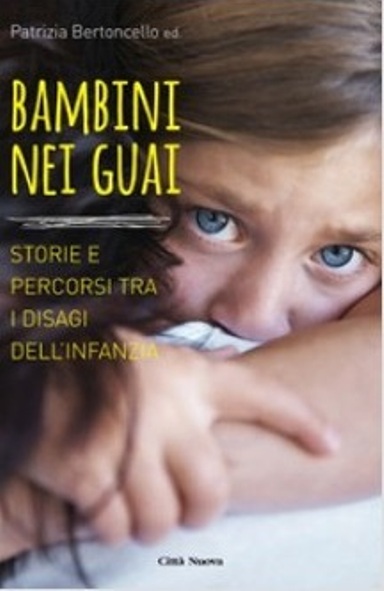 “A long stint as a primary school teacher – book curator, Patrizia Bertoncello, starts – soon led me to perceive those typical signs of distress which are more present in the peripheries than elsewhere. Often the children themselves talked about it. “Once upon a time there was a flower – Cristina, seven years old, wrote in class – her daddy-flower had left them and also mother-flower was not with him since she had so much to do and was very worried. She didn’t have time to listen to him. The flower was a rose with a thousand thorns. There were so many and pricked so much. The flower wanted to befriend the insects of the woods and the other flowers. But when they came close they got pricked so hard and ran away quickly, since she stung so much. And nothing could be done about it. In the end the rose was always alone and very sad.”(1) This is the lucid explanation she herself gave for those repeated pranks in class which isolated her from everyone. Like her, but with different problems, were the numerous children in distress, even in a world like ours that seems to be livable and protective, but not without contradictions and ambivalences weighing on the weaker sections of humanity. At times those institutions which in words advocate the rights of children, in fact, do little about it. Especially those children who cannot count on effective parents or long-lasting family relations are thus left in a sort of shadow zone, affective instability and often lacerating poverty. The lack of protection and real growth opportunities are conditions that certainly are not worthy of a society like ours. This is why I often asked myself how I could give a voice to these “invisible children,” and contribute to the building of a culture of protection and total respect for infancy.
“A long stint as a primary school teacher – book curator, Patrizia Bertoncello, starts – soon led me to perceive those typical signs of distress which are more present in the peripheries than elsewhere. Often the children themselves talked about it. “Once upon a time there was a flower – Cristina, seven years old, wrote in class – her daddy-flower had left them and also mother-flower was not with him since she had so much to do and was very worried. She didn’t have time to listen to him. The flower was a rose with a thousand thorns. There were so many and pricked so much. The flower wanted to befriend the insects of the woods and the other flowers. But when they came close they got pricked so hard and ran away quickly, since she stung so much. And nothing could be done about it. In the end the rose was always alone and very sad.”(1) This is the lucid explanation she herself gave for those repeated pranks in class which isolated her from everyone. Like her, but with different problems, were the numerous children in distress, even in a world like ours that seems to be livable and protective, but not without contradictions and ambivalences weighing on the weaker sections of humanity. At times those institutions which in words advocate the rights of children, in fact, do little about it. Especially those children who cannot count on effective parents or long-lasting family relations are thus left in a sort of shadow zone, affective instability and often lacerating poverty. The lack of protection and real growth opportunities are conditions that certainly are not worthy of a society like ours. This is why I often asked myself how I could give a voice to these “invisible children,” and contribute to the building of a culture of protection and total respect for infancy. 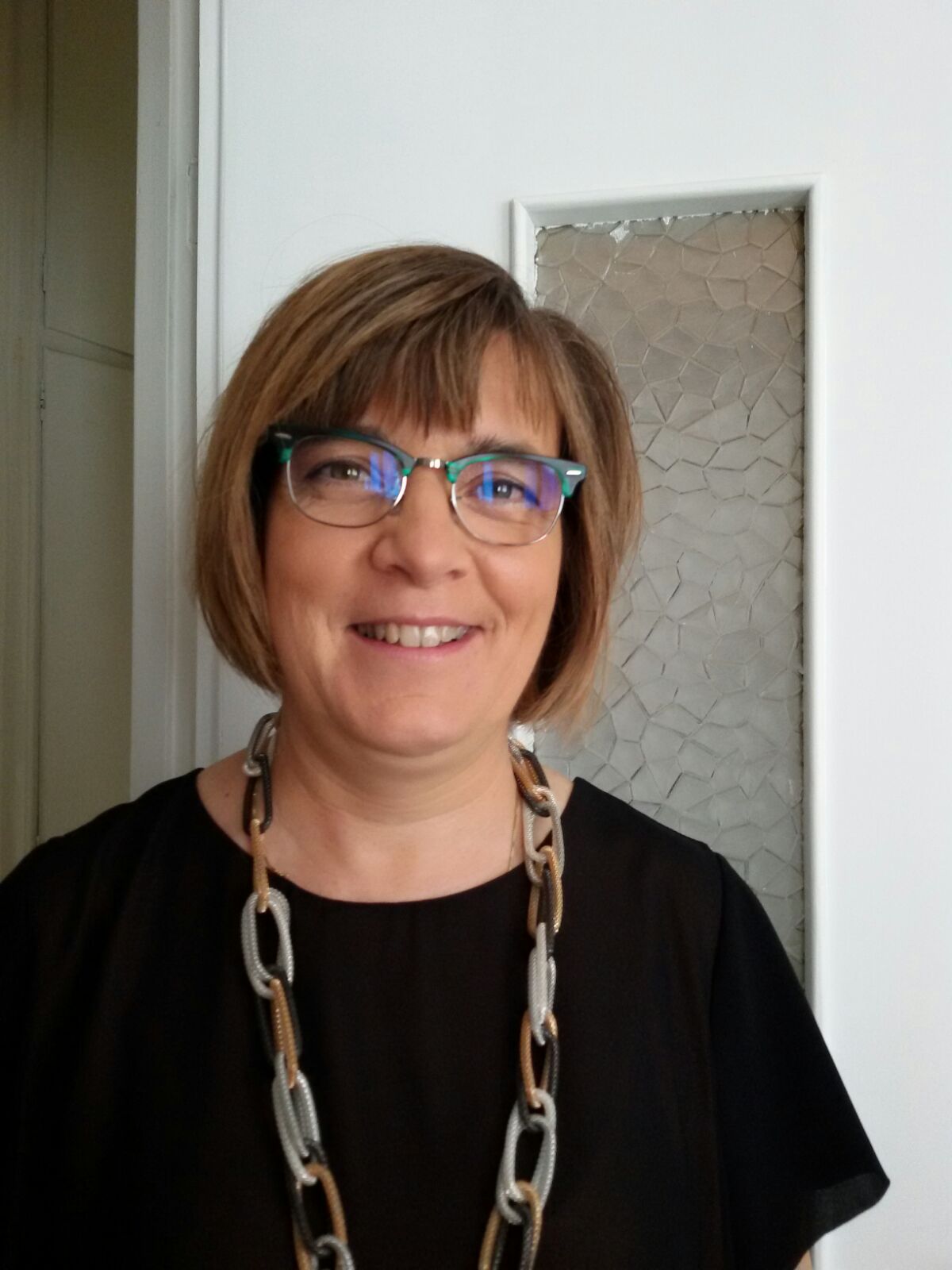 I started by trying to welcome some of my students with love, and slowly I saw that their tears dried up. I realised that to really “encounter” the world of the little ones, we have to approach each child with attention, and learn to see things through their eyes, making use of all our energies and skills to create important relationships. With other operators and professionals driven by the same educative style, I then tried to start up procedures in which the children and their families experience really educational relationships. From this cooperation the idea of a book came up, to narrate not only the stories of the “invisible children,” but also about good practices and redemptive pathways. “Children in Trouble,” said an oncologist, a social worker, a paediatrician and me, who curated the book, wants to bring out those seeds of hope and positive relations that become in some way, generators of resilience. Through that resource, many children when suitably aided are able to concretise and reach good recovery levels. The same happened to Emma. When she was eight years of age, overwhelmed by the split up of the family she had tried to commit suicide. Recently, after contacting me on Facebook, she wrote: “Dear teacher, how I miss you and the many moments we spent together! Do you remember when you read stories to us, taking on the voice of the characters? And the school trip to the sea? These will certainly never be erased from my heart and the love you showed me when all was dark around me. When I was in the hospital after the tragic event, you were there and didn’t ask me why I had done it. You were there, and that’s all. Then I returned to school with those wounds and you made everyone make those bracelets with coloured threads… but I knew that it was to help me hide those scars I didn’t want others to see…”(2) At the presentation of the book in universities and seminars, it was really surprising to see the attention and seriousness of the audience who started to take notice of that child next door, or the one who is begging in the subway or in a hospital ward. They were children who were invisible and now can return to being protagonists of their own future. By Anna Friso 1) – 2) – Patrizia Bertoncello – Bambini nei guai (Children in trouble) – Città Nuova Ed. 2015, p. 11 and p. 66
I started by trying to welcome some of my students with love, and slowly I saw that their tears dried up. I realised that to really “encounter” the world of the little ones, we have to approach each child with attention, and learn to see things through their eyes, making use of all our energies and skills to create important relationships. With other operators and professionals driven by the same educative style, I then tried to start up procedures in which the children and their families experience really educational relationships. From this cooperation the idea of a book came up, to narrate not only the stories of the “invisible children,” but also about good practices and redemptive pathways. “Children in Trouble,” said an oncologist, a social worker, a paediatrician and me, who curated the book, wants to bring out those seeds of hope and positive relations that become in some way, generators of resilience. Through that resource, many children when suitably aided are able to concretise and reach good recovery levels. The same happened to Emma. When she was eight years of age, overwhelmed by the split up of the family she had tried to commit suicide. Recently, after contacting me on Facebook, she wrote: “Dear teacher, how I miss you and the many moments we spent together! Do you remember when you read stories to us, taking on the voice of the characters? And the school trip to the sea? These will certainly never be erased from my heart and the love you showed me when all was dark around me. When I was in the hospital after the tragic event, you were there and didn’t ask me why I had done it. You were there, and that’s all. Then I returned to school with those wounds and you made everyone make those bracelets with coloured threads… but I knew that it was to help me hide those scars I didn’t want others to see…”(2) At the presentation of the book in universities and seminars, it was really surprising to see the attention and seriousness of the audience who started to take notice of that child next door, or the one who is begging in the subway or in a hospital ward. They were children who were invisible and now can return to being protagonists of their own future. By Anna Friso 1) – 2) – Patrizia Bertoncello – Bambini nei guai (Children in trouble) – Città Nuova Ed. 2015, p. 11 and p. 66
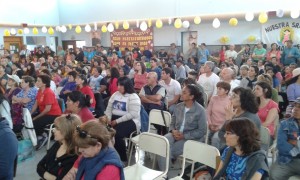
Jan 4, 2017 | Focolare Worldwide, Senza categoria
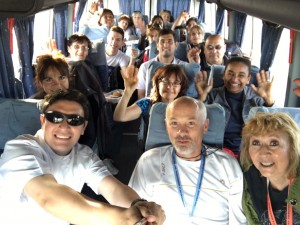 Per raggiungere Gan Gan, un villaggio che dista da Trelew poco più di 300 km, occorrono, bel tempo permettendo, 6/7 ore di viaggio. Si devono infatti affrontare i pendii della meseta di Chubut, che qui sono particolarmente impervi. In genere sono in pochi a visitare Gan Gan, che con i suoi 800 abitanti, a maggioranza indigeni mapuches e tehuelches, si è tristemente guadagnato la fama di “villaggio dimenticato da tutti”. Il 19 e 20 novembre scorso, proprio a Gan Gan si è tenuta una missione, con la partecipazione di persone venute da parrocchie e da realtà associative di Trelew. Durante il viaggio, la comitiva approfitta per rinsaldare la conoscenza reciproca e riflettere sul significato di questo spingersi verso i più poveri in risposta all’appello di papa Francesco. Ad attenderli, la festosa accoglienza della gente, con i suoi canti tipici, mentre un sacerdote li introduce nella realtà di questo tratto di altopiano dove sono ancora presenti miniere che vengono lavorate a cielo aperto, con gravi conseguenze per la contaminazione dell’ambiente. A fare gli onori di casa è un’anziana del villaggio, che nella sua lingua mapuche dà il benvenuto e presenta mons. Croxatto, vescovo ausiliare di Comodoro Rivadavia anch’egli venuto per la missione. Si inizia con la celebrazione di 5 battesimi. «Il sogno di uno di questi bambini, che ha già 4 anni – racconta una focolarina che fa parte della comitiva –, era di essere battezzato da papa Francesco. Il vescovo, ornato da tutti i paramenti, con grande amore gli spiega che il Papa è impossibilitato a venire fin quassù, ma che aveva conferito a lui il mandato di battezzarlo. Alla cerimonia è seguito un pranzo con cibo generosamente portato dalla gente e condiviso fra tutti». Poi i missionari iniziano a percorrere, in preghiera, l’intero villaggio: «Una processione che per gli scenari che si presentano ai nostri occhi – racconta un’altra focolarina presente – sembra una Via Crucis. La gente è disposta lungo la strada e racconta drammi di abbandono, solitudine, violenza, mancanza di giustizia: dalla mamma cui hanno ucciso il figlio, a quella il cui figlio è desaparecido, dalla poverissima casa di ricovero per anziani, alla cappella in desolante abbandono. Ciò che fa più impressione sono i volti della gente, anzitempo solcati da rughe di dolore e di stenti. Impressionante anche la quantità di persone che desiderano confessarsi. I sacerdoti ascoltano ininterrottamente le loro confessioni mentre la processione procede silenziosa. Altro momento forte è la messa della prima comunione con la cresima a 15 persone, alcune adulte e addirittura già nonne. A vedere come i sacerdoti si prodigano in questa realtà socialmente così lacerata, a come cercano di farsi vicini ai problemi della gente, tornano alla mente le parole di papa Francesco quando dice che i pastori debbono avere addosso l’odore delle loro pecore».
Per raggiungere Gan Gan, un villaggio che dista da Trelew poco più di 300 km, occorrono, bel tempo permettendo, 6/7 ore di viaggio. Si devono infatti affrontare i pendii della meseta di Chubut, che qui sono particolarmente impervi. In genere sono in pochi a visitare Gan Gan, che con i suoi 800 abitanti, a maggioranza indigeni mapuches e tehuelches, si è tristemente guadagnato la fama di “villaggio dimenticato da tutti”. Il 19 e 20 novembre scorso, proprio a Gan Gan si è tenuta una missione, con la partecipazione di persone venute da parrocchie e da realtà associative di Trelew. Durante il viaggio, la comitiva approfitta per rinsaldare la conoscenza reciproca e riflettere sul significato di questo spingersi verso i più poveri in risposta all’appello di papa Francesco. Ad attenderli, la festosa accoglienza della gente, con i suoi canti tipici, mentre un sacerdote li introduce nella realtà di questo tratto di altopiano dove sono ancora presenti miniere che vengono lavorate a cielo aperto, con gravi conseguenze per la contaminazione dell’ambiente. A fare gli onori di casa è un’anziana del villaggio, che nella sua lingua mapuche dà il benvenuto e presenta mons. Croxatto, vescovo ausiliare di Comodoro Rivadavia anch’egli venuto per la missione. Si inizia con la celebrazione di 5 battesimi. «Il sogno di uno di questi bambini, che ha già 4 anni – racconta una focolarina che fa parte della comitiva –, era di essere battezzato da papa Francesco. Il vescovo, ornato da tutti i paramenti, con grande amore gli spiega che il Papa è impossibilitato a venire fin quassù, ma che aveva conferito a lui il mandato di battezzarlo. Alla cerimonia è seguito un pranzo con cibo generosamente portato dalla gente e condiviso fra tutti». Poi i missionari iniziano a percorrere, in preghiera, l’intero villaggio: «Una processione che per gli scenari che si presentano ai nostri occhi – racconta un’altra focolarina presente – sembra una Via Crucis. La gente è disposta lungo la strada e racconta drammi di abbandono, solitudine, violenza, mancanza di giustizia: dalla mamma cui hanno ucciso il figlio, a quella il cui figlio è desaparecido, dalla poverissima casa di ricovero per anziani, alla cappella in desolante abbandono. Ciò che fa più impressione sono i volti della gente, anzitempo solcati da rughe di dolore e di stenti. Impressionante anche la quantità di persone che desiderano confessarsi. I sacerdoti ascoltano ininterrottamente le loro confessioni mentre la processione procede silenziosa. Altro momento forte è la messa della prima comunione con la cresima a 15 persone, alcune adulte e addirittura già nonne. A vedere come i sacerdoti si prodigano in questa realtà socialmente così lacerata, a come cercano di farsi vicini ai problemi della gente, tornano alla mente le parole di papa Francesco quando dice che i pastori debbono avere addosso l’odore delle loro pecore».  Nel viaggio di ritorno viene creato un gruppo whatsapp perché tutti vogliono che l’esperienza della missione non finisca qui. Molti dicono che a Gan Gan bisogna tornare, colpiti dall’esperienza forte e profonda di essersi sentiti – pastori e laici – un unico popolo di Dio. E per aver vissuto, insieme, l’esperienza di “uscire” come Chiesa per incontrare i più deboli. Toccante l’esperienza condivisa da uno dei sacerdoti che durante il pranzo comunitario era andato a far visita ai parenti di una signora di Trelew nativa di Gan Gan. «L’impatto è stato molto forte – racconta –. Erano due fratelli di 83 e 81 anni ambedue sordi: la signora al 90% e il fratello, non vedente al 100%. Vivono in una stanza di due metri per due, con i due letti disposti a L. La porta è quasi inesistente e il pavimento di nuda terra. Il freddo che entra dalla porta e quello che affiora dal pavimento, non fa che accentuare l’artrosi di cui soffre la donna. Nel cuore mi è rimasta una ferita. Penso che la missione, che pure è andata bene, non avrebbe senso se non facciamo qualcosa per dare dignità a questi indigenti». Alla sera già arrivano le prime risposte via whatsapp al parroco: «Abbiamo trovato i soldi per rifare la porta. Mandaci le misure». Fonte: Focolares Cono Sur online
Nel viaggio di ritorno viene creato un gruppo whatsapp perché tutti vogliono che l’esperienza della missione non finisca qui. Molti dicono che a Gan Gan bisogna tornare, colpiti dall’esperienza forte e profonda di essersi sentiti – pastori e laici – un unico popolo di Dio. E per aver vissuto, insieme, l’esperienza di “uscire” come Chiesa per incontrare i più deboli. Toccante l’esperienza condivisa da uno dei sacerdoti che durante il pranzo comunitario era andato a far visita ai parenti di una signora di Trelew nativa di Gan Gan. «L’impatto è stato molto forte – racconta –. Erano due fratelli di 83 e 81 anni ambedue sordi: la signora al 90% e il fratello, non vedente al 100%. Vivono in una stanza di due metri per due, con i due letti disposti a L. La porta è quasi inesistente e il pavimento di nuda terra. Il freddo che entra dalla porta e quello che affiora dal pavimento, non fa che accentuare l’artrosi di cui soffre la donna. Nel cuore mi è rimasta una ferita. Penso che la missione, che pure è andata bene, non avrebbe senso se non facciamo qualcosa per dare dignità a questi indigenti». Alla sera già arrivano le prime risposte via whatsapp al parroco: «Abbiamo trovato i soldi per rifare la porta. Mandaci le misure». Fonte: Focolares Cono Sur online
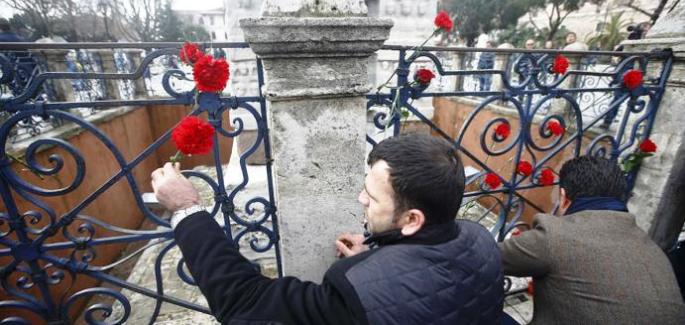
Jan 2, 2017 | Non categorizzato
«I woke up this morning, 1 January, ready to live this day and year which was just dawning – wrote a friend from Istanbul – and the first news that hit me was that of the attack in the Reina Club Disco in the night. The immediate sense of pain and bewilderment: It can’t be true!!! After a few hours I read the word of life of the month: “If we have really experienced His love, we cannot but love in turn, and step in with courage, wherever there is division, conflict, hatred, so as to bring harmony, peace and unity. Love enables us to launch our hearts beyond the obstacle….” This is precisely said for me, for us, who want to continue believing and live for universal peace and brotherhood. The wishes we exchanged during the day with many friends are pervaded with a mixture of discouragement and hope. No! We will not allow ourselves to be overcome by those who want to make us think that peace is a utopia. And from all over the world, many people make us feel that we are not alone». And it is really true: they are not alone. Though bewildered for the enactment of so much unjust violence, we are in fact, not alone in facing the challenge to work each day for the advent of peace. We want to respond to the appeal of Pope Francis, expressed in his message for the World Peace Day we have just celebrated: «In2017, let us undertake the commitment, with prayer and action, to become people who have banned violence from their hearts, words and gestures, and build non-violent communities that take care of our common home».
from Istanbul – and the first news that hit me was that of the attack in the Reina Club Disco in the night. The immediate sense of pain and bewilderment: It can’t be true!!! After a few hours I read the word of life of the month: “If we have really experienced His love, we cannot but love in turn, and step in with courage, wherever there is division, conflict, hatred, so as to bring harmony, peace and unity. Love enables us to launch our hearts beyond the obstacle….” This is precisely said for me, for us, who want to continue believing and live for universal peace and brotherhood. The wishes we exchanged during the day with many friends are pervaded with a mixture of discouragement and hope. No! We will not allow ourselves to be overcome by those who want to make us think that peace is a utopia. And from all over the world, many people make us feel that we are not alone». And it is really true: they are not alone. Though bewildered for the enactment of so much unjust violence, we are in fact, not alone in facing the challenge to work each day for the advent of peace. We want to respond to the appeal of Pope Francis, expressed in his message for the World Peace Day we have just celebrated: «In2017, let us undertake the commitment, with prayer and action, to become people who have banned violence from their hearts, words and gestures, and build non-violent communities that take care of our common home».
Jan 2, 2017 | Non categorizzato
https://vimeo.com/196291342 (Copyright 2016 © CSC Audiovisivi – All rights reserved)
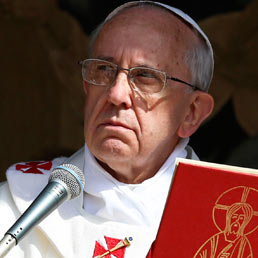
Jan 1, 2017 | Non categorizzato
 While the last century knew the devastation of two deadly World Wars, the threat of nuclear war and a great number of other conflicts, today, sadly, we find ourselves engaged in a horrifying world war fought piecemeal. […] wars in different countries and continents; terrorism, organized crime and unforeseen acts of violence; the abuses suffered by migrants and victims of human trafficking; and the devastation of the environment. […]Violence is not the cure for our broken world. Countering violence with violence leads at best to forced migrations and enormous suffering, because vast amounts of resources are diverted to military ends and away from the everyday needs of young people, families experiencing hardship, the elderly, the infirm and the great majority of people in our world. At worst, it can lead to the death, physical and spiritual, of many people, if not of all. To be true followers of Jesus today also includes embracing his teaching about nonviolence. […] When Mother Teresa received the Nobel Peace Prize in 1979, she clearly stated her own message of active nonviolence: ‘We in our family don’t need bombs and guns, to destroy to bring peace – just get together, love one another… And we will be able to overcome all the evil that is in the world.’ […] She bowed down before those who were spent, left to die on the side of the road, seeing in them their God-given dignity; she made her voice heard before the powers of this world, so that they might recognize their guilt for the crimes – the crimes! – of poverty they created. […]The decisive and consistent practice of nonviolence has produced impressive results. The achievements of Mahatma Gandhi and Khan Abdul Ghaffar Khan in the liberation of India, and of Dr Martin Luther King Jr in combating racial discrimination will never be forgotten. Women in particular are often leaders of nonviolence, as for example, was Leymah Gbowee and the thousands of Liberian women, who organized pray-ins and nonviolent protest that resulted in high-level peace talks to end the second civil war in Liberia. Such efforts on behalf of the victims of injustice and violence are not the legacy of the Catholic Church alone, but are typical of many religious traditions, for which “compassion and nonviolence are essential elements pointing to the way of life. I emphatically reaffirm that “no religion is terrorist. Violence profanes the name of God. Let us never tire of repeating: The name of God cannot be used to justify violence. Peace alone is holy. Peace alone is holy, not war! If violence has its source in the human heart, then it is fundamental that nonviolence be practised before all else within families. This is part of that joy of love which I described last March in my Exhortation Amoris Laetitia, in the wake of two years of reflection by the Church on marriage and the family. The family is the indispensable crucible in which spouses, parents and children, brothers and sisters, learn to communicate and to show generous concern for one another, and in which frictions and even conflicts have to be resolved not by force but by dialogue, respect, concern for the good of the other, mercy and forgiveness. I plead for disarmament and for the prohibition and abolition of nuclear weapons: nuclear deterrence and the threat of mutual assured destruction are incapable of grounding such an ethics. I plead with equal urgency for an end to domestic violence and to the abuse of women and children. In 2017, may we dedicate ourselves prayerfully and actively to banishing violence from our hearts, words and deeds, and to becoming nonviolent people and to building nonviolent communities that care for our common home. Nothing is impossible if we turn to God in prayer. Everyone can be an artisan of peace” Read the whole message.
While the last century knew the devastation of two deadly World Wars, the threat of nuclear war and a great number of other conflicts, today, sadly, we find ourselves engaged in a horrifying world war fought piecemeal. […] wars in different countries and continents; terrorism, organized crime and unforeseen acts of violence; the abuses suffered by migrants and victims of human trafficking; and the devastation of the environment. […]Violence is not the cure for our broken world. Countering violence with violence leads at best to forced migrations and enormous suffering, because vast amounts of resources are diverted to military ends and away from the everyday needs of young people, families experiencing hardship, the elderly, the infirm and the great majority of people in our world. At worst, it can lead to the death, physical and spiritual, of many people, if not of all. To be true followers of Jesus today also includes embracing his teaching about nonviolence. […] When Mother Teresa received the Nobel Peace Prize in 1979, she clearly stated her own message of active nonviolence: ‘We in our family don’t need bombs and guns, to destroy to bring peace – just get together, love one another… And we will be able to overcome all the evil that is in the world.’ […] She bowed down before those who were spent, left to die on the side of the road, seeing in them their God-given dignity; she made her voice heard before the powers of this world, so that they might recognize their guilt for the crimes – the crimes! – of poverty they created. […]The decisive and consistent practice of nonviolence has produced impressive results. The achievements of Mahatma Gandhi and Khan Abdul Ghaffar Khan in the liberation of India, and of Dr Martin Luther King Jr in combating racial discrimination will never be forgotten. Women in particular are often leaders of nonviolence, as for example, was Leymah Gbowee and the thousands of Liberian women, who organized pray-ins and nonviolent protest that resulted in high-level peace talks to end the second civil war in Liberia. Such efforts on behalf of the victims of injustice and violence are not the legacy of the Catholic Church alone, but are typical of many religious traditions, for which “compassion and nonviolence are essential elements pointing to the way of life. I emphatically reaffirm that “no religion is terrorist. Violence profanes the name of God. Let us never tire of repeating: The name of God cannot be used to justify violence. Peace alone is holy. Peace alone is holy, not war! If violence has its source in the human heart, then it is fundamental that nonviolence be practised before all else within families. This is part of that joy of love which I described last March in my Exhortation Amoris Laetitia, in the wake of two years of reflection by the Church on marriage and the family. The family is the indispensable crucible in which spouses, parents and children, brothers and sisters, learn to communicate and to show generous concern for one another, and in which frictions and even conflicts have to be resolved not by force but by dialogue, respect, concern for the good of the other, mercy and forgiveness. I plead for disarmament and for the prohibition and abolition of nuclear weapons: nuclear deterrence and the threat of mutual assured destruction are incapable of grounding such an ethics. I plead with equal urgency for an end to domestic violence and to the abuse of women and children. In 2017, may we dedicate ourselves prayerfully and actively to banishing violence from our hearts, words and deeds, and to becoming nonviolent people and to building nonviolent communities that care for our common home. Nothing is impossible if we turn to God in prayer. Everyone can be an artisan of peace” Read the whole message.
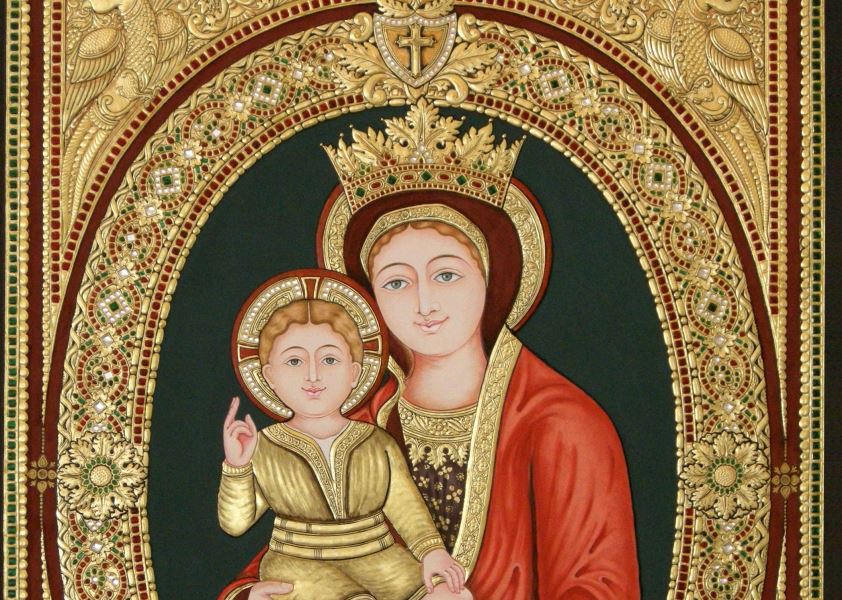
Dec 31, 2016 | Non categorizzato
 (…) History is all about wars and when we were children at school we almost learned that wars are good and holy, almost as if this is what protects our own land. (…) But if we hear the appeals of the Popes echoing in our hearts (…) we would hear their dread of war in the world and how their words, whether called for or not, appealed to leaders to try to appease anger and self-interest and to avert the terrible tragedy of war, through which everything is lost, while everything is gained by peace. This is because history is a succession of fratricidal conflicts between peoples who are brothers and sisters and who have been given a piece of land to cultivate and live on by the one Lord of the world. He blesses peace because he embodied peace. We see how one by one the Lord is conquering the hearts of his children of all nations, of all languages, transforming them into children of Love, Joy, Peace, Courage, and Strength. So we hope that the Lord will have mercy on this divided and wild world, on these peoples locked up in their own shell contemplating their own beauty – which is special for them – yet limited and inadequate, clinging on with clenched teeth to their own treasures, even those goods that could help other peoples where many are dying of hunger, and that he will break down the barriers and let charity flow continuously between one land and another, in a torrential flow of spiritual and material goods. We hope that the Lord will establish a new order in the world. He alone can make humanity a family and cultivate what is distinctive among peoples, so that the splendor of each people, placed at the service of the others, may shine out with the one light of life that beautifies the earthly homeland and makes it the waiting room of the eternal Homeland. Perhaps what I am saying sounds like a dream. Nonetheless – apart from the fact that if mutual love is the relationship among Christians, then the relationship among Christian nations cannot be other than mutual love because of the unchanging logic of the Gospel – there is a bond that already unites people strongly, proclaimed by the voice of the people and of all peoples, the people’s voice which so often is God’s voice. This hidden and protected bond in the heart of every nation is Mary. Who could take from the Brazilians the thought that Mary is the Queen of their land? And who would deny to the Portuguese that Mary is “Our Lady of Fatima”? Who would not allow the French the “beautiful little Lady of Lourdes”? Or the Poles Our Lady of Czestochowa? Or not let the English see their land as the “dowry of Mary”? And who could deny that Mary is the “Castellana of Italy” (…) All Christian nations have already proclaimed her their Queen, theirs and their children’s. But one thing is missing, and Mary cannot do it, so we have to help her. We need to collaborate so that Catholic peoples, united like many brothers and sisters, might go to her and together recognize her as Mother and Queen. We can enthrone her if, through our conversion, our prayers, and actions, we remove the veil that still covers her crown, (…) and lay down the piece of the world that is in our hands … at the feet of the greatest Queen that Heaven and earth can know. She is Queen of peoples, Queen of Saints, Queen of Angels, because when she was on earth she was able to sacrifice herself completely, the Handmaid of the Lord, and teach her children the way of unity, of embracing all peoples, so that earth might become as it is in Heaven. From Essential Writings p 222-233
(…) History is all about wars and when we were children at school we almost learned that wars are good and holy, almost as if this is what protects our own land. (…) But if we hear the appeals of the Popes echoing in our hearts (…) we would hear their dread of war in the world and how their words, whether called for or not, appealed to leaders to try to appease anger and self-interest and to avert the terrible tragedy of war, through which everything is lost, while everything is gained by peace. This is because history is a succession of fratricidal conflicts between peoples who are brothers and sisters and who have been given a piece of land to cultivate and live on by the one Lord of the world. He blesses peace because he embodied peace. We see how one by one the Lord is conquering the hearts of his children of all nations, of all languages, transforming them into children of Love, Joy, Peace, Courage, and Strength. So we hope that the Lord will have mercy on this divided and wild world, on these peoples locked up in their own shell contemplating their own beauty – which is special for them – yet limited and inadequate, clinging on with clenched teeth to their own treasures, even those goods that could help other peoples where many are dying of hunger, and that he will break down the barriers and let charity flow continuously between one land and another, in a torrential flow of spiritual and material goods. We hope that the Lord will establish a new order in the world. He alone can make humanity a family and cultivate what is distinctive among peoples, so that the splendor of each people, placed at the service of the others, may shine out with the one light of life that beautifies the earthly homeland and makes it the waiting room of the eternal Homeland. Perhaps what I am saying sounds like a dream. Nonetheless – apart from the fact that if mutual love is the relationship among Christians, then the relationship among Christian nations cannot be other than mutual love because of the unchanging logic of the Gospel – there is a bond that already unites people strongly, proclaimed by the voice of the people and of all peoples, the people’s voice which so often is God’s voice. This hidden and protected bond in the heart of every nation is Mary. Who could take from the Brazilians the thought that Mary is the Queen of their land? And who would deny to the Portuguese that Mary is “Our Lady of Fatima”? Who would not allow the French the “beautiful little Lady of Lourdes”? Or the Poles Our Lady of Czestochowa? Or not let the English see their land as the “dowry of Mary”? And who could deny that Mary is the “Castellana of Italy” (…) All Christian nations have already proclaimed her their Queen, theirs and their children’s. But one thing is missing, and Mary cannot do it, so we have to help her. We need to collaborate so that Catholic peoples, united like many brothers and sisters, might go to her and together recognize her as Mother and Queen. We can enthrone her if, through our conversion, our prayers, and actions, we remove the veil that still covers her crown, (…) and lay down the piece of the world that is in our hands … at the feet of the greatest Queen that Heaven and earth can know. She is Queen of peoples, Queen of Saints, Queen of Angels, because when she was on earth she was able to sacrifice herself completely, the Handmaid of the Lord, and teach her children the way of unity, of embracing all peoples, so that earth might become as it is in Heaven. From Essential Writings p 222-233
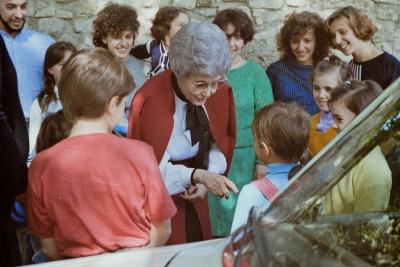
Dec 30, 2016 | Focolare Worldwide, Senza categoria
Download brochure with program Streaming event 11 March, 16:00-18:30 (CET, UTC+1)
A path o f life and thought to be shared throughout the year, at all latitudes. 50 years after its founding, there will be, in 2017 various local events and initiatives in various countries worldwide. A roadmap of life and thought in various phases will highlight the anthropological and universal value of the family in the perspective of “universal brotherhood,” and testify to the richness of social and cultural diversity, together with the ideal of unity concretised in family life. The central event will be held in Loppiano from 10 -12 March 2017. About 800 people from all over the world are expected to attend. The families will immerse themselves fully in the reality of the international town of the Focolare, and bear witness to Chiara’s dream in all the continents. In the morning there will be workshops for adults, youth, teenagers and children, held in collaboration with the parish movement, the gen3 and gen4 centres, the no-profit AFN and AMU. In the afternoon the meeting in the Auditorium will be aired via live streaming and will highlight the experts of family themes, who will be participating in the Cultural Seminar to be held at the Sophia University (10 -11 March 2017). This seminar with its characteristic universal outlook will give rise to the future Study Center on the family, with the objective of enhancing the contribution of the spirituality of unity to the family in the challenges it has to face today. For information: www.famiglienuove.org famiglienuove@focolare.org
f life and thought to be shared throughout the year, at all latitudes. 50 years after its founding, there will be, in 2017 various local events and initiatives in various countries worldwide. A roadmap of life and thought in various phases will highlight the anthropological and universal value of the family in the perspective of “universal brotherhood,” and testify to the richness of social and cultural diversity, together with the ideal of unity concretised in family life. The central event will be held in Loppiano from 10 -12 March 2017. About 800 people from all over the world are expected to attend. The families will immerse themselves fully in the reality of the international town of the Focolare, and bear witness to Chiara’s dream in all the continents. In the morning there will be workshops for adults, youth, teenagers and children, held in collaboration with the parish movement, the gen3 and gen4 centres, the no-profit AFN and AMU. In the afternoon the meeting in the Auditorium will be aired via live streaming and will highlight the experts of family themes, who will be participating in the Cultural Seminar to be held at the Sophia University (10 -11 March 2017). This seminar with its characteristic universal outlook will give rise to the future Study Center on the family, with the objective of enhancing the contribution of the spirituality of unity to the family in the challenges it has to face today. For information: www.famiglienuove.org famiglienuove@focolare.org
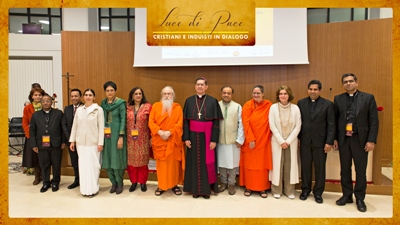
Dec 30, 2016 | Non categorizzato
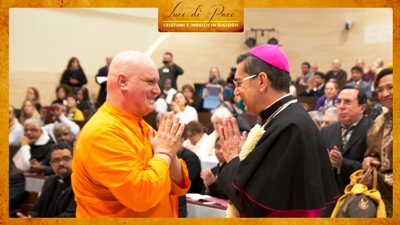 “So is craving, so is anger, they arise from the Rajas, the passion of the senses that devours everything” (Bhagavad Gita, 3:37)[1]. These words were chosen by Paramahamsa Svami Yogananda Ghiri, honorary president of the Italian Hindu Union (UII), in his welcome speech at the first Christian-Hindu Conference that crowded the main hall of the Pontifical Gregorian University on December 6, 20016. The conference was opened by Cardinal Jean-Louis Tauran, president of the Pontifical Council for Interreligious Dialogue. He was the promoter of the event in collaboration with the UII, the Italian Bishops Conference, Religions for Peace and the Focolare Movement. The cardinal expressed his joy for this moment of dialogue that was so promising and hopeful: “With our interior light that consumes and illumines, we will be able to direct our every step along the path of Peace.” Christians and Hindus were equally represented by 300 people who were animated by a desire for communion and understanding. Like emblems, a Lamp and Crucifix adorned the hall, both symbols of light. Light and Peace was the title of the day spent in dialogue and in the search of Peace. The words of Bishop Paul Gallagher, Secretary for [Vatican] Relations with States, were quite meaningful. After recalling the many conflicts around the world, he appealed to the international community to “overcome the logic of individualism, competition and the desire to be first” and asked that as soon as possible an “ethic of solidarity” be promoted. The presentation by Dr Naso from Sapienza University of Rome was also very significant. After presenting the data on the conflicts that had begun for religious reasons, he recalled that in many cases it was precisely the faith communities that became mediators in the peace process: in Norther Ireland, South Africa and Mozambique…. This makes one hope that “religions can really play a constructive role in conflict situations.”
“So is craving, so is anger, they arise from the Rajas, the passion of the senses that devours everything” (Bhagavad Gita, 3:37)[1]. These words were chosen by Paramahamsa Svami Yogananda Ghiri, honorary president of the Italian Hindu Union (UII), in his welcome speech at the first Christian-Hindu Conference that crowded the main hall of the Pontifical Gregorian University on December 6, 20016. The conference was opened by Cardinal Jean-Louis Tauran, president of the Pontifical Council for Interreligious Dialogue. He was the promoter of the event in collaboration with the UII, the Italian Bishops Conference, Religions for Peace and the Focolare Movement. The cardinal expressed his joy for this moment of dialogue that was so promising and hopeful: “With our interior light that consumes and illumines, we will be able to direct our every step along the path of Peace.” Christians and Hindus were equally represented by 300 people who were animated by a desire for communion and understanding. Like emblems, a Lamp and Crucifix adorned the hall, both symbols of light. Light and Peace was the title of the day spent in dialogue and in the search of Peace. The words of Bishop Paul Gallagher, Secretary for [Vatican] Relations with States, were quite meaningful. After recalling the many conflicts around the world, he appealed to the international community to “overcome the logic of individualism, competition and the desire to be first” and asked that as soon as possible an “ethic of solidarity” be promoted. The presentation by Dr Naso from Sapienza University of Rome was also very significant. After presenting the data on the conflicts that had begun for religious reasons, he recalled that in many cases it was precisely the faith communities that became mediators in the peace process: in Norther Ireland, South Africa and Mozambique…. This makes one hope that “religions can really play a constructive role in conflict situations.”  The report by Hindu psychologist Sangita Dubey on cultural differences and on the effects of migration on the psyche due to the different diet, language and mentality was lively and supported with personal experiences. “The challenge of dialogue,” stressed Svamini Hamsananda Ghiri (UII) in his presentation of the Hindu perspective, “is fear, indifference, fundamentalism and suspiscion of the other;” to pursue the common good it is necessary to “see the other as a brother and sister because they are generated by a Father God.” Paul Trianni, the University of St. Anselm, who was asked to give a Christian perspective, he concludes: “When two ancient civilizations encounter one another, two such profound spiritualities, they cannot but recognize the great wealth.” Two experiences of dialogue helped gave substance to the words that had been said: Fr Cesare Bovinelli, Camaldolese monk, recalled the great harmony that existed when it came to themes of environment at Assisi. A young person from the Focolare, Aileen Carneiro of India, described the many activities that were carried out between Hindu and Christian youth. Particularly striking was the synergy with the Ghandian Shanti Ashram group of Coimbatore, who started a project for solving poverty, following the approach of the Economy of Communion. Aileen explained that the dialogue of life must be held up, putting into practice the Golden Rule: “Do to others as you would have them do to you.” La Conferenza si è conclusa con uno spazio culturale di poesie, canti e danze sacre indù, in cui l’arte è diventata ulteriore motivo di comunione, degna cornice alla lettura delThe conference ended with presentation of poetry, Hindu sacred dance and song, in which art became a catalyst of communion, a worthy context for the reading of the Joint Statement. Anna Friso [1] (Our translation from Italian)
The report by Hindu psychologist Sangita Dubey on cultural differences and on the effects of migration on the psyche due to the different diet, language and mentality was lively and supported with personal experiences. “The challenge of dialogue,” stressed Svamini Hamsananda Ghiri (UII) in his presentation of the Hindu perspective, “is fear, indifference, fundamentalism and suspiscion of the other;” to pursue the common good it is necessary to “see the other as a brother and sister because they are generated by a Father God.” Paul Trianni, the University of St. Anselm, who was asked to give a Christian perspective, he concludes: “When two ancient civilizations encounter one another, two such profound spiritualities, they cannot but recognize the great wealth.” Two experiences of dialogue helped gave substance to the words that had been said: Fr Cesare Bovinelli, Camaldolese monk, recalled the great harmony that existed when it came to themes of environment at Assisi. A young person from the Focolare, Aileen Carneiro of India, described the many activities that were carried out between Hindu and Christian youth. Particularly striking was the synergy with the Ghandian Shanti Ashram group of Coimbatore, who started a project for solving poverty, following the approach of the Economy of Communion. Aileen explained that the dialogue of life must be held up, putting into practice the Golden Rule: “Do to others as you would have them do to you.” La Conferenza si è conclusa con uno spazio culturale di poesie, canti e danze sacre indù, in cui l’arte è diventata ulteriore motivo di comunione, degna cornice alla lettura delThe conference ended with presentation of poetry, Hindu sacred dance and song, in which art became a catalyst of communion, a worthy context for the reading of the Joint Statement. Anna Friso [1] (Our translation from Italian)
Dec 29, 2016 | Non categorizzato
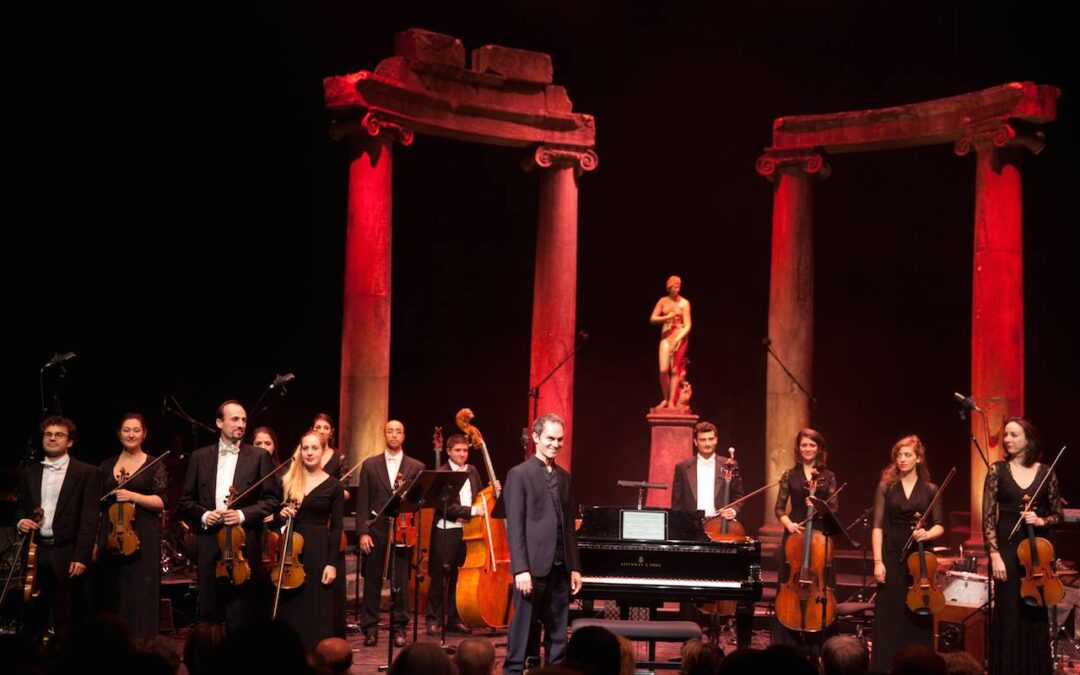
Dec 28, 2016 | Focolare Worldwide, Senza categoria
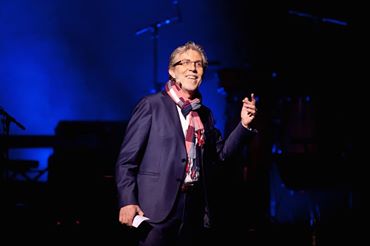
Rocco Femia, Director of the Radici cultural magazine
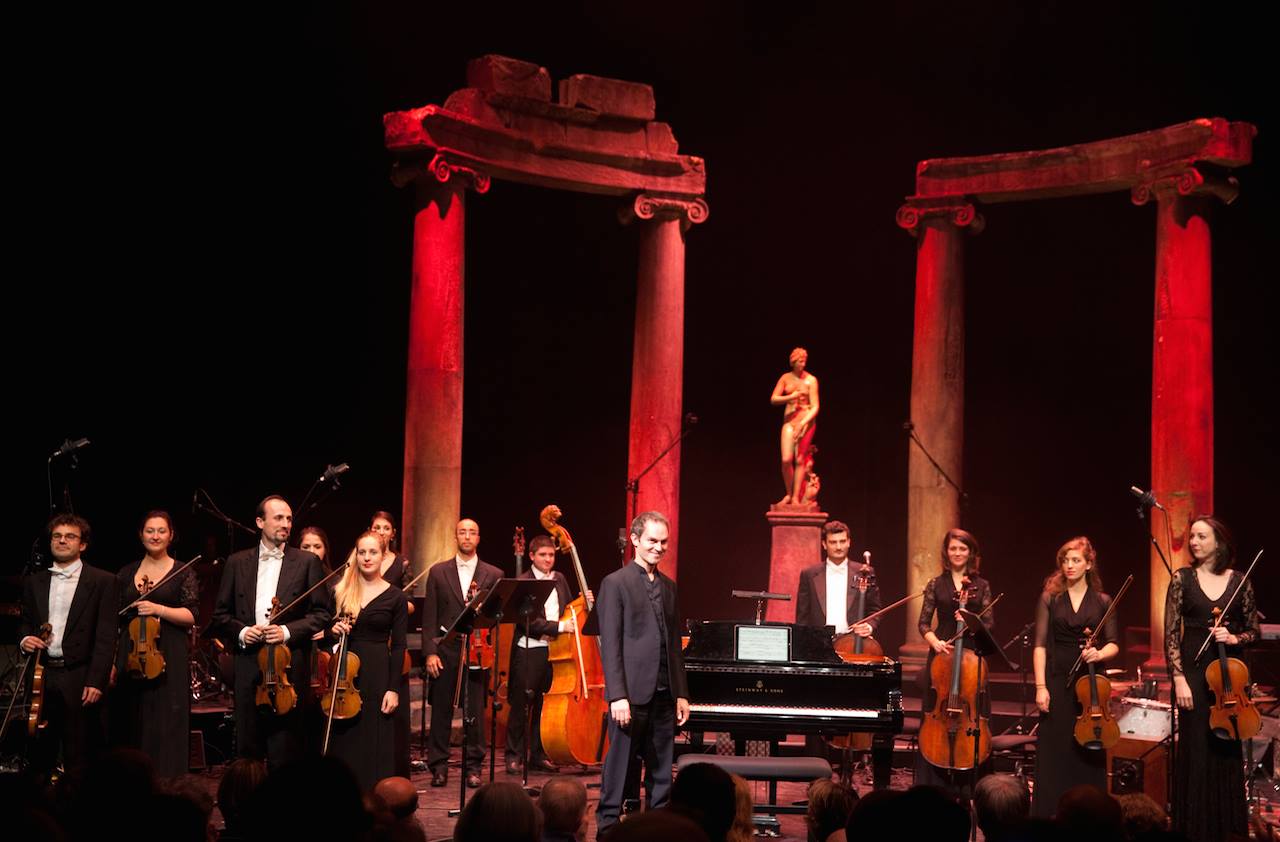 Fifty artists performed for free, confirming the strong sympathy is being felt for those who have suffered great loss. Artists included the OCCITANIA Chamber Music Ensemble, with music of Bach; the popular Italian song group, Incanto, which travels around the world with its musical titled ITALIANI, when we were the immigrants; The DALTIN Trio; Vicente and Rafael PRADAL from Spain; flemenco virtuoso guitarist Kiko Ruiz; the NACCARATO Jazz Trio; mandolin player Julien Martineau; the musical poems of the great Faber, performed by the Fabrizio DE ANDRÈ Band; the unforgettable music from the Italian films and the great finale and standing ovation for Cécile LIMAL who led La vita è bella… by Roberto Benigni. The music alternated with lively presentations by Rocco Femia, Director of RADICI magazine and by television journalists Marina Lorenzo and Patrick Noviello. In his thank-you speech, the director of RADICI did not want to forget anyone, conscious of the deep personal commitment of each person to the success of the event: from the technical crew to the artistic director, to the sound director, to the lights. Then there were the Deputy Mayor Francis Grass, the Italian Console to Toulouse, Fabrizio Mazza, the sponsors, benefactors, the media, and so on. Everyone “won the battle” together. And that is what I experienced as I shared a supper with the artists and technical staff after the concert. There is a strong bond among us, comprised of mutual trust, esteem, shared talent and solidarity – and a strong desire to make the world a more beautiful place. And I joyfully realized that this bond also included me and UWP. So, I wouldn’t be surprised if I discover that what I just experienced is only the beginning of a long and beneficial relationship of collaboration. In fact, when presenting the United World Project (UWP) during the concert, Rocco Femia highlighted the slogan of the RImPresa Project, to sum up what everyone seemed to be feeling: Hope vibrates; the future isn’t trembling.” Gustavo Clariá
Fifty artists performed for free, confirming the strong sympathy is being felt for those who have suffered great loss. Artists included the OCCITANIA Chamber Music Ensemble, with music of Bach; the popular Italian song group, Incanto, which travels around the world with its musical titled ITALIANI, when we were the immigrants; The DALTIN Trio; Vicente and Rafael PRADAL from Spain; flemenco virtuoso guitarist Kiko Ruiz; the NACCARATO Jazz Trio; mandolin player Julien Martineau; the musical poems of the great Faber, performed by the Fabrizio DE ANDRÈ Band; the unforgettable music from the Italian films and the great finale and standing ovation for Cécile LIMAL who led La vita è bella… by Roberto Benigni. The music alternated with lively presentations by Rocco Femia, Director of RADICI magazine and by television journalists Marina Lorenzo and Patrick Noviello. In his thank-you speech, the director of RADICI did not want to forget anyone, conscious of the deep personal commitment of each person to the success of the event: from the technical crew to the artistic director, to the sound director, to the lights. Then there were the Deputy Mayor Francis Grass, the Italian Console to Toulouse, Fabrizio Mazza, the sponsors, benefactors, the media, and so on. Everyone “won the battle” together. And that is what I experienced as I shared a supper with the artists and technical staff after the concert. There is a strong bond among us, comprised of mutual trust, esteem, shared talent and solidarity – and a strong desire to make the world a more beautiful place. And I joyfully realized that this bond also included me and UWP. So, I wouldn’t be surprised if I discover that what I just experienced is only the beginning of a long and beneficial relationship of collaboration. In fact, when presenting the United World Project (UWP) during the concert, Rocco Femia highlighted the slogan of the RImPresa Project, to sum up what everyone seemed to be feeling: Hope vibrates; the future isn’t trembling.” Gustavo Clariá
Dec 28, 2016 | Non categorizzato, Word of
A group of primary school children in Rome tried to put this Word of Life into practice: “Yesterday evening my mother and I went out for a meal with one of my Mum’s friends. I ordered a side dish with the meal, and then I wanted something for dessert. My mother said no. I was about to be angry, but I remembered that Jesus was in my mother so I just smiled instead.” “I went home after a tiring day. While I was watching television my brother took the remote control from me. I was very angry with him, but then I calmed down and let him watch TV.” “Today I answered back angrily when my father spoke to me. I saw that he was not happy about this, so I said sorry, and he forgave me.” Although there may not have been an exact link between the experiences these children told and the Word of Life they were living at the time, the push to love is itself the fruit of the Gospel put into practice. Any Word of Life we set out to live has the same effect. It changes our lives and puts the desire to be attentive to other people’s needs into our hearts, enabling us to be at the service of our brothers and sisters. It could not be otherwise: welcoming the Word and living it gives life to Jesus in us and helps us to act like him. This is what Paul is saying in this letter to the Corinthians. What urged St Paul to announce the Gospel and dedicate himself to the unity of his communities was the deep experience he had had with Jesus. He had felt loved and saved by Jesus, who had entered into his life to the point that nothing and no one could separate him from Jesus again. It was no longer he who lived, because Jesus lived in him. The thought that the Lord had loved him to the point of giving his life astounded Paul and stirred him into action. Its irresistible power urged him to do the same thing with the same love. Does the love of Christ urge us on with the same zeal? If we have truly experienced his love, we cannot fail to love in turn and courageously enter places where there is division, conflict and hatred so as to bring agreement, peace and unity. Love enables us to bring love beyond all obstacles, so as to create real connections with people, through understanding and sharing, and to find solutions together. It is not a question of choosing this or not. Unity must be pursued at all costs, without letting ourselves be hindered by false prudence, by difficulties or by potential clashes. Such an approach is urgently needed above all in ecumenism. This Word of Life has been chosen for this month in which we celebrate the Week of Prayer for Christian Unity. It can be lived together by Christians from different churches and communities so that we will all feel urged on by the love of Christ to seek each other out so as to re- establish unity. When Chiara Lubich spoke at the opening of the Second Ecumenical European Assembly at Graz, Austria on June 23, 1997, she affirmed, “An authentic Christian who wants reconciliation is someone who knows how to love others with God’s own charity, which makes us see Christ in each person, a charity that goes out towards all people (Jesus died for the whole human race). This charity always takes the initiative and enables us to love each person as ourselves, making us one with our brothers and sisters: in sufferings, joys, etc. The Churches too should love with this love.” May we too live the radicality of love with the simplicity and seriousness of those schoolchildren in Rome.
Fr. Fabio Ciardi, OMI
Each month the Focolare offers a Scripture passage as a guide and inspiration for daily living. Ever since the Focolare’s earliest years, founder Chiara Lubich (1920– 2008) wrote her own commentaries each month. Now Fr. Fabio Ciardi, OMI, theologian and close collaborator of Lubich, heads a group of scripture experts who have been entrusted with the task of writing the Word of Life commentaries, reflecting her thoughts and her spirituality of unity. This Word of Life is translated into 96 different languages and reaches several million people worldwide through the media. This monthly leaflet is also a supplement to Living City, the Focolare magazine (livingcitymagazine.com). For information and to subscribe to this leaflet or to the magazine, write to: Living City, 202 Comforter Blvd, Hyde Park, NY 12538; tel: 845-229-0496; e-mail: livingcity@livingcitymagazine.com. Visit focolare.org (international) or focolare.us (U.S.). © 2017 by Living City of the Focolare Movement, Inc. Read more: Lubich, Chiara. The Art of Loving. New City Press: Hyde Park, New York, 2010. Lubich, Chiara. “False Prudence,” Meditations. New City Press: Hyde Park, New York, 2005, p.33.
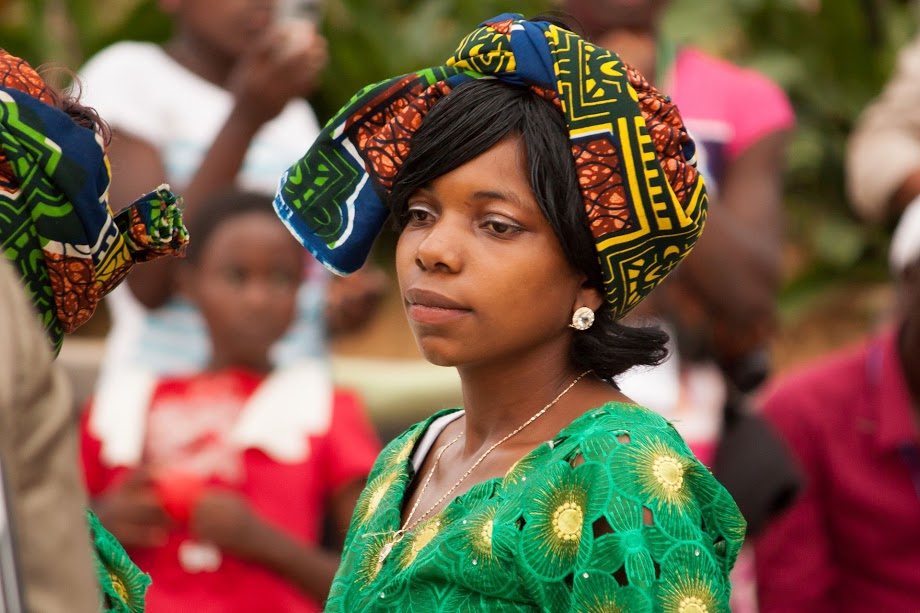
Dec 27, 2016 | Non categorizzato
Memories, gratitude and commitment were the keypoints of the celebrations in Fontem, Cameroon, for the 50th anniversary of the arrival of several focolarini in the Cameroon forest to begin a work in close harmony with the local Bangwa peo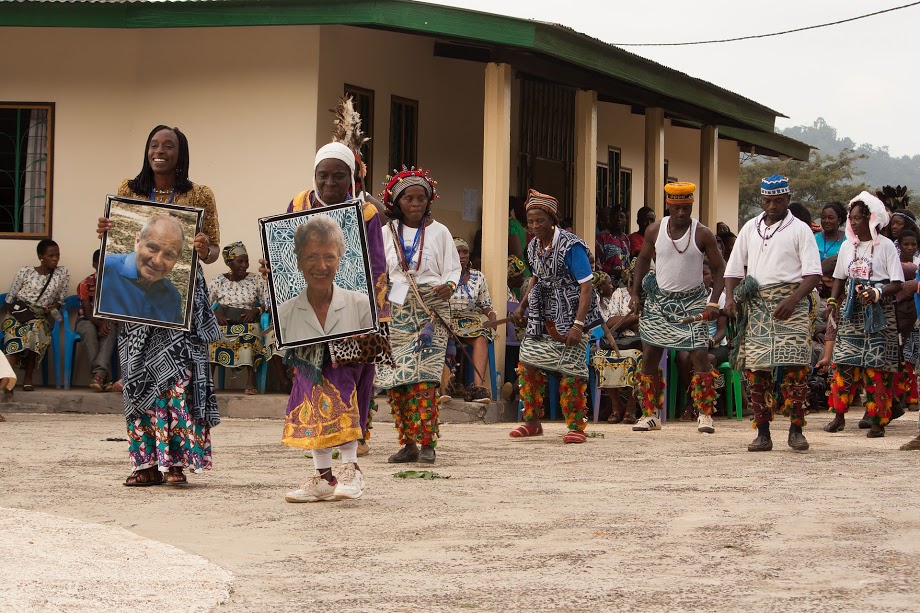 ple. In the opening remarks of civil and traditional authorities, and Focolare co-president Jesús Morán, the importance of those beginnings was remembered as well as the notable development that followed. The method used by the focolarini was also emphasized: dialogue with the local population and its traditional religion. This approach, which is typical of the Focolare, gave rise here and throughout the world to many positive experiences of interreligious dialogue, as Rita Mussallem from the Focolare’s Centre for Dialogue remembered in her address. The keynote address was given by Bishop Nkea Andrew, Bishop of the Mamfe Diocese who, through his own personal experience as a Bangwa, confirmed the precious value of this dialogue and its total conformity to the Gospel. One young Austrian priest who attended the events, commented: “The harmony between the values of African culture and Christian values is quite striking.” On the second day, which was dedicated to testimonies, one of the first nurses and first doctors emphasized how the close collaboration with the local people was a light for providing care to the sick that took into account the needs of both body and spirit. New and lasting friendships were born that brought healing. There were touching testimonies of accompanying people in the final moments of life. This was followed by the testimonies of several ex-students of the College: a police comissioner, a young priest and a nurse. They all said that along with the excellent scientific knowledge, they were also provided the possiblity of discovering those human and spiritual values that now make them happy human beings and appreciated by the Church and society. There was a presentation of the Economy of Communion in Cameroon, a project that will soon be launching an international conference on the continent. The third day was dedicated to giving thanks. Several presentations remembered all those, among the first, who gave their lives for Fontem like Piero Pasolini, Dr Lucio da Soglio, and so on…. Since they considered the others to be their equals, their work was marked by reciprocity and not assistenzialism. This was followed by traditional dances from five Fondoms (territories) that comprise Lebialem Division. More than 2,500 people were then served lunch thanks to the love of many “mamme” who had worked tirelessly, day and night, in the days leading up to the event. In the evening, there was a very moving musical presented by the children and students, which recounted the story of Fontem.
ple. In the opening remarks of civil and traditional authorities, and Focolare co-president Jesús Morán, the importance of those beginnings was remembered as well as the notable development that followed. The method used by the focolarini was also emphasized: dialogue with the local population and its traditional religion. This approach, which is typical of the Focolare, gave rise here and throughout the world to many positive experiences of interreligious dialogue, as Rita Mussallem from the Focolare’s Centre for Dialogue remembered in her address. The keynote address was given by Bishop Nkea Andrew, Bishop of the Mamfe Diocese who, through his own personal experience as a Bangwa, confirmed the precious value of this dialogue and its total conformity to the Gospel. One young Austrian priest who attended the events, commented: “The harmony between the values of African culture and Christian values is quite striking.” On the second day, which was dedicated to testimonies, one of the first nurses and first doctors emphasized how the close collaboration with the local people was a light for providing care to the sick that took into account the needs of both body and spirit. New and lasting friendships were born that brought healing. There were touching testimonies of accompanying people in the final moments of life. This was followed by the testimonies of several ex-students of the College: a police comissioner, a young priest and a nurse. They all said that along with the excellent scientific knowledge, they were also provided the possiblity of discovering those human and spiritual values that now make them happy human beings and appreciated by the Church and society. There was a presentation of the Economy of Communion in Cameroon, a project that will soon be launching an international conference on the continent. The third day was dedicated to giving thanks. Several presentations remembered all those, among the first, who gave their lives for Fontem like Piero Pasolini, Dr Lucio da Soglio, and so on…. Since they considered the others to be their equals, their work was marked by reciprocity and not assistenzialism. This was followed by traditional dances from five Fondoms (territories) that comprise Lebialem Division. More than 2,500 people were then served lunch thanks to the love of many “mamme” who had worked tirelessly, day and night, in the days leading up to the event. In the evening, there was a very moving musical presented by the children and students, which recounted the story of Fontem. On the fourth day, the presence of Our Lady Seat of Wisdom College in Fontem was celebrated. The bishop of Mamfe exhorted the many ex-students who had come from many countries of the world, to be aware of the gifts they had received and have made them ambassadors of unity wherever they may go. Charles Tasong, who was among the first Bangwa to know the Focolare commented: “During the Cry Die (commemorating Lucio Soglio, Lino D’armi and Doris Ronacher, who died recently after spending all their energy on Fontem), I realized that there is no longer the Focolare and the Bangwa; no longer the whites on one side, the blacks on the other – but one family. I want to embrace the challenge of bringing forward in my own life the powerful reality of unity that we experienced here in Fontem.” Biagio Sparapano
On the fourth day, the presence of Our Lady Seat of Wisdom College in Fontem was celebrated. The bishop of Mamfe exhorted the many ex-students who had come from many countries of the world, to be aware of the gifts they had received and have made them ambassadors of unity wherever they may go. Charles Tasong, who was among the first Bangwa to know the Focolare commented: “During the Cry Die (commemorating Lucio Soglio, Lino D’armi and Doris Ronacher, who died recently after spending all their energy on Fontem), I realized that there is no longer the Focolare and the Bangwa; no longer the whites on one side, the blacks on the other – but one family. I want to embrace the challenge of bringing forward in my own life the powerful reality of unity that we experienced here in Fontem.” Biagio Sparapano
Dec 26, 2016 | Non categorizzato
https://vimeo.com/195193687 It all started with a group of young girls and a green drum kit … The spark that gave life to Gen Verde was something unusual not so much because of the green drum kit but the wish that came with it… “to make a lot of noise”. That’s right. Blast it out, making the ideal of unity heard by all through music and performances, that is the soul of our whole life. That spark sped off, reaching all corners of the world and touching countless lives. Unity is best expressed when we sing it together. That’s what they wanted to say through this song. It tells it like it is. That message is just as relevant today as it was 50 years ago when it all began: each one of us is a spark. So let’s stand up, wherever we are, and turn up the volume of unity. Gen Verde – International Performing Arts Group Gen Rosso International Performing Arts Group
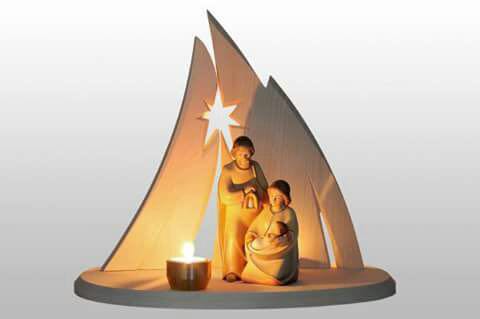
Dec 24, 2016 | Non categorizzato
 Christmas, Christmas, how often have we celebrated you with pure joy and unmatched ardour! But you find our hearts so frozen by the coldness of this world, that you cannot touch them as you would with your mysterious extraordinary message: GOD LOVES US, one by one and all together. This Love wrapped us round so completely that the Blessed Trinity resolved to send among us the Son of God made man, so our brief sojourn on this earth could be illuminated from now on by the Light that does not fade, and the absurdity of death in this life be transformed into a simple passing into life more full and eternal! We hope this year at least, that You, Christmas, may say to our hearts all you wish to say and find us ready, here and now to hear your voice.
Christmas, Christmas, how often have we celebrated you with pure joy and unmatched ardour! But you find our hearts so frozen by the coldness of this world, that you cannot touch them as you would with your mysterious extraordinary message: GOD LOVES US, one by one and all together. This Love wrapped us round so completely that the Blessed Trinity resolved to send among us the Son of God made man, so our brief sojourn on this earth could be illuminated from now on by the Light that does not fade, and the absurdity of death in this life be transformed into a simple passing into life more full and eternal! We hope this year at least, that You, Christmas, may say to our hearts all you wish to say and find us ready, here and now to hear your voice.
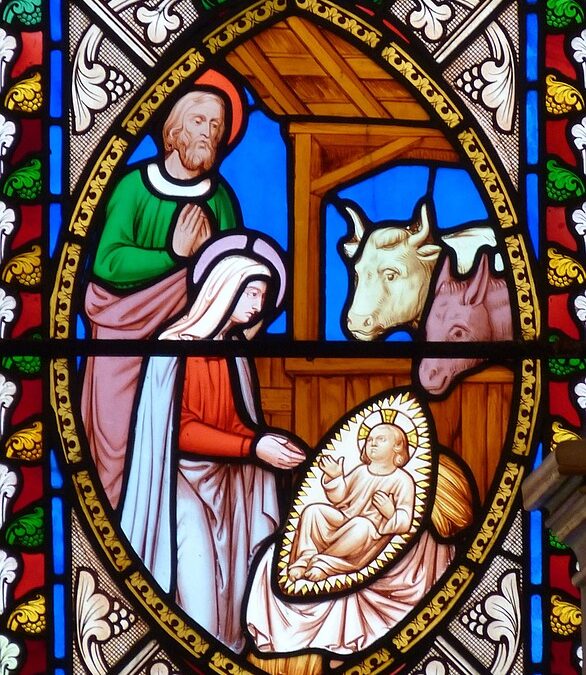
Dec 23, 2016 | Non categorizzato
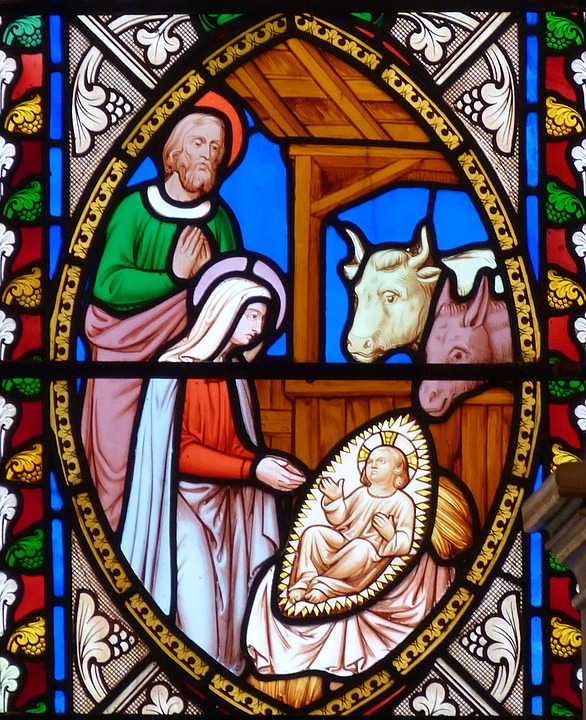 |
Christmas reminds us, along with the Scripture passage that we’ve chosen to live this month, that “He comes to save us” (Is 35:4). Save us from what? Among other things, our indifference towards those who suffer. My wish for you this Christmas is that we may all go beyond ourselves and welcome the other, all the others: those in need, those who have left their own lands because of hunger and war, those who are lonely, marginalized, imprisoned….. My wish for all of us is that after having experienced God’s love that saves us, we will reach out to save those around us. Happy Christmas everybody!
Maria Voce
|
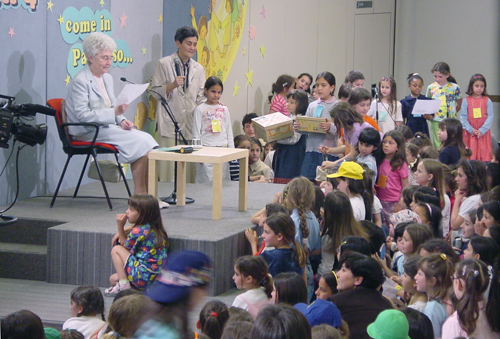
Dec 22, 2016 | Focolare Worldwide
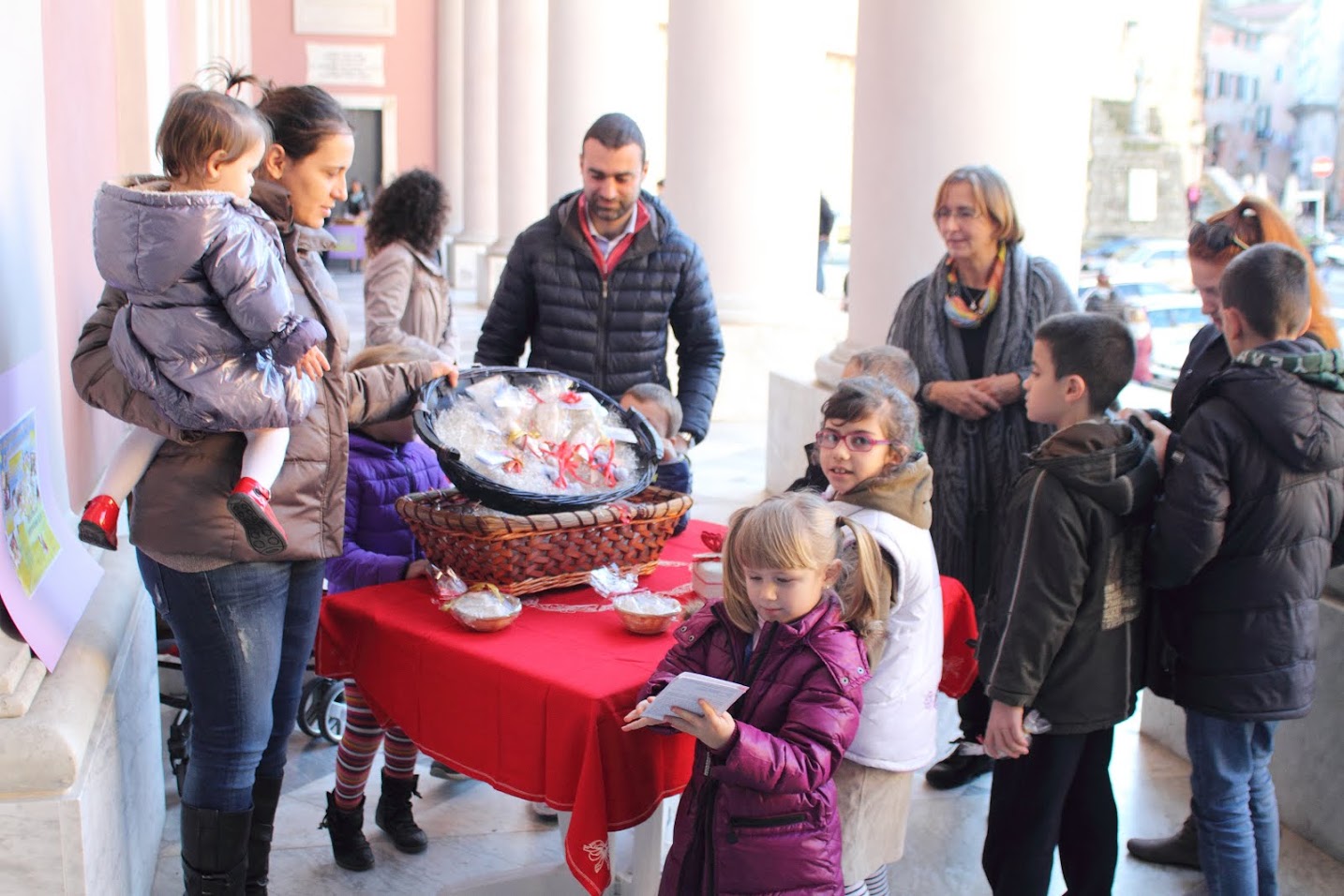 They are the Gen4, the children in the Focolare Movement, explain their idea of Christmas not only as a colourful celebration, filled with enchanting imaginary characters created by persuasive businesses and a frenetic race to sell and buy gifts: We should put Jesus back into the centre of Christmas, it’s his day,” they explain. The Gen4 made the small figurines of the Holy Child with much patience and love and then gave them away to passersby. They report from New York City: “While visiting the city with some friends, in the midst of the crowd, your small table drew my attention … Those words, “They’ve Evicted Jesus” resounded inside me! I’d like to transmit your message to others! This is has been my most beautiful Christmas, you’ve filled my heart with warmth.” Maria Helena Benjamin and Pep Cannoves who are responsible for the Gen4 worldwide, recounted how these little ones are particularly sensitive to evangelical love. They learn to concretize it in their daily actions, real factual gestures of fraternity. They discover that when love is mutual it brings the presence of Jesus among them. Thus they come to know Him and create simple and direct relationship with Him. They manage to involve their friends at school, their families, their parents and their teachers with their disarming simplicity, and they enter into the heart of each one of them.
They are the Gen4, the children in the Focolare Movement, explain their idea of Christmas not only as a colourful celebration, filled with enchanting imaginary characters created by persuasive businesses and a frenetic race to sell and buy gifts: We should put Jesus back into the centre of Christmas, it’s his day,” they explain. The Gen4 made the small figurines of the Holy Child with much patience and love and then gave them away to passersby. They report from New York City: “While visiting the city with some friends, in the midst of the crowd, your small table drew my attention … Those words, “They’ve Evicted Jesus” resounded inside me! I’d like to transmit your message to others! This is has been my most beautiful Christmas, you’ve filled my heart with warmth.” Maria Helena Benjamin and Pep Cannoves who are responsible for the Gen4 worldwide, recounted how these little ones are particularly sensitive to evangelical love. They learn to concretize it in their daily actions, real factual gestures of fraternity. They discover that when love is mutual it brings the presence of Jesus among them. Thus they come to know Him and create simple and direct relationship with Him. They manage to involve their friends at school, their families, their parents and their teachers with their disarming simplicity, and they enter into the heart of each one of them.  Pep Canoves recalled how Chiara Lubich deeply cherished these little ones, giving them a special place in her heart, going to visit them during their international congresses, sending messages to them, answering their questions. And it was to them that she extended the invitation to prevent Jesus from being banished from Christmas: “Let Jesus be born in your midst through your mutual love; then it was always be Christmas! […] We can offer Jesus, Jesus in our midst to the whole world. We can take this love of ours, Jesus in the midst, our joy, into the streets, into the schools, to young and old … anywhere!” The Gen4 also have their Advent Wreath activity. They fill the days before Christmas with many concrete acts of love that are appear simple, but in their smallness are quite revolutionary. The Gen4 are involved in many projects, especially for the most poor. “During the year,” Maria Helena Benjamin continues, “we receive lots of news from around the world about their projects for the marginalized, like the story of five year-old Sonia from Romania who became friends with a Roma girl that had just joined her class.” “We received news from Madagascar and from Indonesia. Also from Syria which these days is in so much trouble and at war… Pep recounts: “From Aleppo they even sent us photos: in these conflict situations we carry on living with them, continuing with them to believe in love.” Once, while answering to a question from one of the Gen4 boys, Chiara had given them a special assignment: “Do you know what real happiness is? It’s the happiness you have when you love. Try it! Whenever you love, you’re happy. If you love all the time, you’ll be happy all the time. What should you do in the world? Give happiness to people, teach everyone to love.” And they really do teach us, with their purity and simplicity, how to put evangelica love into practice, the secret to happiness. Patrizia Mazzola
Pep Canoves recalled how Chiara Lubich deeply cherished these little ones, giving them a special place in her heart, going to visit them during their international congresses, sending messages to them, answering their questions. And it was to them that she extended the invitation to prevent Jesus from being banished from Christmas: “Let Jesus be born in your midst through your mutual love; then it was always be Christmas! […] We can offer Jesus, Jesus in our midst to the whole world. We can take this love of ours, Jesus in the midst, our joy, into the streets, into the schools, to young and old … anywhere!” The Gen4 also have their Advent Wreath activity. They fill the days before Christmas with many concrete acts of love that are appear simple, but in their smallness are quite revolutionary. The Gen4 are involved in many projects, especially for the most poor. “During the year,” Maria Helena Benjamin continues, “we receive lots of news from around the world about their projects for the marginalized, like the story of five year-old Sonia from Romania who became friends with a Roma girl that had just joined her class.” “We received news from Madagascar and from Indonesia. Also from Syria which these days is in so much trouble and at war… Pep recounts: “From Aleppo they even sent us photos: in these conflict situations we carry on living with them, continuing with them to believe in love.” Once, while answering to a question from one of the Gen4 boys, Chiara had given them a special assignment: “Do you know what real happiness is? It’s the happiness you have when you love. Try it! Whenever you love, you’re happy. If you love all the time, you’ll be happy all the time. What should you do in the world? Give happiness to people, teach everyone to love.” And they really do teach us, with their purity and simplicity, how to put evangelica love into practice, the secret to happiness. Patrizia Mazzola
![The simplicity of Aletta]()
Dec 21, 2016 | Non categorizzato
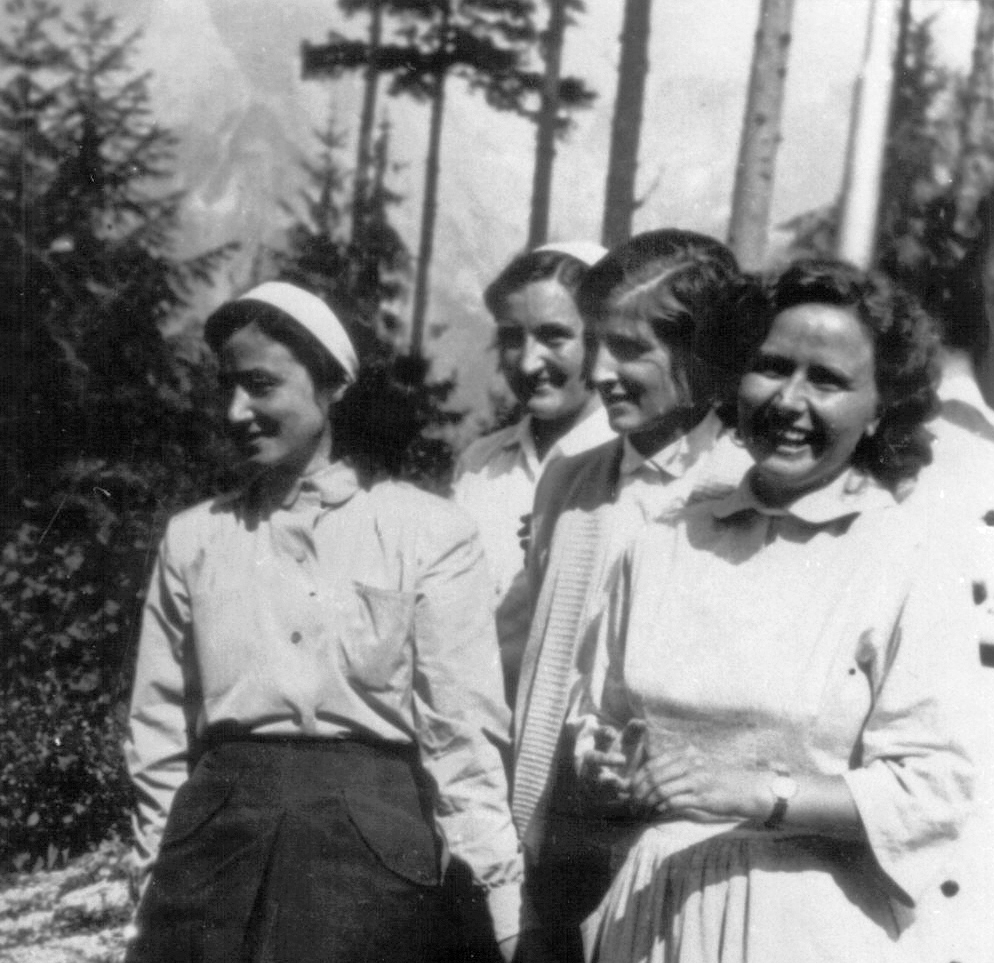 Born in Martignano (Trent) on 27 November 1924, Vittoria Salizzoni, who moved temporarily to France with her family, felt God’s call at the age of 13: an intuition which she tried momentarily to put aside. At the age of 21 she met Chiara Lubich and was attracted by the novelty of the life she lived. Her doubts dissolved immediately: the path through which she could respond to that “calling” she had felt ever since childhood, was the focolare. Aletta (“little wing,” the name that Chiara gave her to remind her of the winged flight she had to take without looking back) stood by Chiara for 20 years in the discovery and implementation of the features of the Charism the Holy Spirit was slowly revealing to them. Among these, besides the specific spirituality of unity which is its particular characterstic, were the main concrete aspects of Christian life. What specifically suited the figure of Aletta, was the concern for health and protection of the environment. Chiara herself had explained this aspect to her as: «the entire humanity of Jesus; the life of Jesus in each person. Jesus was born of a woman like us, suffered the cold and hunger, cried, and experienced human affection. He fed the hungry, multiplied the bread and fishes, and healed many sick people. But above all he was full of love for mankind, and his suffering… Suffering, death and the resurrection are also expressions of this aspect.» In the 1960s and 1970s Chiara asked her to open the focolare house in Istanbul, where Aletta would have many and profound contacts with Patriarch Athenagoras I. So on many occasions, she had the chance to accompany Chiara in her visits to the Patriarch. During her stay in those lands, Aletta discovered the beauty of the Orthodox Church and the Churches of the Orient, in which she saw the importance of translating truth in life, exalting love. The contacts she established were the precursor of a fertile dialogue that has continued up to today, with the current Ecumenical Patriarch, Bartholomew I.
Born in Martignano (Trent) on 27 November 1924, Vittoria Salizzoni, who moved temporarily to France with her family, felt God’s call at the age of 13: an intuition which she tried momentarily to put aside. At the age of 21 she met Chiara Lubich and was attracted by the novelty of the life she lived. Her doubts dissolved immediately: the path through which she could respond to that “calling” she had felt ever since childhood, was the focolare. Aletta (“little wing,” the name that Chiara gave her to remind her of the winged flight she had to take without looking back) stood by Chiara for 20 years in the discovery and implementation of the features of the Charism the Holy Spirit was slowly revealing to them. Among these, besides the specific spirituality of unity which is its particular characterstic, were the main concrete aspects of Christian life. What specifically suited the figure of Aletta, was the concern for health and protection of the environment. Chiara herself had explained this aspect to her as: «the entire humanity of Jesus; the life of Jesus in each person. Jesus was born of a woman like us, suffered the cold and hunger, cried, and experienced human affection. He fed the hungry, multiplied the bread and fishes, and healed many sick people. But above all he was full of love for mankind, and his suffering… Suffering, death and the resurrection are also expressions of this aspect.» In the 1960s and 1970s Chiara asked her to open the focolare house in Istanbul, where Aletta would have many and profound contacts with Patriarch Athenagoras I. So on many occasions, she had the chance to accompany Chiara in her visits to the Patriarch. During her stay in those lands, Aletta discovered the beauty of the Orthodox Church and the Churches of the Orient, in which she saw the importance of translating truth in life, exalting love. The contacts she established were the precursor of a fertile dialogue that has continued up to today, with the current Ecumenical Patriarch, Bartholomew I.  After the death of Athenagoras, Aletta moved to Lebanon. Those were years of civil war, which with the continuous air raids, repeated the lesson of the movement’s early years in Trent: “everything collapses, only God remains!” She shared with the local people the insecurity and risks of those long years of war, supporting, consoling, and imbuing hope. Difficulties and dangers did not hinder the spread of the charism of unity, not only in Lebanon but across the Middle East, which Aletta visited periodically. In 1990 she returned to Rome for good. «During those first years in Piazza Cappuccini – recounts Palmira, who is also from that first group of focolarine women of Trent – I would go with Aletta to the valleys to meet the first communities that were sprouting. She was like an angel, and it explains clearly why Chiara immediately called her so. And she was like the batter of an angel’s wing, for Chiara and for all of us throughout these 70 years of her life in the focolare. She didn’t talk much, but what she said put us all in the essential facts of life. What characterized her most was simplicity, an inborn serenity and enviable psycho-physical balance.» Ten days before her death, Aletta recorded a video message to the youths of the Movement, the gen, gathered for their congress: «I want to greet all the gen of the world on their 50th anniversary. May they all make progress; they are young, still strong, and can do all they wish!» Upon announcing the death of Aletta to the Movement worldwide, Maria Voce, the Focolare President wrote: «With joy and immense gratitude we are accompanying Aletta to the house of the Father. We could not have had a better model than her, who gave her life without measure.» By Anna Friso
After the death of Athenagoras, Aletta moved to Lebanon. Those were years of civil war, which with the continuous air raids, repeated the lesson of the movement’s early years in Trent: “everything collapses, only God remains!” She shared with the local people the insecurity and risks of those long years of war, supporting, consoling, and imbuing hope. Difficulties and dangers did not hinder the spread of the charism of unity, not only in Lebanon but across the Middle East, which Aletta visited periodically. In 1990 she returned to Rome for good. «During those first years in Piazza Cappuccini – recounts Palmira, who is also from that first group of focolarine women of Trent – I would go with Aletta to the valleys to meet the first communities that were sprouting. She was like an angel, and it explains clearly why Chiara immediately called her so. And she was like the batter of an angel’s wing, for Chiara and for all of us throughout these 70 years of her life in the focolare. She didn’t talk much, but what she said put us all in the essential facts of life. What characterized her most was simplicity, an inborn serenity and enviable psycho-physical balance.» Ten days before her death, Aletta recorded a video message to the youths of the Movement, the gen, gathered for their congress: «I want to greet all the gen of the world on their 50th anniversary. May they all make progress; they are young, still strong, and can do all they wish!» Upon announcing the death of Aletta to the Movement worldwide, Maria Voce, the Focolare President wrote: «With joy and immense gratitude we are accompanying Aletta to the house of the Father. We could not have had a better model than her, who gave her life without measure.» By Anna Friso
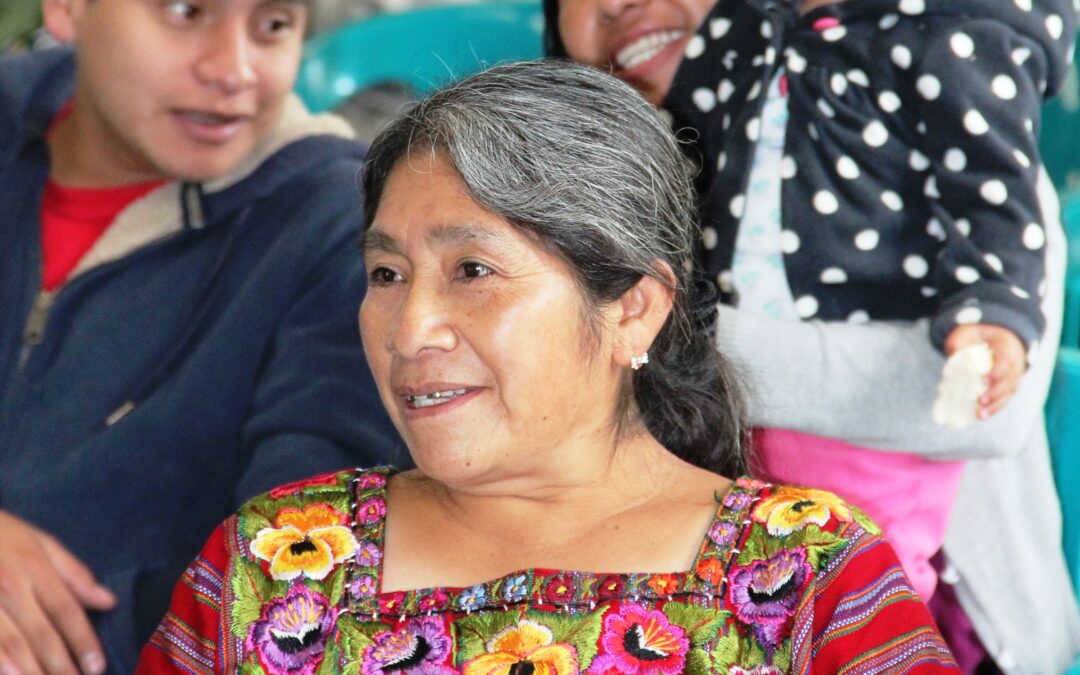
Dec 20, 2016 | Non categorizzato
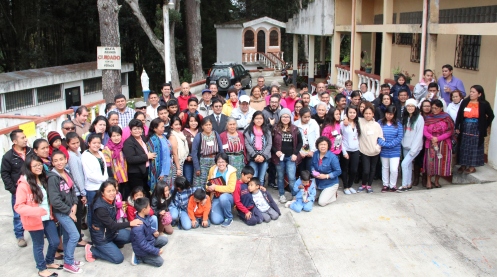 «We visited the families with the Word of Life leaflet and while talking about one thing and the other, a meeting ensued.» These were the words of Carmen, who with her husband, Mynor and their nearest of kin, initiated the holding of the Mariapolis close to their city, Chimaltenango, 54 km from Guatemala City. Based on commerce and agriculture, the city’s economy is integrated with the modern rhythms of production and consumption, but still jealously guards their ancient culture and traditions. Carmen and Mynor are the heart of the Focolare community and their big house is the local base of the Movement. With a twinge of pride they told us about the meetings they hold there. Information about the Movement was barely disseminated, so the first thing they did was to inform the parish priest, who Mynor, Carmen, and her sister, Marta went to visit. But priests in these areas are very busy, and since Mynor could not wait for long, he went to his work in Court. «The priest could not understand what novelties the Movement could bring – Carmen continued – until my sister Marta told him about the experiences of her children who are gen3». The first had allocated the money she received on her 15th birthday to the poor children of an isolated village; the other had forgiven a school mate who had tripped him and caused him to consequently break an arm. At that point the parish priest understood the effects of living the Focolare spirituality. Once they received the support of the local church, they had to cover the expenses. «When people are invited to a retreat – Mynor said – they know they will be hosted as guests». Because of this the preparation for the Mariapolis also consisted in fundraising activities, one of which was holding Bingo sessions in the parish hall, and gathering gifts for the occasion.
«We visited the families with the Word of Life leaflet and while talking about one thing and the other, a meeting ensued.» These were the words of Carmen, who with her husband, Mynor and their nearest of kin, initiated the holding of the Mariapolis close to their city, Chimaltenango, 54 km from Guatemala City. Based on commerce and agriculture, the city’s economy is integrated with the modern rhythms of production and consumption, but still jealously guards their ancient culture and traditions. Carmen and Mynor are the heart of the Focolare community and their big house is the local base of the Movement. With a twinge of pride they told us about the meetings they hold there. Information about the Movement was barely disseminated, so the first thing they did was to inform the parish priest, who Mynor, Carmen, and her sister, Marta went to visit. But priests in these areas are very busy, and since Mynor could not wait for long, he went to his work in Court. «The priest could not understand what novelties the Movement could bring – Carmen continued – until my sister Marta told him about the experiences of her children who are gen3». The first had allocated the money she received on her 15th birthday to the poor children of an isolated village; the other had forgiven a school mate who had tripped him and caused him to consequently break an arm. At that point the parish priest understood the effects of living the Focolare spirituality. Once they received the support of the local church, they had to cover the expenses. «When people are invited to a retreat – Mynor said – they know they will be hosted as guests». Because of this the preparation for the Mariapolis also consisted in fundraising activities, one of which was holding Bingo sessions in the parish hall, and gathering gifts for the occasion. 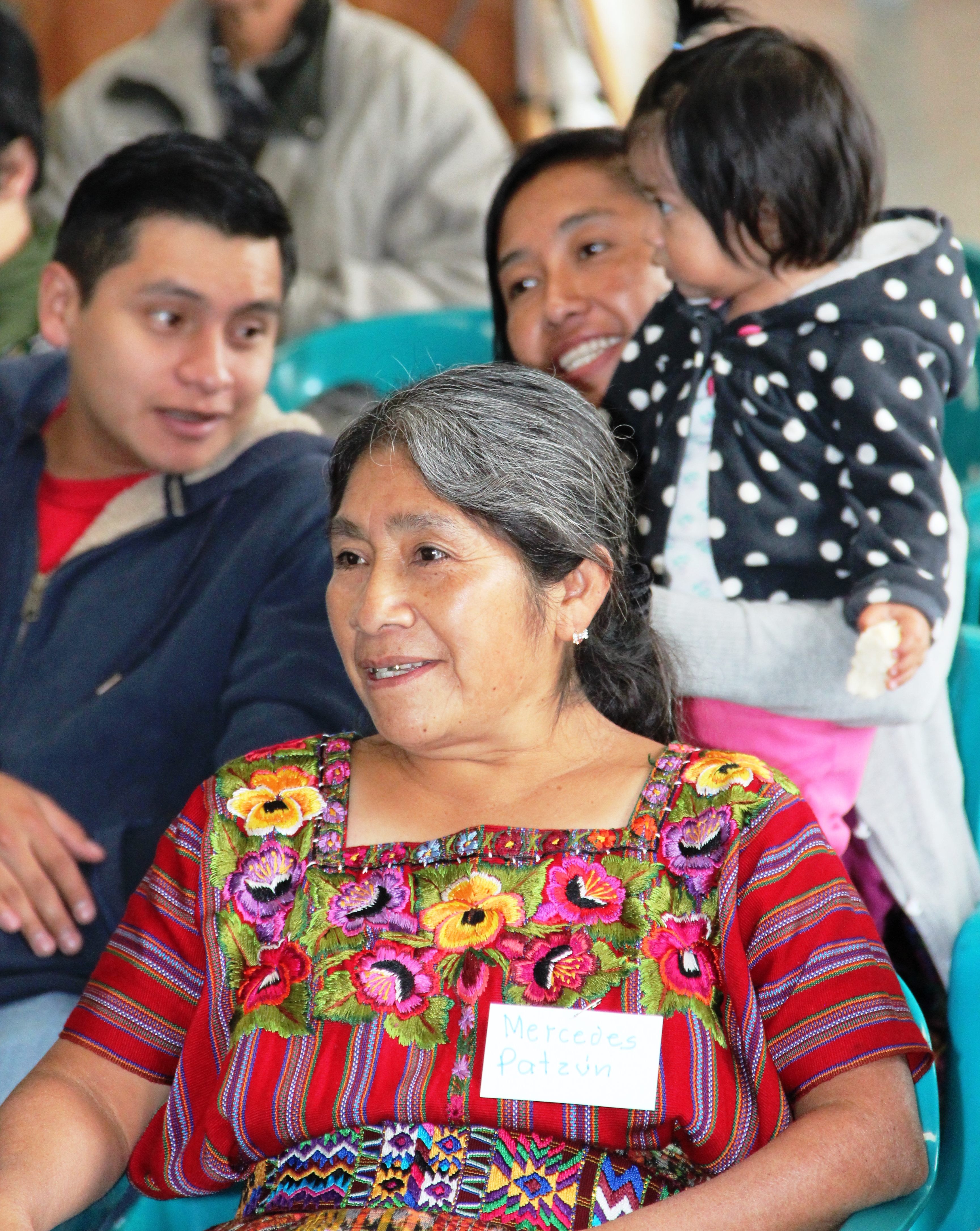 Kelly, the second of Carmen and Mynor’s four children, is studying law to follow in her father’s footsteps. «There are only a few of us in the faculty – she affirmed – but we help each other. Only two of us are gen but we always try to have Jesus in our midst and with everyone». Kelly admires the coherent life of her parents: «When they invited people to the Mariapolis, they spoke about experiences I know, and which were all true. In our home, the Word of Life is the reference for every situation. And so, when there is a problem we read it in order to put it into practice.» Respect for the elderly is one of the riches of the Kaqchikel. In their presence, a gesture of reverence is shown before speaking. Motherhood and the gift of children are considered a benediction of God and are foremost in value compared to all considerations. «For me, the Movement – again Carmen says – is a grace of God that welcomes us, adults and children, and likewise the various cultures and languages. Here, they appreciate us, with our traditions and mentality.» In the culture of the Maya there is a strong bond with nature. «We invoke it, giving thanks to the heart of the heavens and the heart of the earth, and like St. Francis, we say: all are my brothers. Also Chiara Lubich had this vision. The Holy Spirit inspired her in this sense, which is why the Focolare Movement welcomes us as we are.» Mynor concludes: «The Maya philosophy stresses harmony, balance of the material and spiritual aspects, and solidarity which is equal to fraternity, to nurture conditions of cooperation.» Beyond all the contradictions that reign in every culture, the Kaqchikel conserve many human values which, enlightened and purified by the Gospel, enrich all those who receive it. Filippo Casabianca, Guatemala City
Kelly, the second of Carmen and Mynor’s four children, is studying law to follow in her father’s footsteps. «There are only a few of us in the faculty – she affirmed – but we help each other. Only two of us are gen but we always try to have Jesus in our midst and with everyone». Kelly admires the coherent life of her parents: «When they invited people to the Mariapolis, they spoke about experiences I know, and which were all true. In our home, the Word of Life is the reference for every situation. And so, when there is a problem we read it in order to put it into practice.» Respect for the elderly is one of the riches of the Kaqchikel. In their presence, a gesture of reverence is shown before speaking. Motherhood and the gift of children are considered a benediction of God and are foremost in value compared to all considerations. «For me, the Movement – again Carmen says – is a grace of God that welcomes us, adults and children, and likewise the various cultures and languages. Here, they appreciate us, with our traditions and mentality.» In the culture of the Maya there is a strong bond with nature. «We invoke it, giving thanks to the heart of the heavens and the heart of the earth, and like St. Francis, we say: all are my brothers. Also Chiara Lubich had this vision. The Holy Spirit inspired her in this sense, which is why the Focolare Movement welcomes us as we are.» Mynor concludes: «The Maya philosophy stresses harmony, balance of the material and spiritual aspects, and solidarity which is equal to fraternity, to nurture conditions of cooperation.» Beyond all the contradictions that reign in every culture, the Kaqchikel conserve many human values which, enlightened and purified by the Gospel, enrich all those who receive it. Filippo Casabianca, Guatemala City
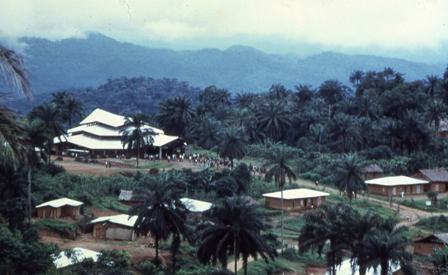
Dec 19, 2016 | Focolare Worldwide
 “I was asked to present a report on the Christian witness in front of African tradition. It wasn’t easy for me, for two simple reasons: the first is that I am a Bangwa, the second is that I’m not only Christian, but also the bishop of Mamfe.” The speaker is Bishop Andrew Fuanya Nkea at a symposium on dalogue between traditional African religions and Christianity, during the 50th anniversary celebration of the Focolare Movement in Fontem. Fifty-one years old, he is originally from Widikum, Cameroon, graduate in Philosophy and Theology, a priest since 1992, pastor, secretary of the Diocese, professor and formator, Secretary General of the Catholic University of Cameroon and recently named Bishop of the diocese of Mamfe. “I decided to use a more practical than theoretical approach in my talk,” said the bishop who then proceeded to recount the history of the relationship between the Bangwa culture – especially in the south west region of Cameroon, the Lebialem District – and Christianity. That relationship was marked by an encounter that turned into a sort of parting of the waters between a before and an after: the encounter with the Focolare Movement. Bishop Andrew Fuanya is a living demonstration that it is possible to overcome the dualism between two traditions, without falling into religous syncretism. The Christianity brought by the first missionaries who arrived in Cameroon in the 1920s had placed the population in front of a fork in the road: “Either you become Christian and avoid all aspects of the traditional religions, or you practice the Bangwa religion, remaining a pagan, good only as firewood for hell.” There was little or no dialogue between Christianity and the local culture. Typical musical instruments were banned in church, along with traditional prayers. In spite of the rigidity and inflexible methods used by the first missionaries, many people embraced Christianity, even though it was very difficult and in direct opposition to their communities.
“I was asked to present a report on the Christian witness in front of African tradition. It wasn’t easy for me, for two simple reasons: the first is that I am a Bangwa, the second is that I’m not only Christian, but also the bishop of Mamfe.” The speaker is Bishop Andrew Fuanya Nkea at a symposium on dalogue between traditional African religions and Christianity, during the 50th anniversary celebration of the Focolare Movement in Fontem. Fifty-one years old, he is originally from Widikum, Cameroon, graduate in Philosophy and Theology, a priest since 1992, pastor, secretary of the Diocese, professor and formator, Secretary General of the Catholic University of Cameroon and recently named Bishop of the diocese of Mamfe. “I decided to use a more practical than theoretical approach in my talk,” said the bishop who then proceeded to recount the history of the relationship between the Bangwa culture – especially in the south west region of Cameroon, the Lebialem District – and Christianity. That relationship was marked by an encounter that turned into a sort of parting of the waters between a before and an after: the encounter with the Focolare Movement. Bishop Andrew Fuanya is a living demonstration that it is possible to overcome the dualism between two traditions, without falling into religous syncretism. The Christianity brought by the first missionaries who arrived in Cameroon in the 1920s had placed the population in front of a fork in the road: “Either you become Christian and avoid all aspects of the traditional religions, or you practice the Bangwa religion, remaining a pagan, good only as firewood for hell.” There was little or no dialogue between Christianity and the local culture. Typical musical instruments were banned in church, along with traditional prayers. In spite of the rigidity and inflexible methods used by the first missionaries, many people embraced Christianity, even though it was very difficult and in direct opposition to their communities.  The novelty represented by the first visit of Chiara Lubich to the royal palace of the Fon of Fontem in 1966 can be described with an image used by the Focolare foundress in describing the first spark, the first inspiration of the interreligious dialogue that would later develop: “Suddenly I had the strong impression of God as an enormous sun that embraced everybody with His love – us and them.” A new era had begun, driven on the wind of the Second Vatican Council and by the extraordinary story of the friendship among the first focolarini to reach the spot and the Bangwa people. The focolarini included doctors who had come to wipe out the sleeping sickness that was decimating the population. Since then, the relationship between the faithful of the two religions have been characterized by deep mutual respect which restored dignity to the traditional culture and was a veritable laboratory in which the identity of both religions could grow. The bishop explains: some local religious traditions were kept, such as praying to the dead, so that they might intercede for the family, or the Cry Die, the day dedicated to them; other things were strange to their new faith, such as polygamy, animal sacrifice and witchcraft. The new inculturation, concluded the bishop, according to the spirit of the Second Vatican Council, does not come from an imposition of a rigid uniformity, but is inspired by the values of dialogue and collaboration, in the search for the ‘Seeds of the Word’ that are scattered in every religious tradition. “The challenge for the Christians of Lebialem for the next 50 years will be to recognize that their credibility will depend on how much they are able to love everybody, independant of the religion they belong to.” Only in this way will they be authentic Christians and authentic Africans.” Chiara Favotti Full interview with Mons. Andrew F. Nkea
The novelty represented by the first visit of Chiara Lubich to the royal palace of the Fon of Fontem in 1966 can be described with an image used by the Focolare foundress in describing the first spark, the first inspiration of the interreligious dialogue that would later develop: “Suddenly I had the strong impression of God as an enormous sun that embraced everybody with His love – us and them.” A new era had begun, driven on the wind of the Second Vatican Council and by the extraordinary story of the friendship among the first focolarini to reach the spot and the Bangwa people. The focolarini included doctors who had come to wipe out the sleeping sickness that was decimating the population. Since then, the relationship between the faithful of the two religions have been characterized by deep mutual respect which restored dignity to the traditional culture and was a veritable laboratory in which the identity of both religions could grow. The bishop explains: some local religious traditions were kept, such as praying to the dead, so that they might intercede for the family, or the Cry Die, the day dedicated to them; other things were strange to their new faith, such as polygamy, animal sacrifice and witchcraft. The new inculturation, concluded the bishop, according to the spirit of the Second Vatican Council, does not come from an imposition of a rigid uniformity, but is inspired by the values of dialogue and collaboration, in the search for the ‘Seeds of the Word’ that are scattered in every religious tradition. “The challenge for the Christians of Lebialem for the next 50 years will be to recognize that their credibility will depend on how much they are able to love everybody, independant of the religion they belong to.” Only in this way will they be authentic Christians and authentic Africans.” Chiara Favotti Full interview with Mons. Andrew F. Nkea
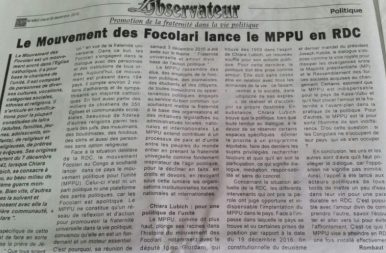
Dec 18, 2016 | Focolare Worldwide
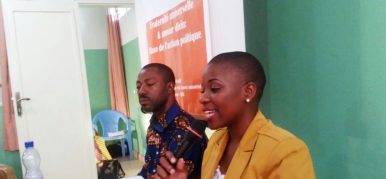 The Democratic Republic of the Congo (DRC) has been passing through a very delicate phase in its politics since last November 14th when the Premier Augustin Matata Ponyo was dismissed, following an accord in October that prolonged the mandate of President Joseph Kabila. Kabila should have terminated his office last December 19th, but his coalition, along with part of the opposition, has decided to continue on until next elections in April 2018. This was the heated context in which the Congolese Political Movement for Unity (PMU), which is inspired by the values of the spirituality of Chiara Lubich, was formed last October 29th. “During this period, the Church and its Bishops Conference is working to avoid chaos in the country,” say Damien Kasereka and Aga Ghislaine Kahambu from the local Focolare Movement. “The launching of the PMU at this moment is really an answer to a need. We’re glad to see members of the Movement more involved in politics, especially the young people who are convinced that things can be different. In spite of everything, we don’t lost hope.” On December 3rd the PMU was officially introduced at the multi-purpose meeting hall of the Moyi Mwa Ntongo Medical Centre in Kinshasa. The Le potentiel newspaper devoted a long article to the event, titled “Love and Brotherhood in Society: the Launch of a Mass-Awareness Movement”. “Far from being a political party, the PMU is a network of reflection and action for the promotion of brotherhood in the political life of the Congo. Its initiators are convinced that universal brotherhood is the basis and the key for positive change in society, especially Congolese [society] whose anti-values are finding it hard to die out,” the newspaper wrote. The event was attended by university researchers, teaching staff, journalists, religious, medical doctors, graduate students, social activists and other professionals. The meeting underscored the importance and opportunity being offered by the PMU in the DRC, since it promotes “doing politics in favour of unity” which is so needed at this difficult moment in time. The National Deputy Dieudonné Upira, one of the initiators of the PMU in the DRC, affirmed: “We’d like to raise a generation of young people who are not afraid like us. Obviously, we have not done much for this country. Perhaps we weren’t trained and this is the reason behind our fear. Therefore, we want to train the young people who are interested in doing good, so that they will be prepared to denounce, announce and renounce. Young people who, in front of the bipolarization of the Congolese political sphere, are able to say: “We must work for our nation.” A young person with training can influence society with his or her way of acting.”
The Democratic Republic of the Congo (DRC) has been passing through a very delicate phase in its politics since last November 14th when the Premier Augustin Matata Ponyo was dismissed, following an accord in October that prolonged the mandate of President Joseph Kabila. Kabila should have terminated his office last December 19th, but his coalition, along with part of the opposition, has decided to continue on until next elections in April 2018. This was the heated context in which the Congolese Political Movement for Unity (PMU), which is inspired by the values of the spirituality of Chiara Lubich, was formed last October 29th. “During this period, the Church and its Bishops Conference is working to avoid chaos in the country,” say Damien Kasereka and Aga Ghislaine Kahambu from the local Focolare Movement. “The launching of the PMU at this moment is really an answer to a need. We’re glad to see members of the Movement more involved in politics, especially the young people who are convinced that things can be different. In spite of everything, we don’t lost hope.” On December 3rd the PMU was officially introduced at the multi-purpose meeting hall of the Moyi Mwa Ntongo Medical Centre in Kinshasa. The Le potentiel newspaper devoted a long article to the event, titled “Love and Brotherhood in Society: the Launch of a Mass-Awareness Movement”. “Far from being a political party, the PMU is a network of reflection and action for the promotion of brotherhood in the political life of the Congo. Its initiators are convinced that universal brotherhood is the basis and the key for positive change in society, especially Congolese [society] whose anti-values are finding it hard to die out,” the newspaper wrote. The event was attended by university researchers, teaching staff, journalists, religious, medical doctors, graduate students, social activists and other professionals. The meeting underscored the importance and opportunity being offered by the PMU in the DRC, since it promotes “doing politics in favour of unity” which is so needed at this difficult moment in time. The National Deputy Dieudonné Upira, one of the initiators of the PMU in the DRC, affirmed: “We’d like to raise a generation of young people who are not afraid like us. Obviously, we have not done much for this country. Perhaps we weren’t trained and this is the reason behind our fear. Therefore, we want to train the young people who are interested in doing good, so that they will be prepared to denounce, announce and renounce. Young people who, in front of the bipolarization of the Congolese political sphere, are able to say: “We must work for our nation.” A young person with training can influence society with his or her way of acting.”  Ex-Deputy Georgine Madiko, who was among the initiators, also said: “We’ll begin periodic university courses that will allow young people to receive training through modules. [Then,] we’ll spread like a spider web covering the whole country and all the academic fields. This spider web will serve – if not in eradicating – at least in mitigating the wrong in our society and in promoting the good.” It will begin with a group of 59 people. At the conclusion, Aga Ghislaine Kahambu thanked everyone: “Your presence shows that you want our country to change. You don’t need a crowd to change society. Each one of us can perform positive actions. Now, we no longer want these actions to be isolated.” Gustavo Clariá
Ex-Deputy Georgine Madiko, who was among the initiators, also said: “We’ll begin periodic university courses that will allow young people to receive training through modules. [Then,] we’ll spread like a spider web covering the whole country and all the academic fields. This spider web will serve – if not in eradicating – at least in mitigating the wrong in our society and in promoting the good.” It will begin with a group of 59 people. At the conclusion, Aga Ghislaine Kahambu thanked everyone: “Your presence shows that you want our country to change. You don’t need a crowd to change society. Each one of us can perform positive actions. Now, we no longer want these actions to be isolated.” Gustavo Clariá
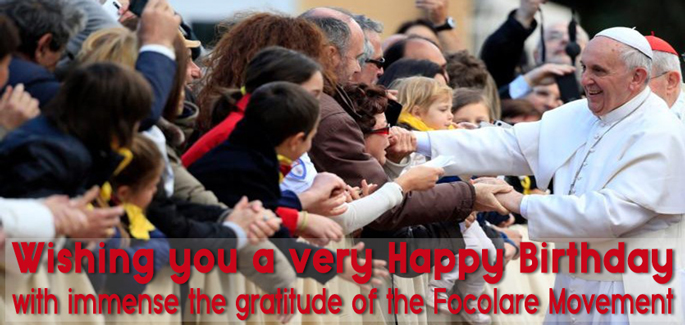
Dec 17, 2016 | Non categorizzato
 Use the social network to send your birthday greetings to Pope Francis:
Use the social network to send your birthday greetings to Pope Francis: Twitter: @pontifex Instagram: franciscus Ha*htag #Pontifex80
Dec 17, 2016 | Focolare Worldwide

Dec 16, 2016 | Focolare Worldwide
Sonia is from Slovacchia; she’s five and goes to nursery school. One day she told her mom that she had found a friend in school. “And what’s her name?” “I don’t know, she doesn’t speak. I approached her since I saw she was always alone and nobody wanted to play with her.” Sonia’s mom usually fetches her for lunch. But the teacher said: “Let her stay! She helps us with a gypsy girl who at first did not speak at all and now, thanks to her, has started to talk and cooperate with the others.” When she returned home her mother asked: “Did your friend say something to you?” “No, but she smiles when I tell her I like her.” Her mother remained silent. And the child said: “You know, love warms up each one of us.” 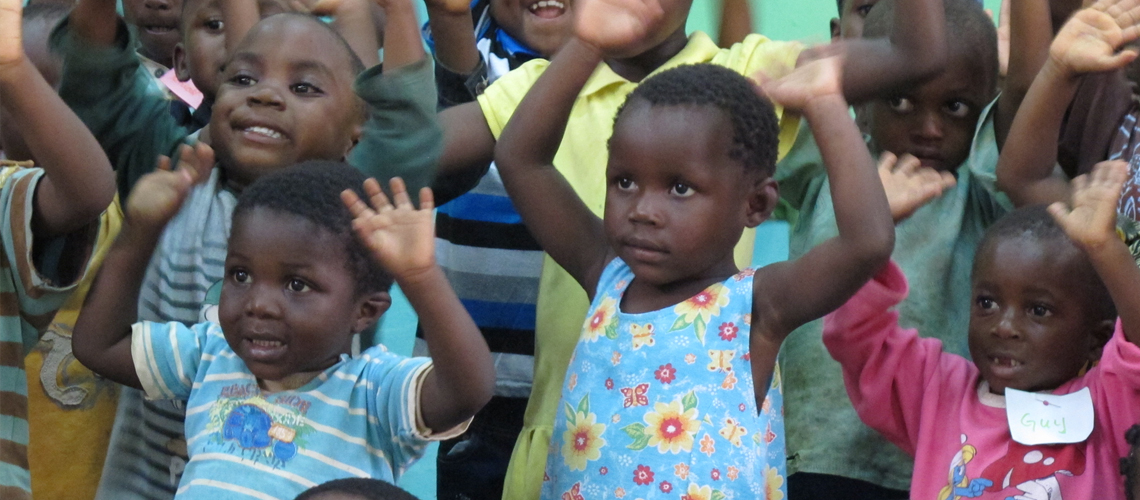 From Cameroon Kevin wrote: «One day in school during the break I asked one of my schoolmates if he had anything to eat. I was hungry and had nothing. He refused. The day after, I brought a piece of bread and when he came to ask me, I in turn refused. The next day, upon throwing the love dice it said: “Love your enemies.” I thought of that classmate. In school I tried to speak to him but he didn’t answer. So I sat in front of the house, waiting for him and when he came by, I called out to him, went up to him and when I asked why I shouldn’t speak to him anymore, he answered: “You refused to share with me the bread you had.” I immediately said, “Let’s make up!”and handed him some guava fruit I had with me. And so we started to talk and became friends again.»
From Cameroon Kevin wrote: «One day in school during the break I asked one of my schoolmates if he had anything to eat. I was hungry and had nothing. He refused. The day after, I brought a piece of bread and when he came to ask me, I in turn refused. The next day, upon throwing the love dice it said: “Love your enemies.” I thought of that classmate. In school I tried to speak to him but he didn’t answer. So I sat in front of the house, waiting for him and when he came by, I called out to him, went up to him and when I asked why I shouldn’t speak to him anymore, he answered: “You refused to share with me the bread you had.” I immediately said, “Let’s make up!”and handed him some guava fruit I had with me. And so we started to talk and became friends again.»  From Italy, Marco recounts: «One day at the nursery, the children made fun of me because I’m fat. I was sorry they did that and sometimes I cried. So I went to the Nun and instead of accusing them I told her of my sufferings. I understood that I had to forgive them and did so, because a Gen4 is one who, like Jesus, forgives and loves all.» Carmen lives in a slum at the outskirts of Mexico City. Often in the evening her uncles returns home drunk. Carmen is scared and hides herself. «But the other evening I didn’t hide – she says – I waited for him and helped him enter. I wasn’t scared because I knew that Our Lady takes care of me.» E Bartek, from Poland: «At the children’s party I received a gift from Teacher Ela, a chocolate bar and a lollipop. In my class there a girl called Asia, whom nobody likes. I remembered that in the morning upon throwing the dice, it said: “Love your enemies” and so I gave Asia the lollipop and half of the chocolate. She was surprised and thanked me, and then left. Now we have become big friends.» «In the centre of Naples (Italy), the “Baby Jesus” we make and offer to people is really selling quickly and many gather around the stand if only to say that they wish to join the initiative. A teacher, an agnostic, who has many problems, held Baby Jesus in her hands and looked at it: “This will be my Christmas!” A child ran home, emptied out his piggy bank and came with all his coins to buy his own Baby Jesus.» By the Gen4 Centres
From Italy, Marco recounts: «One day at the nursery, the children made fun of me because I’m fat. I was sorry they did that and sometimes I cried. So I went to the Nun and instead of accusing them I told her of my sufferings. I understood that I had to forgive them and did so, because a Gen4 is one who, like Jesus, forgives and loves all.» Carmen lives in a slum at the outskirts of Mexico City. Often in the evening her uncles returns home drunk. Carmen is scared and hides herself. «But the other evening I didn’t hide – she says – I waited for him and helped him enter. I wasn’t scared because I knew that Our Lady takes care of me.» E Bartek, from Poland: «At the children’s party I received a gift from Teacher Ela, a chocolate bar and a lollipop. In my class there a girl called Asia, whom nobody likes. I remembered that in the morning upon throwing the dice, it said: “Love your enemies” and so I gave Asia the lollipop and half of the chocolate. She was surprised and thanked me, and then left. Now we have become big friends.» «In the centre of Naples (Italy), the “Baby Jesus” we make and offer to people is really selling quickly and many gather around the stand if only to say that they wish to join the initiative. A teacher, an agnostic, who has many problems, held Baby Jesus in her hands and looked at it: “This will be my Christmas!” A child ran home, emptied out his piggy bank and came with all his coins to buy his own Baby Jesus.» By the Gen4 Centres
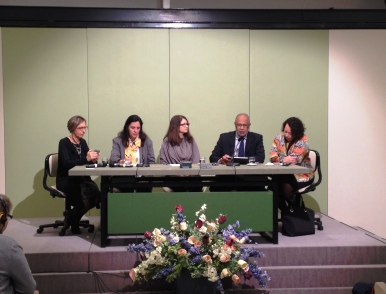
Dec 15, 2016 | Non categorizzato
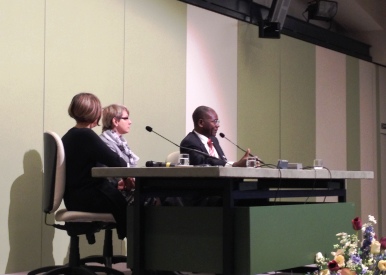 The objective of the convention was to «Review the various professions involved in the sector of justice – magistrates, lawyers, chancellors, university professors, prison staff, law enforcers – and discover the path to be pursued together, with the active participation of all the “actors” of the multifaceted relationships involved». The international congress promoted by Communion and Law (CeD) and New Humanity, was held last 26 and 27 November in Castel Gandolfo (Rome). The presence of a film director in a meeting on justice may have seemed to be quite unusual, but in his moving testimonial, Fernando Muraca succeeded in describing the experience of a prison staff in the Penal Institute for Minors of Catanzaro (Southern Italy). This was a documentary filmed entirely by the youths of the Institute, and the fruit of a commitment translated into a “cinema project” that transformed the young inmates not only into actors, but into people who have given a new meaning to their existence. Muraca is also the author and director of the film The land of Saints in which he faces the reality of the mafia’s organized crime. During the two days of intense dialogue among the various operators working in the field of justice, the discourse oftentimes stressed the concept of human dignity, and the intrinsic and inestimable value of every human being, in the conviction that also legal relationships can be lived in the spirit of fraternity and the quest for true justice.
The objective of the convention was to «Review the various professions involved in the sector of justice – magistrates, lawyers, chancellors, university professors, prison staff, law enforcers – and discover the path to be pursued together, with the active participation of all the “actors” of the multifaceted relationships involved». The international congress promoted by Communion and Law (CeD) and New Humanity, was held last 26 and 27 November in Castel Gandolfo (Rome). The presence of a film director in a meeting on justice may have seemed to be quite unusual, but in his moving testimonial, Fernando Muraca succeeded in describing the experience of a prison staff in the Penal Institute for Minors of Catanzaro (Southern Italy). This was a documentary filmed entirely by the youths of the Institute, and the fruit of a commitment translated into a “cinema project” that transformed the young inmates not only into actors, but into people who have given a new meaning to their existence. Muraca is also the author and director of the film The land of Saints in which he faces the reality of the mafia’s organized crime. During the two days of intense dialogue among the various operators working in the field of justice, the discourse oftentimes stressed the concept of human dignity, and the intrinsic and inestimable value of every human being, in the conviction that also legal relationships can be lived in the spirit of fraternity and the quest for true justice.  The rich and varied programme also deepened particularly current themes such as the protection of unaccompanied minors and political asylum applicants, relationship with jailees and protection of the victims. Dr. David Shaeed (magistrate in Indianapolis), Atty. Alba Doto (Boston), Atty. Endy Moraes (Fordham University, New York), and Dr. Luciane Barzotto Cardoso (magistrate of the Federal Court of Porto Alegre, Brazil), reviewed the current laws in various parts of the world, and elaborated the methods of pursuing the research and study paths initiated for some years now, also enriched by concrete implementations. Among the speeches was the video presentation of Maria Voce, Focolare President, the first woman lawyer of the Court of Cosenza (Italy), entitled Justice and the common good in the perspective of universal brotherhood. In a passage of her speech, Maria Voce explained: «Today, in the light of this “piecemeal World War III,” the tragic destructions, wiping out of every right and respect for peoples living in war territories, and closure of the borders to migrants, fraternity is the only answer, and the commitment we are called to give is to build it even with small actions, infinitesimal drops that may, however, enlighten the night.». The working sessions according to professional sectors evidenced the need to facilitate a confrontation within the various professions without losing sight of the entirety, to develop a dialogue among the operators and share know-how and experiences of the various activities developed in the field of Law. A significant note was the presence of the youth and the deep involvement of students. One of the most heartfelt testimonies was that of Roberto (former convict), and Alfonso, who has been working for some years in the Rebibbia Jail (Rome) to give a concrete hand to the families of the prisoners. Roberto did not hide his emotions in presenting his experience before such a qualified public, and ended by requesting the civil community to facilitate and promote the difficult employment and social reinsertion of ex-convicts. The next event will be for the youth in the Summer School 2017. Patrizia Mazzola
The rich and varied programme also deepened particularly current themes such as the protection of unaccompanied minors and political asylum applicants, relationship with jailees and protection of the victims. Dr. David Shaeed (magistrate in Indianapolis), Atty. Alba Doto (Boston), Atty. Endy Moraes (Fordham University, New York), and Dr. Luciane Barzotto Cardoso (magistrate of the Federal Court of Porto Alegre, Brazil), reviewed the current laws in various parts of the world, and elaborated the methods of pursuing the research and study paths initiated for some years now, also enriched by concrete implementations. Among the speeches was the video presentation of Maria Voce, Focolare President, the first woman lawyer of the Court of Cosenza (Italy), entitled Justice and the common good in the perspective of universal brotherhood. In a passage of her speech, Maria Voce explained: «Today, in the light of this “piecemeal World War III,” the tragic destructions, wiping out of every right and respect for peoples living in war territories, and closure of the borders to migrants, fraternity is the only answer, and the commitment we are called to give is to build it even with small actions, infinitesimal drops that may, however, enlighten the night.». The working sessions according to professional sectors evidenced the need to facilitate a confrontation within the various professions without losing sight of the entirety, to develop a dialogue among the operators and share know-how and experiences of the various activities developed in the field of Law. A significant note was the presence of the youth and the deep involvement of students. One of the most heartfelt testimonies was that of Roberto (former convict), and Alfonso, who has been working for some years in the Rebibbia Jail (Rome) to give a concrete hand to the families of the prisoners. Roberto did not hide his emotions in presenting his experience before such a qualified public, and ended by requesting the civil community to facilitate and promote the difficult employment and social reinsertion of ex-convicts. The next event will be for the youth in the Summer School 2017. Patrizia Mazzola
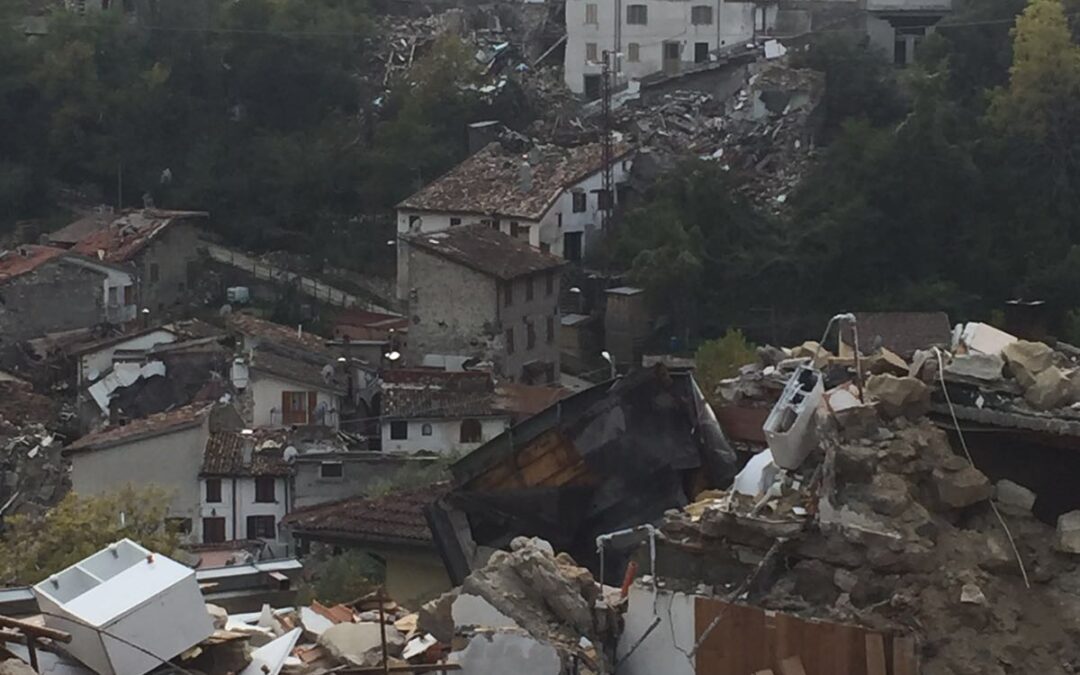
Dec 14, 2016 | Focolare Worldwide
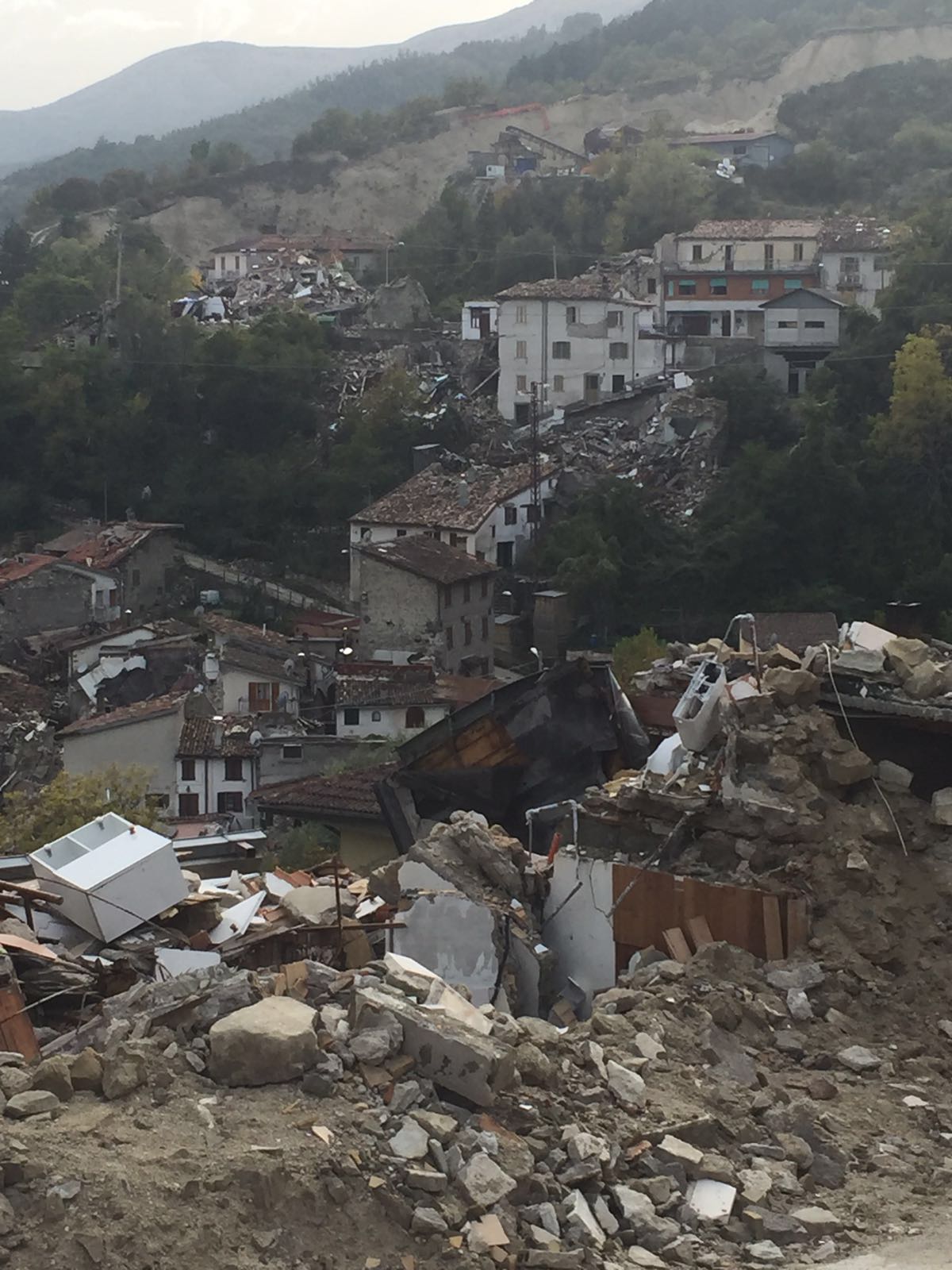 Christmas is also on the way for the displaced victims of the earthquake in Central Italy. We know that you are working in during this after phase of the earthquake. What are you doing? FrancescoTortorella explains: “AMU and AFN have coordinated with the Focolare Movement in Italy, to carry ahead their work during the after phase of the earthquake. Since August, there have been three site surveys in the regions that were hit, to examine the possible ways of intervening. The first intervention that we identified was that of supporting the families that run small agricultural businesses, along with the farm regions that suffered damage.” After a feasibility study, you came up with the comprehensive project. What is it? “We called it RImPresa and it consists of two activities,” Paola Iacovone explains. “The first activity, which will be carried out by the Abbraccio Planetario from Castelli Romani, Italy, and the Bread and Fish Foundation from Ascoli Piceno, Italy, will consist of 4 joint purchasing groups which, through a web portal, will purchase products from the small businesses that were hit by the earthquake, which will provide long-term support to entire families.” There are also many agricultural businesses that were damaged by the earthquake and are finding it hard to start up again. Are you also working on this front? “Yes. The Italian Associazione Italiana Imprenditori per un Economia di Comunione (AIPEC), which we work with is promoting the second activity of RImPresa,” Tortorella adds, “which is only concerned with supporting families with small agricultural and breeding businesses, by providing machinery or small infrastructures. All of it is carried out in coordination with the Italian Civil Protection Agency that has the full picture of the businesses that were damaged and of the assistance that is distributed.” “We’re a small drop in the ocean along with many others,” Paola concludes. “We’ve received many contributions up until now part of which had been destined to help finance the RImPresa Project. There are still funds to carry out other projects that will begin in the next few months. The contributions continue to arrive, so this fund will probably grow in the next few weeks.” Best wishes for a happy Christmas! Gustavo Clariá To collaborate:
Christmas is also on the way for the displaced victims of the earthquake in Central Italy. We know that you are working in during this after phase of the earthquake. What are you doing? FrancescoTortorella explains: “AMU and AFN have coordinated with the Focolare Movement in Italy, to carry ahead their work during the after phase of the earthquake. Since August, there have been three site surveys in the regions that were hit, to examine the possible ways of intervening. The first intervention that we identified was that of supporting the families that run small agricultural businesses, along with the farm regions that suffered damage.” After a feasibility study, you came up with the comprehensive project. What is it? “We called it RImPresa and it consists of two activities,” Paola Iacovone explains. “The first activity, which will be carried out by the Abbraccio Planetario from Castelli Romani, Italy, and the Bread and Fish Foundation from Ascoli Piceno, Italy, will consist of 4 joint purchasing groups which, through a web portal, will purchase products from the small businesses that were hit by the earthquake, which will provide long-term support to entire families.” There are also many agricultural businesses that were damaged by the earthquake and are finding it hard to start up again. Are you also working on this front? “Yes. The Italian Associazione Italiana Imprenditori per un Economia di Comunione (AIPEC), which we work with is promoting the second activity of RImPresa,” Tortorella adds, “which is only concerned with supporting families with small agricultural and breeding businesses, by providing machinery or small infrastructures. All of it is carried out in coordination with the Italian Civil Protection Agency that has the full picture of the businesses that were damaged and of the assistance that is distributed.” “We’re a small drop in the ocean along with many others,” Paola concludes. “We’ve received many contributions up until now part of which had been destined to help finance the RImPresa Project. There are still funds to carry out other projects that will begin in the next few months. The contributions continue to arrive, so this fund will probably grow in the next few weeks.” Best wishes for a happy Christmas! Gustavo Clariá To collaborate:
| Azione per un Mondo Unito ONLUS (AMU) |
Azione per Famiglie Nuove ONLUS (AFN) |
| IBAN: IT16 G050 1803 2000 0000 0120 434 at Banca Popolare Etica |
IBAN: IT55 K033 5901 6001 0000 0001 060 at Banca Prossima |
| Codice SWIFT/BIC: CCRTIT2184D |
Codice SWIFT/BIC: BCITITMX |
| CAUSE : Emergenza terremoto (Italia) |
| All contributions that are deposited in these two accounts for this cause will be jointly administered by AMU and AFN. Except for cash donations, Italian taxpayers can get deductions and allowances from income, in accordance with the regulations for non-profit organizations, to up to 10% of income and the € 70,000.00 annual limit. Tax benefits are provided in many European Union countries and other countries of the world in accordance with local regulations. |
Dec 13, 2016 | Non categorizzato
Upon receiving the news of the death of Bishop Javier Echevarría, prelate of the Opus Dei, yesterday 12 December, the Focolare Movement conveys its heartfelt condolences. Most grateful for his life spent at the service of the Church, Bishop Echevarría, the second successor of St. Josemaría Escribá de Balaguer, founder of the Opus Dei, the Focolare Movement is particularly united in prayer and friendship with the Opus Dei family worldwide.
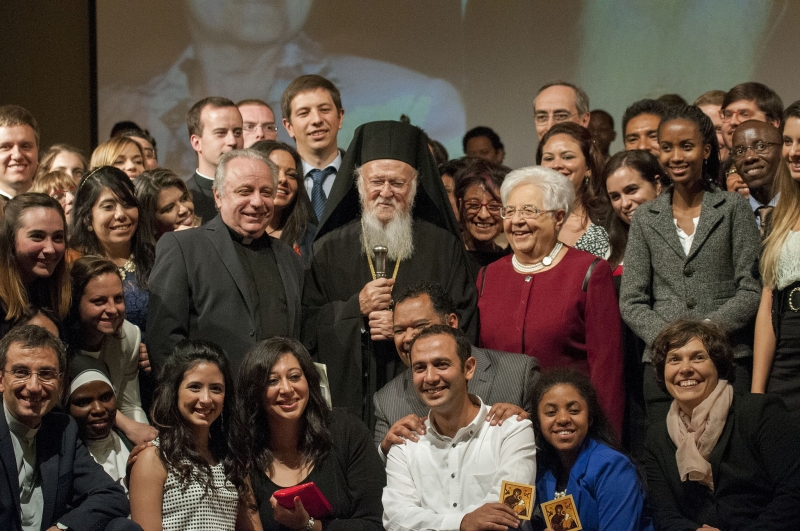
Dec 13, 2016 | Non categorizzato
 “Your Holiness, the Focolare community of Bari salutes you with great affection! We are so gladdened by your visit to our city, which is a bridge between East and West and has a special ecumenical calling. Your presence encourages us to work even more at the service of the full and visible unity among Christians, and for the protection of Creation. The charism of unity that you love so much, spurs us on to work in our own environments as apostles of dialogue who are aware that only unity, love and brotherhood will be able to respond to the challenges of today’s world.” This was the welcoming message from the local Focolare community in Bari as it welcomed the Ecumenical Patriarch Bartholomew on his December 5-6 visit to their city for the feast day of St. Nicholas. It is a “highly significant ecumenical event,” said representatives of the diocese, “that puts the Church of Bari-Bitonto on the map and contributes to dialogue between the Catholic Church and the Orthodox Church.” On December 5th, at the Basilica of St Nicholas the Patriarch gave the opening address for the beginning of the 2016-2017 academic school year of the Pugliese School of Theology, and received the Saint Nicholas Prize from the Ecumenical Institute. He had been awarded the Prize in recognition of his 25 years of ecumenical efforts as a “patient and courageous artisan of the culture of communion.” Pope Francis sent a congratulatory message that was read during the award ceremony in which he praised the efforts of the Patriarch for “the promotion of ever greater communion among those who believe in Christ.” In his keynote address entitled, Adriatic and Ionian Seas of Communion, Bartholomew reflected on the idea of communion, beginning from its theological significance as koinonia, as a “common participation of grace, love and communion in the life of God, that becomes experience itself of ‘being in relationship’.” He also remembered the Great Council of Crete held in June 2016 when “Our Holy Orthodox Church manifested its “communion” [emphasising the word] by unanimous decision of all the Patriarchs of the auto-cephalous Orthodox Churches.” He also underscored the need for an economy of solidarity, saying that “there needs to be an economy of communion which is all embracing and which does not create social discontent in the host country.” On December 6th, at the conclusion of the solemn Eucharistic celebration, presided by Archbishop Franco Cacucci in the same Basilica, Patriarch Bartholomew gave a second talk: “We have also come as pilgrims to the tomb of this great saint,” he said, “to invoke his intercession, his prayer and his support in our Patriarchal service, to thank God with him, for our 25 years of service to the unity of the Church, on St Andrew’s Throne; but also to be strong witnesses to the need of encounter among the disciples of Christ so that the world may believe, and we may one day not so far away, break the Bread of Life together and drink from the same Chalice of Salvation.” Fausta Giardina and Roberto Lago, from the Focolare in Puglia, write: “We’re breathing in a beautiful ecumenical atmosphere in our city during these days. The Patriarch’s visit and the special celebrations have been heartfelt by everyone.” The Focolare’s friendship with the Patriarch is longstanding. On October 26, 2016, Sophia University Institute, Loppiano, conferred its first Honorary Doctorate in the Culture of Unity to Patriarch Bartholomew. On that occasion he said: “One of the ideals of the Focolare Movement is the unity of the Church. Chiara Lubich and her collaborators did much work. She made 23 visits to [Patriarch] Athenagoras in Constantinople. Then she began to visit Dimitrios and then me. In 2008, I visited Chiara at the Gimelli Hospital a few days before her death. I’m sure that she’s with us this evening, with her spiritual presence and with her prayer. She rejoices with us and prays for the unity between our Churches.”
“Your Holiness, the Focolare community of Bari salutes you with great affection! We are so gladdened by your visit to our city, which is a bridge between East and West and has a special ecumenical calling. Your presence encourages us to work even more at the service of the full and visible unity among Christians, and for the protection of Creation. The charism of unity that you love so much, spurs us on to work in our own environments as apostles of dialogue who are aware that only unity, love and brotherhood will be able to respond to the challenges of today’s world.” This was the welcoming message from the local Focolare community in Bari as it welcomed the Ecumenical Patriarch Bartholomew on his December 5-6 visit to their city for the feast day of St. Nicholas. It is a “highly significant ecumenical event,” said representatives of the diocese, “that puts the Church of Bari-Bitonto on the map and contributes to dialogue between the Catholic Church and the Orthodox Church.” On December 5th, at the Basilica of St Nicholas the Patriarch gave the opening address for the beginning of the 2016-2017 academic school year of the Pugliese School of Theology, and received the Saint Nicholas Prize from the Ecumenical Institute. He had been awarded the Prize in recognition of his 25 years of ecumenical efforts as a “patient and courageous artisan of the culture of communion.” Pope Francis sent a congratulatory message that was read during the award ceremony in which he praised the efforts of the Patriarch for “the promotion of ever greater communion among those who believe in Christ.” In his keynote address entitled, Adriatic and Ionian Seas of Communion, Bartholomew reflected on the idea of communion, beginning from its theological significance as koinonia, as a “common participation of grace, love and communion in the life of God, that becomes experience itself of ‘being in relationship’.” He also remembered the Great Council of Crete held in June 2016 when “Our Holy Orthodox Church manifested its “communion” [emphasising the word] by unanimous decision of all the Patriarchs of the auto-cephalous Orthodox Churches.” He also underscored the need for an economy of solidarity, saying that “there needs to be an economy of communion which is all embracing and which does not create social discontent in the host country.” On December 6th, at the conclusion of the solemn Eucharistic celebration, presided by Archbishop Franco Cacucci in the same Basilica, Patriarch Bartholomew gave a second talk: “We have also come as pilgrims to the tomb of this great saint,” he said, “to invoke his intercession, his prayer and his support in our Patriarchal service, to thank God with him, for our 25 years of service to the unity of the Church, on St Andrew’s Throne; but also to be strong witnesses to the need of encounter among the disciples of Christ so that the world may believe, and we may one day not so far away, break the Bread of Life together and drink from the same Chalice of Salvation.” Fausta Giardina and Roberto Lago, from the Focolare in Puglia, write: “We’re breathing in a beautiful ecumenical atmosphere in our city during these days. The Patriarch’s visit and the special celebrations have been heartfelt by everyone.” The Focolare’s friendship with the Patriarch is longstanding. On October 26, 2016, Sophia University Institute, Loppiano, conferred its first Honorary Doctorate in the Culture of Unity to Patriarch Bartholomew. On that occasion he said: “One of the ideals of the Focolare Movement is the unity of the Church. Chiara Lubich and her collaborators did much work. She made 23 visits to [Patriarch] Athenagoras in Constantinople. Then she began to visit Dimitrios and then me. In 2008, I visited Chiara at the Gimelli Hospital a few days before her death. I’m sure that she’s with us this evening, with her spiritual presence and with her prayer. She rejoices with us and prays for the unity between our Churches.”
Gustavo Clariá
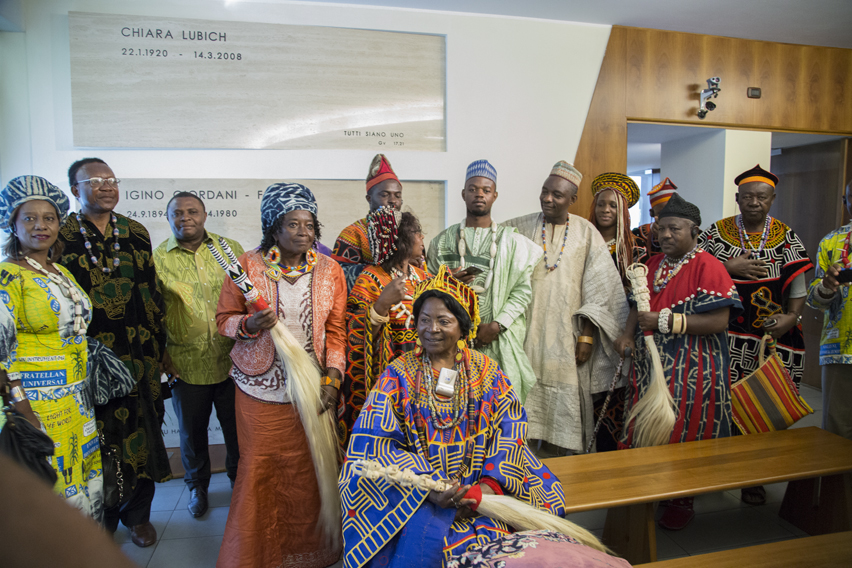
Dec 12, 2016 | Focolare Worldwide
 “Through the Focolare Movement, God has visited the Bangwa people (…).They have lived the pact of mutual love with the Bangwa people and taught them the spirituality of unity and universal brotherhood (…).They have reduced the infant mortality within these years from close to 90% to almost zero; they have tirelessly worked hard to eliminate the deadly Tsetse Fly that made Fontem look like the valley of death; thousands of Lebialem people would not have had a good education without them; good health facilities have been at our door steps all these years (…).Now is the time to celebrate the love of God for all the Lebialem people”. These quotes are taken from the letter written by Mgsr. Andrew Nkea, Bishop of Mamfe to announce the year 2016 as a Jubilee year of thanksgiving to God for the arrival of the Focolare Movement amongst the Bangwa people. In this letter, one finds a prayer to be recited daily together the Bishop’s words that highlight the most important moments of these 50 years of history and recall the protagonists and all those who gave their lives towards them. It also expresses the feelings of the Fons – the kings of the territories of this region -,of persons holding positions of responsibility and of the entire population.
“Through the Focolare Movement, God has visited the Bangwa people (…).They have lived the pact of mutual love with the Bangwa people and taught them the spirituality of unity and universal brotherhood (…).They have reduced the infant mortality within these years from close to 90% to almost zero; they have tirelessly worked hard to eliminate the deadly Tsetse Fly that made Fontem look like the valley of death; thousands of Lebialem people would not have had a good education without them; good health facilities have been at our door steps all these years (…).Now is the time to celebrate the love of God for all the Lebialem people”. These quotes are taken from the letter written by Mgsr. Andrew Nkea, Bishop of Mamfe to announce the year 2016 as a Jubilee year of thanksgiving to God for the arrival of the Focolare Movement amongst the Bangwa people. In this letter, one finds a prayer to be recited daily together the Bishop’s words that highlight the most important moments of these 50 years of history and recall the protagonists and all those who gave their lives towards them. It also expresses the feelings of the Fons – the kings of the territories of this region -,of persons holding positions of responsibility and of the entire population. 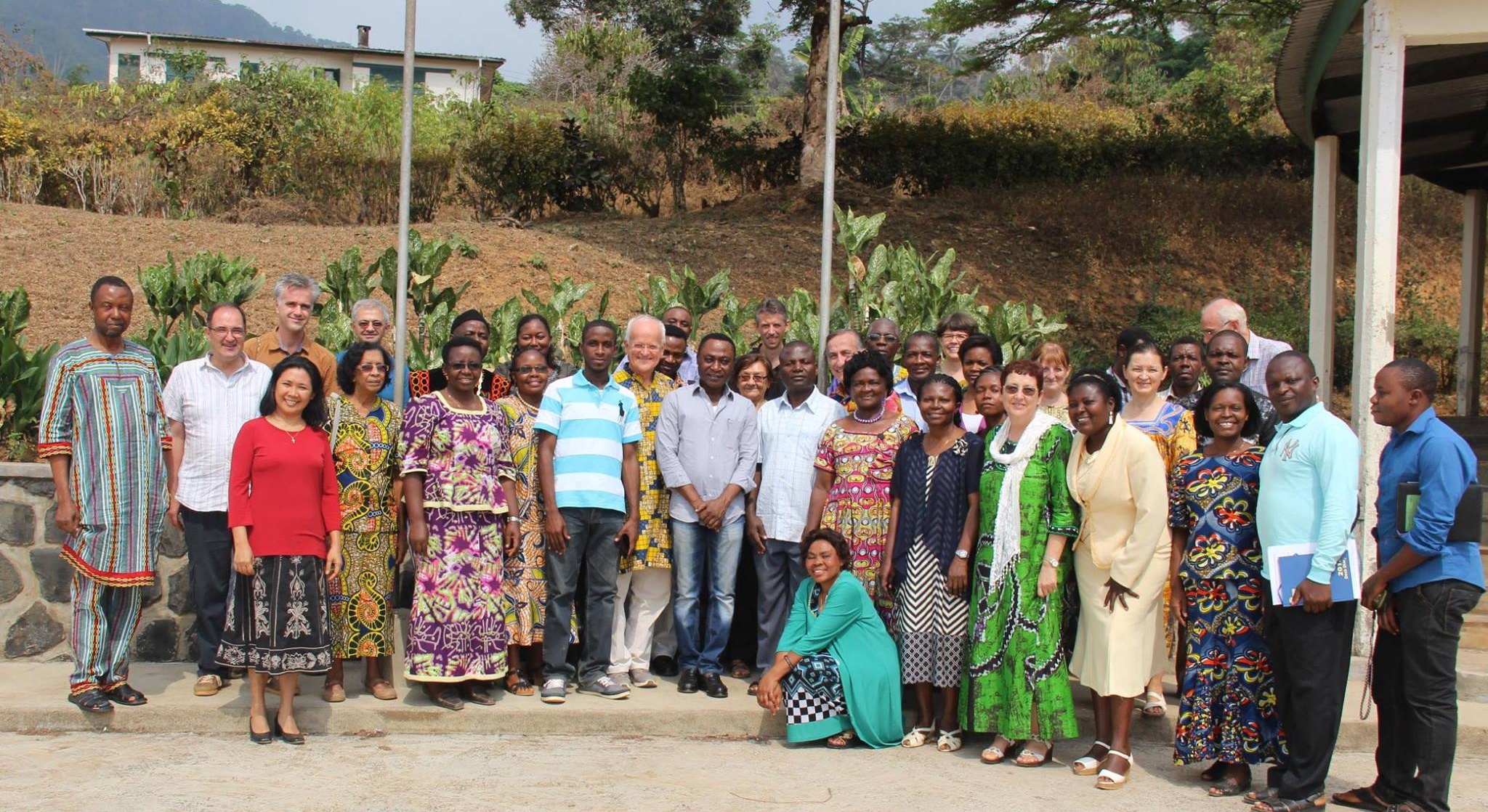 The first focolarini doctors arrived in Fontem in 1966. The state of emergency of the Bangwa people became a priority for the whole Focolare Movement. Chiara Lubich paid her first visit to Fontem that same year and she was given a great welcome by the king, Fon Defang, important personalities and the whole population. She visited Fontem another two times. In May 2000, when she addressed all the Bangwa, gathered in the wide open space in front of the Fon’s palace, she said: “I feel that I cannot leave you without having made a solemn pact with you. A strong and binding pact of mutual love. It is a sort of oath by which we promise to be always fully at peace with one another and to be always ready to make peace and start again whenever our promise is broken”. This jubilee year will come to its end with a solemn celebration to be held from the 14 to 17 December 2016. The Fons and other heads of institutions have been actively involved in the preparation of this celebration, which was presented to the Prime Minister, Philémon Yang at Yaoundé last October. Since then, it is being recognized as a national event. The programme includes: the success of Our Lady Seat of Wisdom College, which, with 500 students per year, is among the best five pre-university institutions in the anglophone Cameroonian system; life and work experiences of the Focolare Movement in Fontem; an International Conference on Interreligious Dialogue between Christianity and the African Traditional Religion, in these last 50 experience among the Bangwa people. Today, the inculturation of Christianity seems to have become more obvious. Martin Nkafu, the African philosopher and theologian, director of the department of Human and Social Sciences in the International Research Area at the Pontifical Lateran University in Rome, says: “Christianity has not changed the people’s mentality; a Bangwa who adheres to Christ keeps his personality, his culture, and has an integrated vision of reality; and as Pope John Paul II said in Nairobi in 1982, this allows him to be authentically African and deeply Christian”.
The first focolarini doctors arrived in Fontem in 1966. The state of emergency of the Bangwa people became a priority for the whole Focolare Movement. Chiara Lubich paid her first visit to Fontem that same year and she was given a great welcome by the king, Fon Defang, important personalities and the whole population. She visited Fontem another two times. In May 2000, when she addressed all the Bangwa, gathered in the wide open space in front of the Fon’s palace, she said: “I feel that I cannot leave you without having made a solemn pact with you. A strong and binding pact of mutual love. It is a sort of oath by which we promise to be always fully at peace with one another and to be always ready to make peace and start again whenever our promise is broken”. This jubilee year will come to its end with a solemn celebration to be held from the 14 to 17 December 2016. The Fons and other heads of institutions have been actively involved in the preparation of this celebration, which was presented to the Prime Minister, Philémon Yang at Yaoundé last October. Since then, it is being recognized as a national event. The programme includes: the success of Our Lady Seat of Wisdom College, which, with 500 students per year, is among the best five pre-university institutions in the anglophone Cameroonian system; life and work experiences of the Focolare Movement in Fontem; an International Conference on Interreligious Dialogue between Christianity and the African Traditional Religion, in these last 50 experience among the Bangwa people. Today, the inculturation of Christianity seems to have become more obvious. Martin Nkafu, the African philosopher and theologian, director of the department of Human and Social Sciences in the International Research Area at the Pontifical Lateran University in Rome, says: “Christianity has not changed the people’s mentality; a Bangwa who adheres to Christ keeps his personality, his culture, and has an integrated vision of reality; and as Pope John Paul II said in Nairobi in 1982, this allows him to be authentically African and deeply Christian”. Among the initiatives achieved during this year, one finds the Fons’ pilgrimage to Rome. They came last September to celebrate the Jubilee of Mercy with Pope Francis and to visit the places of Mafua Ndem, “the queen sent by God”, as Fon Lucas Njifua of Fontem called Chiara Lubich on her last visit to Cameroon. A competition, entitled “God’s intervention in the history and life of the Nweh Mundani people” has also been organized and promoted throughout the year among students in all primary and secondary schools. 4000 people were involved in this project, which included poetry, songs, literary compositions and quizes; 700 students from 21 schools participated through their various works. This event mobilizes and brings together even the Bangwa people who during the last years left Cameroon. A Development Commission, with members in Cameroon and in other countries, has started to dialogue with State bodies in view of concrete actions regarding education, health, youth and women’s status. This 50th anniversary celebration is being followed by the Focolare Community world-wide. The president, Maria Voce has closely accompanied the preparation for it, while Jesús Morán and the Central council members responsible for Africa will be present in Fontem. Sources: Press releases (SIF)
Among the initiatives achieved during this year, one finds the Fons’ pilgrimage to Rome. They came last September to celebrate the Jubilee of Mercy with Pope Francis and to visit the places of Mafua Ndem, “the queen sent by God”, as Fon Lucas Njifua of Fontem called Chiara Lubich on her last visit to Cameroon. A competition, entitled “God’s intervention in the history and life of the Nweh Mundani people” has also been organized and promoted throughout the year among students in all primary and secondary schools. 4000 people were involved in this project, which included poetry, songs, literary compositions and quizes; 700 students from 21 schools participated through their various works. This event mobilizes and brings together even the Bangwa people who during the last years left Cameroon. A Development Commission, with members in Cameroon and in other countries, has started to dialogue with State bodies in view of concrete actions regarding education, health, youth and women’s status. This 50th anniversary celebration is being followed by the Focolare Community world-wide. The president, Maria Voce has closely accompanied the preparation for it, while Jesús Morán and the Central council members responsible for Africa will be present in Fontem. Sources: Press releases (SIF)
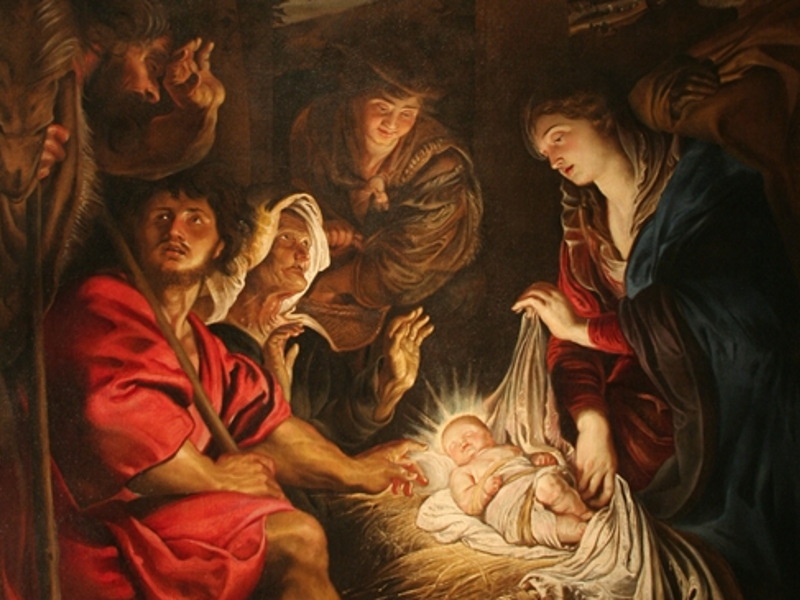
Dec 11, 2016 | Non categorizzato
 For the ancients Christ was a king. But the real Christ was outside normal schemes. He was born in a stable among shephereds and beasts, and his mother was the daughter of peasants. Whereas other sovereigns loomed from above, stepping down from carriages and thrones to rule, he came from below, from the lowest class, to serve. He was under everyone so that he could be the universal servant: His kingliness consisted of service. Everything is simple and enchanting as a fairy tale in this birth of a boy child in the middle of a windy night, in the middle of the nights of time. And everything is tragic and revolutionary, because this birth foreshadows a scaffold. This son of the king, son of God, comes forth from humble beings in a makeshift shelter, like some refugee pushed away by farthing folk and unnoticed by the wretched: this is by no means a new revolution. When the Saviour appeared, a great light lit up the night.The night remains, but so does the light. It’s always Christmas in the Christian world, and Christmas brings joy amidst tears still today. When God descends among us, we re-ascend to God; He humanizes and we are divinized. The meeting point is His heart. Jesus was born in a stall to demonstrate that he could also be born in our heart that is sometimes a rather squallid place. And whenever he’s born in our heart the angels rise to sing as they did over the stable that night while the moon shone in the night and peace rained down on the earth. In a similar way, the Word – Reason – incarnates among us today and can transform a stall into a Heavenly anti-chamber. Igino Giordani Le Feste S.E.I. (1954) p. 36.
For the ancients Christ was a king. But the real Christ was outside normal schemes. He was born in a stable among shephereds and beasts, and his mother was the daughter of peasants. Whereas other sovereigns loomed from above, stepping down from carriages and thrones to rule, he came from below, from the lowest class, to serve. He was under everyone so that he could be the universal servant: His kingliness consisted of service. Everything is simple and enchanting as a fairy tale in this birth of a boy child in the middle of a windy night, in the middle of the nights of time. And everything is tragic and revolutionary, because this birth foreshadows a scaffold. This son of the king, son of God, comes forth from humble beings in a makeshift shelter, like some refugee pushed away by farthing folk and unnoticed by the wretched: this is by no means a new revolution. When the Saviour appeared, a great light lit up the night.The night remains, but so does the light. It’s always Christmas in the Christian world, and Christmas brings joy amidst tears still today. When God descends among us, we re-ascend to God; He humanizes and we are divinized. The meeting point is His heart. Jesus was born in a stall to demonstrate that he could also be born in our heart that is sometimes a rather squallid place. And whenever he’s born in our heart the angels rise to sing as they did over the stable that night while the moon shone in the night and peace rained down on the earth. In a similar way, the Word – Reason – incarnates among us today and can transform a stall into a Heavenly anti-chamber. Igino Giordani Le Feste S.E.I. (1954) p. 36.
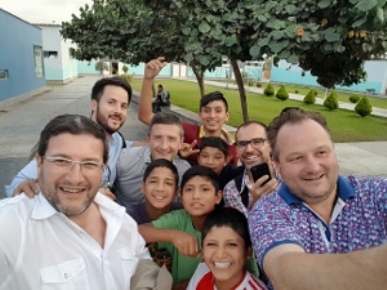
Dec 9, 2016 | Non categorizzato
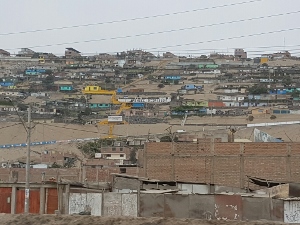 Lying at the outskirts of Lima is a district that takes its name from the pre-Inca Sanctuary built in Pachacamac (in the quecha language meaning ”god who created the earth”). «We got here with the objective of starting up a business run according to the practices of the Economy of Communion (EoC), the profits of which are able to support a rehab center for children saved from the streets and with drug addiction problems, » recounted Germán Jorge of the EoC Argentina. The Mundo Libre Institute is the only one of its kind existing in Perù today. It has been awarded international recognition for the professionalism with which it has performed its activities, but despite the possibility to host 100 children, today it supports only 40 due to lack of resources. Its foundress, Marilú Gonzalez Posada, has lived for 32 years with this objective. Her great concern regards the Institute’s sustainability, a problem common to all the social organizations that are unable to survive only on the generosity of people and international cooperation. One of the laboratories of Mundo Libre produces typical Peruvian sweets: the “chocotejas.” «The business plan we are working on, specifically involves this project to be implemented at the end of 2017, together with Solidarpole (which promotes different solidarity business projects and has proposed that the Economy of Communion be the choice) and AMU Luxembourg (that offered finances for the renovation of a barn and purchase of machinery). We now have to coordinate the resources. It is a challenge to EoC that has a lot to offer, and a communion which is not “imposed” but “generated” in response to a first free decision. This is what we have tried to do with each person we encounter along the way this week.». When the armed Spanish arrived on horseback in these lands to conquer the Pachacamac Totem – the indios who had never seen horses before, believed they were the gods who had come to replace their god, and did not counter with any resistance. History has left its mark on their culture. «We could see this in the relational difficulties. So our main commitment was to give room to all, in the effort to break the logic of the “European conquistador” (or the descendants of these), and of passive and underdog aborigines. As the days passed, and on the basis of relationships of trust which slowly developed, we started to overcome these relational dynamics and build new rapports of reciprocity.»
Lying at the outskirts of Lima is a district that takes its name from the pre-Inca Sanctuary built in Pachacamac (in the quecha language meaning ”god who created the earth”). «We got here with the objective of starting up a business run according to the practices of the Economy of Communion (EoC), the profits of which are able to support a rehab center for children saved from the streets and with drug addiction problems, » recounted Germán Jorge of the EoC Argentina. The Mundo Libre Institute is the only one of its kind existing in Perù today. It has been awarded international recognition for the professionalism with which it has performed its activities, but despite the possibility to host 100 children, today it supports only 40 due to lack of resources. Its foundress, Marilú Gonzalez Posada, has lived for 32 years with this objective. Her great concern regards the Institute’s sustainability, a problem common to all the social organizations that are unable to survive only on the generosity of people and international cooperation. One of the laboratories of Mundo Libre produces typical Peruvian sweets: the “chocotejas.” «The business plan we are working on, specifically involves this project to be implemented at the end of 2017, together with Solidarpole (which promotes different solidarity business projects and has proposed that the Economy of Communion be the choice) and AMU Luxembourg (that offered finances for the renovation of a barn and purchase of machinery). We now have to coordinate the resources. It is a challenge to EoC that has a lot to offer, and a communion which is not “imposed” but “generated” in response to a first free decision. This is what we have tried to do with each person we encounter along the way this week.». When the armed Spanish arrived on horseback in these lands to conquer the Pachacamac Totem – the indios who had never seen horses before, believed they were the gods who had come to replace their god, and did not counter with any resistance. History has left its mark on their culture. «We could see this in the relational difficulties. So our main commitment was to give room to all, in the effort to break the logic of the “European conquistador” (or the descendants of these), and of passive and underdog aborigines. As the days passed, and on the basis of relationships of trust which slowly developed, we started to overcome these relational dynamics and build new rapports of reciprocity.» The «Formulation of the “Business administration guidelines” helped in setting the person at the core of economic activities, without foregoing professionalism and the efficiency necessary to reach the targets. After passing days together, our interlocutors at the Mundo Libre Institute said that they already felt part of the Economy of Communion project, which in a sense, they had already unconsciously put into practice and which they now want to propose to their own employees and also educate the youth in these principles. ‘This is our challenge in 2017’». «The horses not originating from Perù, had to develop the capacity to walk on sand in these desert zones. Throughout these 500 years an equine breed has developed with the characteristic concentric-circles gait which allows them to move freely in these environments. We are like the first horses and are making a big effort to learn how to live the “culture of giving” in communion. But if we develop these abilities, many others will slowly follow in many parts of the globe. They will carry this new culture in their blood, and will succeed in changing the world.» Gustavo Clariá
The «Formulation of the “Business administration guidelines” helped in setting the person at the core of economic activities, without foregoing professionalism and the efficiency necessary to reach the targets. After passing days together, our interlocutors at the Mundo Libre Institute said that they already felt part of the Economy of Communion project, which in a sense, they had already unconsciously put into practice and which they now want to propose to their own employees and also educate the youth in these principles. ‘This is our challenge in 2017’». «The horses not originating from Perù, had to develop the capacity to walk on sand in these desert zones. Throughout these 500 years an equine breed has developed with the characteristic concentric-circles gait which allows them to move freely in these environments. We are like the first horses and are making a big effort to learn how to live the “culture of giving” in communion. But if we develop these abilities, many others will slowly follow in many parts of the globe. They will carry this new culture in their blood, and will succeed in changing the world.» Gustavo Clariá
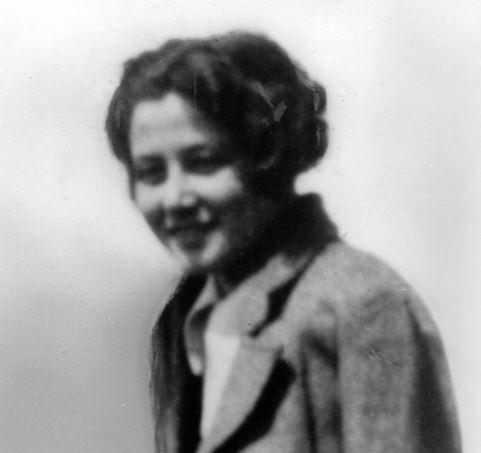
Dec 7, 2016 | Non categorizzato
 “I was 19 years old and had a great thirst for God.” Her thirst was so strong that every time she met a priest she would tell him: “Talk to me about God.” Urged by that thirst she intended to study at the Catholic University, but since her family did not have the financial means, she participated in a lottery to obtain a scholarship, but she was one point short. “I remember the cry I had, because I was thinking that at the Catholic University they would talk about God. And I recall that in the midst of that cry as I sat in the lounge with my mother, I heard someone inside me say: “I will be your Teacher.” A few months later she went to Loreto with a young women’s group that she belonged to. There is a very large shrine located there in central Italy which is said to contain the little house of Nazareth where the Holy Family lived. Chiara recounts that when she stepped into that little house, something extraordinary happened within her. “I was overcome with emotion, such great emotion that it seemed like was being crushed by the Divine that I contemplated all around me. The idea had come alive inside me that Jesus had perhaps walked over there, that those walls had listened to the echo of Mary’s songs, Joseph, the Annunciation, the angel…. the feeling was so alive that all I could do was cry.” That cry was provoked “by the weight of the Divine that crushed down on me.” She said that during the days in Loreto, “whenever I could, I escaped” to the little house and experienced the same strong sensation that God was opening a new path that had to do with that sacred place with the Holy Family that dwelled there. On the day before her departure, Chiara went to the Shrine and found it filled with people. She stood in the back of the church and, in that moment she heard the voice of God in her heart: “A host of virgins will follow you.” Over the years, she would realize that these were the first signs of the new path that the Lord was preparing: the focolare. Four years later, in 1943, something else happened, a simple but decisive event. Her mother asked Chiara’s younger sisters to fetch some milk, but it was cold outside and they didn’t want to go. She didn’t ask Chiara because she wanted her to study, but Chiara felt urged to love, and offered to go get the milk. “Along the way,” she says, “I felt as if God was saying to me; Give yourself to me, give your whole self to me.” I stopped surprised. I went to get the milk, then returned home and wrote a very fiery letter to a priest,” in which I recounted to him what I was feeling in my soul. At that time, when someone wanted to consecrate themself to God, they were advised to do it for a certain period of time and then renew each year until it became a more and more certain commitment. Chiara was so determined in that letter and so taken by God’s love, that she managed to convince the priest to give her permission to consecrate herself to God for life. It was December 7, 1943 when she went alone to early morning Mass, as a “big storm was raging.” “I had the impression that the world was against me,” Chiara would recall. “A small pew had been prepared for me near to the altar, and I had a small missal in my hand. They made me recite the formula that I give myself totally to God forever. I was so happy, I didn’t realize what I was doing, because I was young. Only after pronouncing the formula I had the impression that a bridge had fallen behind, that I could never turn back because now I belonged all to God. And there one tear fell on the small missal. But the happiness was just immense!” Chiara concluded her recount of that December 7, 1943, which marks the beginning of the Focolare Movement: “I marry God, so I expect everything possible good thing. It will be a divine adventure. I marry God! And later we saw that it had really been just that.” Gustavo Clariá
“I was 19 years old and had a great thirst for God.” Her thirst was so strong that every time she met a priest she would tell him: “Talk to me about God.” Urged by that thirst she intended to study at the Catholic University, but since her family did not have the financial means, she participated in a lottery to obtain a scholarship, but she was one point short. “I remember the cry I had, because I was thinking that at the Catholic University they would talk about God. And I recall that in the midst of that cry as I sat in the lounge with my mother, I heard someone inside me say: “I will be your Teacher.” A few months later she went to Loreto with a young women’s group that she belonged to. There is a very large shrine located there in central Italy which is said to contain the little house of Nazareth where the Holy Family lived. Chiara recounts that when she stepped into that little house, something extraordinary happened within her. “I was overcome with emotion, such great emotion that it seemed like was being crushed by the Divine that I contemplated all around me. The idea had come alive inside me that Jesus had perhaps walked over there, that those walls had listened to the echo of Mary’s songs, Joseph, the Annunciation, the angel…. the feeling was so alive that all I could do was cry.” That cry was provoked “by the weight of the Divine that crushed down on me.” She said that during the days in Loreto, “whenever I could, I escaped” to the little house and experienced the same strong sensation that God was opening a new path that had to do with that sacred place with the Holy Family that dwelled there. On the day before her departure, Chiara went to the Shrine and found it filled with people. She stood in the back of the church and, in that moment she heard the voice of God in her heart: “A host of virgins will follow you.” Over the years, she would realize that these were the first signs of the new path that the Lord was preparing: the focolare. Four years later, in 1943, something else happened, a simple but decisive event. Her mother asked Chiara’s younger sisters to fetch some milk, but it was cold outside and they didn’t want to go. She didn’t ask Chiara because she wanted her to study, but Chiara felt urged to love, and offered to go get the milk. “Along the way,” she says, “I felt as if God was saying to me; Give yourself to me, give your whole self to me.” I stopped surprised. I went to get the milk, then returned home and wrote a very fiery letter to a priest,” in which I recounted to him what I was feeling in my soul. At that time, when someone wanted to consecrate themself to God, they were advised to do it for a certain period of time and then renew each year until it became a more and more certain commitment. Chiara was so determined in that letter and so taken by God’s love, that she managed to convince the priest to give her permission to consecrate herself to God for life. It was December 7, 1943 when she went alone to early morning Mass, as a “big storm was raging.” “I had the impression that the world was against me,” Chiara would recall. “A small pew had been prepared for me near to the altar, and I had a small missal in my hand. They made me recite the formula that I give myself totally to God forever. I was so happy, I didn’t realize what I was doing, because I was young. Only after pronouncing the formula I had the impression that a bridge had fallen behind, that I could never turn back because now I belonged all to God. And there one tear fell on the small missal. But the happiness was just immense!” Chiara concluded her recount of that December 7, 1943, which marks the beginning of the Focolare Movement: “I marry God, so I expect everything possible good thing. It will be a divine adventure. I marry God! And later we saw that it had really been just that.” Gustavo Clariá

 Fiorella: “Right from the start I found that Andrea was an atheist and very popular with the girls. I decided in my heart that it was better to let him go. But then in the disco I always found myself in his arms.” Andrea: “Fiorella was really one of the many. Before telling her – to my own great surprise – that I might actually love her, two years went by.” Fiorella: “I was aware that the relationship wasn’t going anywhere. There wasn’t dialogue and we didn’t make any plans. I had become Andrea’s shadow, without personanlity or dreams. Disappointed I decided to leave him. To evade him, I changed jobs and moved to another city, but I soon began to feel alone and full of sadness. One morning, nearly desperate, I found myself in the doorway of a small church, yelling out why to that God whom I had left for some time. When I job contract ended, I returned home to my relatives. A few days later, a friend whom I hadn’t seen in a while couldn’t wait to talk to me about God, and invited me to a several-day gathering with people who were trying to live the Gospel. As I stepped into the hall I was struck by a sign they had hung: “God is Love”. I wondered how God could love someone like me with my heavy make-up, heels size 12 and fiery red hair. But right from the first day I felt his presence, I knew that I had discovered what I was always looking for, and I ran to pour out all my miseries in the confessional with the intention of beginning to live the Gospel. After that first “Mariapolis” the Eucharist became the vital force of my life.” Andrea:”Fiorella was changed. Now she talked, but what’s worse – at least from my point of view back then – she talked about God. Trying to be tollerant, I decided not to dump her, but I was jealous of this God who was stealing her from me. I was struck by her serenity, her enjoyment of life, her renewed love for me that filled my heart. And what if she really loved me? Surprised at myself I even reached the point of asking her to marry me, even with the understanding of doing it in church. Afterwards, an accident at work left me immobile. The only diversion was visiting those families that Fiorella began to get together with. As soon as I could, I decided to visit one of them to find out the reason for this interest in me. We talked about everything, even the faith until three o’clock in the morning. I was fascinated. “These people are serious about it!” I said to myself, I want to live like them too. I want to be the first to love too.” One Saturday I found the sink filled with dishes. Fiorella was out at work. I closed the blinds so my neighbors couldn’t see me and began to wash the dishes to show her my love in a concrete way. I even tried to iron, although it took me two hours to press one shirt. And as I did all this I began to notice a certainty blossoming inside me: God exists, God is Love. With this new faith I suddenly felt the need to pray. I told Fiorella and suggested we do it together. With a bit of embarrassment and the lights turned off, each of us on our own side of the bed, that night we prayed together for the first time.”
Fiorella: “Right from the start I found that Andrea was an atheist and very popular with the girls. I decided in my heart that it was better to let him go. But then in the disco I always found myself in his arms.” Andrea: “Fiorella was really one of the many. Before telling her – to my own great surprise – that I might actually love her, two years went by.” Fiorella: “I was aware that the relationship wasn’t going anywhere. There wasn’t dialogue and we didn’t make any plans. I had become Andrea’s shadow, without personanlity or dreams. Disappointed I decided to leave him. To evade him, I changed jobs and moved to another city, but I soon began to feel alone and full of sadness. One morning, nearly desperate, I found myself in the doorway of a small church, yelling out why to that God whom I had left for some time. When I job contract ended, I returned home to my relatives. A few days later, a friend whom I hadn’t seen in a while couldn’t wait to talk to me about God, and invited me to a several-day gathering with people who were trying to live the Gospel. As I stepped into the hall I was struck by a sign they had hung: “God is Love”. I wondered how God could love someone like me with my heavy make-up, heels size 12 and fiery red hair. But right from the first day I felt his presence, I knew that I had discovered what I was always looking for, and I ran to pour out all my miseries in the confessional with the intention of beginning to live the Gospel. After that first “Mariapolis” the Eucharist became the vital force of my life.” Andrea:”Fiorella was changed. Now she talked, but what’s worse – at least from my point of view back then – she talked about God. Trying to be tollerant, I decided not to dump her, but I was jealous of this God who was stealing her from me. I was struck by her serenity, her enjoyment of life, her renewed love for me that filled my heart. And what if she really loved me? Surprised at myself I even reached the point of asking her to marry me, even with the understanding of doing it in church. Afterwards, an accident at work left me immobile. The only diversion was visiting those families that Fiorella began to get together with. As soon as I could, I decided to visit one of them to find out the reason for this interest in me. We talked about everything, even the faith until three o’clock in the morning. I was fascinated. “These people are serious about it!” I said to myself, I want to live like them too. I want to be the first to love too.” One Saturday I found the sink filled with dishes. Fiorella was out at work. I closed the blinds so my neighbors couldn’t see me and began to wash the dishes to show her my love in a concrete way. I even tried to iron, although it took me two hours to press one shirt. And as I did all this I began to notice a certainty blossoming inside me: God exists, God is Love. With this new faith I suddenly felt the need to pray. I told Fiorella and suggested we do it together. With a bit of embarrassment and the lights turned off, each of us on our own side of the bed, that night we prayed together for the first time.”  Fiorella: “After twelve years of milestones and setbacks new beginnings and many joys because of the new love that was growing between us, and with the birth of our two children, Maria Giovanna and Ivan, we received an invitation to move to Honduras to help support the nascent Focolare community. Jesus was asking our family to follow Him, giving up our house, our job, our relatives. A totally unknown world was awaiting us in Tegucigalpa with different customs, language and culture, along with the difficult life of the Honduran people who were knocking at our door each day. We entered so deeply into “making ourselves one” and being immersed in their lives in a deep experience of inculturation. The fruits of evangelization were many: vocations, marriages convalidated, families put together again, people coming back to God and the growth of brotherhood. After eight years we left behind a community that had been built piece by piece, based on concrete love that we tried to show and drew in our children into who, in the meantime, had become three. Andrea: “In fact, our on Juan Diego was born while we were in Honduras. We named him in honour of the Virgin of Guadalupe to whom we continue to entrust the so generous people that changed our life.”
Fiorella: “After twelve years of milestones and setbacks new beginnings and many joys because of the new love that was growing between us, and with the birth of our two children, Maria Giovanna and Ivan, we received an invitation to move to Honduras to help support the nascent Focolare community. Jesus was asking our family to follow Him, giving up our house, our job, our relatives. A totally unknown world was awaiting us in Tegucigalpa with different customs, language and culture, along with the difficult life of the Honduran people who were knocking at our door each day. We entered so deeply into “making ourselves one” and being immersed in their lives in a deep experience of inculturation. The fruits of evangelization were many: vocations, marriages convalidated, families put together again, people coming back to God and the growth of brotherhood. After eight years we left behind a community that had been built piece by piece, based on concrete love that we tried to show and drew in our children into who, in the meantime, had become three. Andrea: “In fact, our on Juan Diego was born while we were in Honduras. We named him in honour of the Virgin of Guadalupe to whom we continue to entrust the so generous people that changed our life.” 








 A series of events are to be held around the world in 2017 that will highlight the value of the family from the perspective of “universal brotherhood” and will bear witness to the richness of cultural diversity, through the ideal of unity incarnated in family life. The main event will be held in
A series of events are to be held around the world in 2017 that will highlight the value of the family from the perspective of “universal brotherhood” and will bear witness to the richness of cultural diversity, through the ideal of unity incarnated in family life. The main event will be held in 




 One of the seminarians writes: “I was very struck by one of the main points of the spirituality of
One of the seminarians writes: “I was very struck by one of the main points of the spirituality of 









 I started by trying to welcome some of my students with love, and slowly I saw that their tears dried up. I realised that to really “encounter” the world of the little ones, we have to approach each child with attention, and learn to see things through their eyes, making use of all our energies and skills to create important relationships. With other operators and professionals driven by the same educative style, I then tried to start up procedures in which the children and their families experience really educational relationships. From this cooperation the idea of a book came up, to narrate not only the stories of the “invisible children,” but also about good practices and redemptive pathways. “Children in Trouble,” said an oncologist, a social worker, a paediatrician and me, who curated the book, wants to bring out those seeds of hope and positive relations that become in some way, generators of resilience. Through that resource, many children when suitably aided are able to concretise and reach good recovery levels. The same happened to Emma. When she was eight years of age, overwhelmed by the split up of the family she had tried to commit suicide. Recently, after contacting me on Facebook, she wrote: “Dear teacher, how I miss you and the many moments we spent together! Do you remember when you read stories to us, taking on the voice of the characters? And the school trip to the sea? These will certainly never be erased from my heart and the love you showed me when all was dark around me. When I was in the hospital after the tragic event, you were there and didn’t ask me why I had done it. You were there, and that’s all. Then I returned to school with those wounds and you made everyone make those bracelets with coloured threads… but I knew that it was to help me hide those scars I didn’t want others to see…”(2) At the presentation of the book in universities and seminars, it was really surprising to see the attention and seriousness of the audience who started to take notice of that child next door, or the one who is begging in the subway or in a hospital ward. They were children who were invisible and now can return to being protagonists of their own future. By Anna Friso 1) – 2) – Patrizia Bertoncello – Bambini nei guai (
I started by trying to welcome some of my students with love, and slowly I saw that their tears dried up. I realised that to really “encounter” the world of the little ones, we have to approach each child with attention, and learn to see things through their eyes, making use of all our energies and skills to create important relationships. With other operators and professionals driven by the same educative style, I then tried to start up procedures in which the children and their families experience really educational relationships. From this cooperation the idea of a book came up, to narrate not only the stories of the “invisible children,” but also about good practices and redemptive pathways. “Children in Trouble,” said an oncologist, a social worker, a paediatrician and me, who curated the book, wants to bring out those seeds of hope and positive relations that become in some way, generators of resilience. Through that resource, many children when suitably aided are able to concretise and reach good recovery levels. The same happened to Emma. When she was eight years of age, overwhelmed by the split up of the family she had tried to commit suicide. Recently, after contacting me on Facebook, she wrote: “Dear teacher, how I miss you and the many moments we spent together! Do you remember when you read stories to us, taking on the voice of the characters? And the school trip to the sea? These will certainly never be erased from my heart and the love you showed me when all was dark around me. When I was in the hospital after the tragic event, you were there and didn’t ask me why I had done it. You were there, and that’s all. Then I returned to school with those wounds and you made everyone make those bracelets with coloured threads… but I knew that it was to help me hide those scars I didn’t want others to see…”(2) At the presentation of the book in universities and seminars, it was really surprising to see the attention and seriousness of the audience who started to take notice of that child next door, or the one who is begging in the subway or in a hospital ward. They were children who were invisible and now can return to being protagonists of their own future. By Anna Friso 1) – 2) – Patrizia Bertoncello – Bambini nei guai (






 “So is craving, so is anger, they arise from the Rajas, the passion of the senses that devours everything” (Bhagavad Gita, 3:37)
“So is craving, so is anger, they arise from the Rajas, the passion of the senses that devours everything” (Bhagavad Gita, 3:37)













 Kelly, the second of Carmen and Mynor’s four children, is studying law to follow in her father’s footsteps. «There are only a few of us in the faculty – she affirmed – but we help each other. Only two of us are gen but we always try to have Jesus in our midst and with everyone». Kelly admires the coherent life of her parents: «When they invited people to the Mariapolis, they spoke about experiences I know, and which were all true. In our home, the Word of Life is the reference for every situation. And so, when there is a problem we read it in order to put it into practice.» Respect for the elderly is one of the riches of the Kaqchikel. In their presence, a gesture of reverence is shown before speaking. Motherhood and the gift of children are considered a benediction of God and are foremost in value compared to all considerations. «For me, the Movement – again Carmen says – is a grace of God that welcomes us, adults and children, and likewise the various cultures and languages. Here, they appreciate us, with our traditions and mentality.» In the culture of the Maya there is a strong bond with nature. «We invoke it, giving thanks to the heart of the heavens and the heart of the earth, and like St. Francis, we say: all are my brothers. Also
Kelly, the second of Carmen and Mynor’s four children, is studying law to follow in her father’s footsteps. «There are only a few of us in the faculty – she affirmed – but we help each other. Only two of us are gen but we always try to have Jesus in our midst and with everyone». Kelly admires the coherent life of her parents: «When they invited people to the Mariapolis, they spoke about experiences I know, and which were all true. In our home, the Word of Life is the reference for every situation. And so, when there is a problem we read it in order to put it into practice.» Respect for the elderly is one of the riches of the Kaqchikel. In their presence, a gesture of reverence is shown before speaking. Motherhood and the gift of children are considered a benediction of God and are foremost in value compared to all considerations. «For me, the Movement – again Carmen says – is a grace of God that welcomes us, adults and children, and likewise the various cultures and languages. Here, they appreciate us, with our traditions and mentality.» In the culture of the Maya there is a strong bond with nature. «We invoke it, giving thanks to the heart of the heavens and the heart of the earth, and like St. Francis, we say: all are my brothers. Also 
 “I was asked to present a report on the Christian witness in front of African tradition. It wasn’t easy for me, for two simple reasons: the first is that I am a Bangwa, the second is that I’m not only Christian, but also the bishop of Mamfe.” The speaker is Bishop Andrew Fuanya Nkea at a symposium on
“I was asked to present a report on the Christian witness in front of African tradition. It wasn’t easy for me, for two simple reasons: the first is that I am a Bangwa, the second is that I’m not only Christian, but also the bishop of Mamfe.” The speaker is Bishop Andrew Fuanya Nkea at a symposium on 



 From
From 





 “Through the Focolare Movement, God has visited the Bangwa people (…).They have lived the pact of mutual love with the Bangwa people and taught them
“Through the Focolare Movement, God has visited the Bangwa people (…).They have lived the pact of mutual love with the Bangwa people and taught them 



